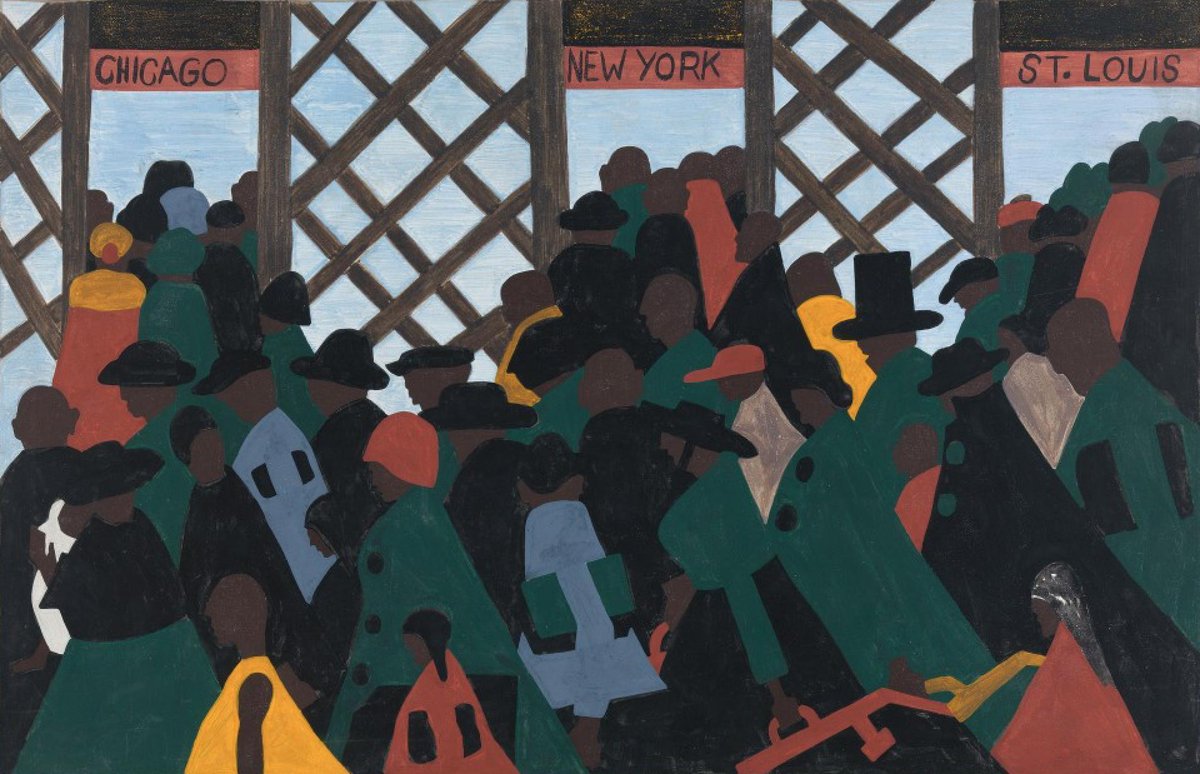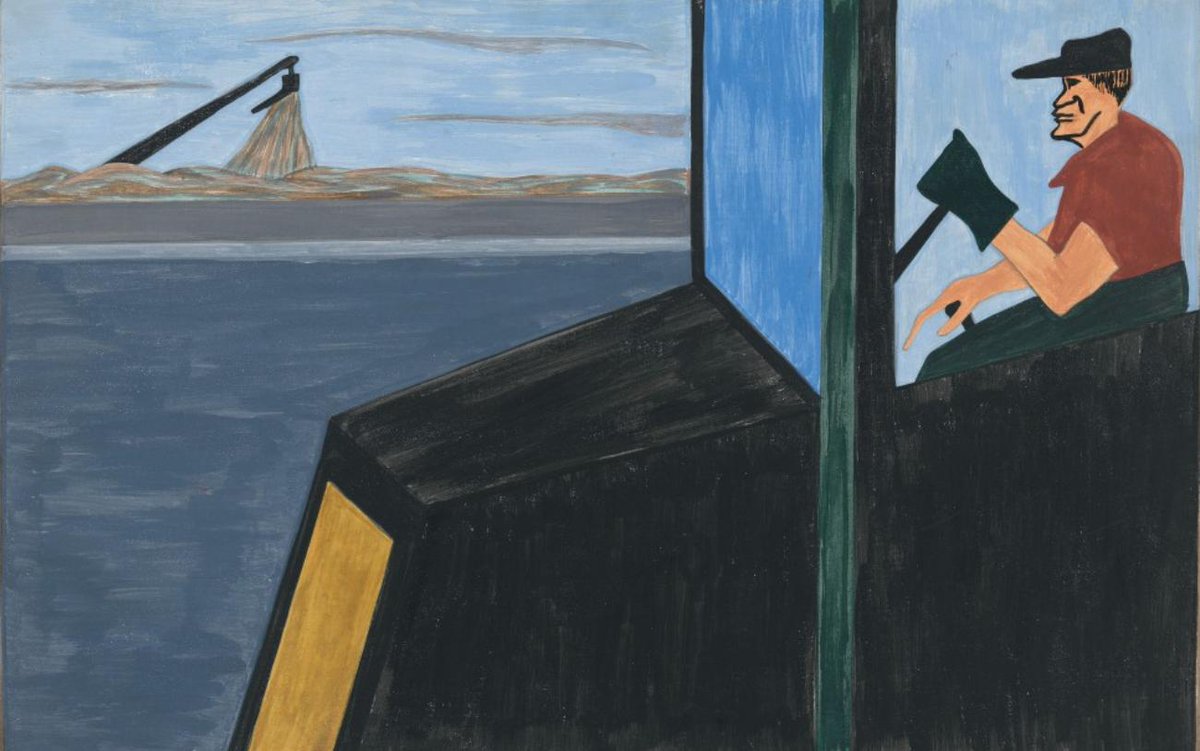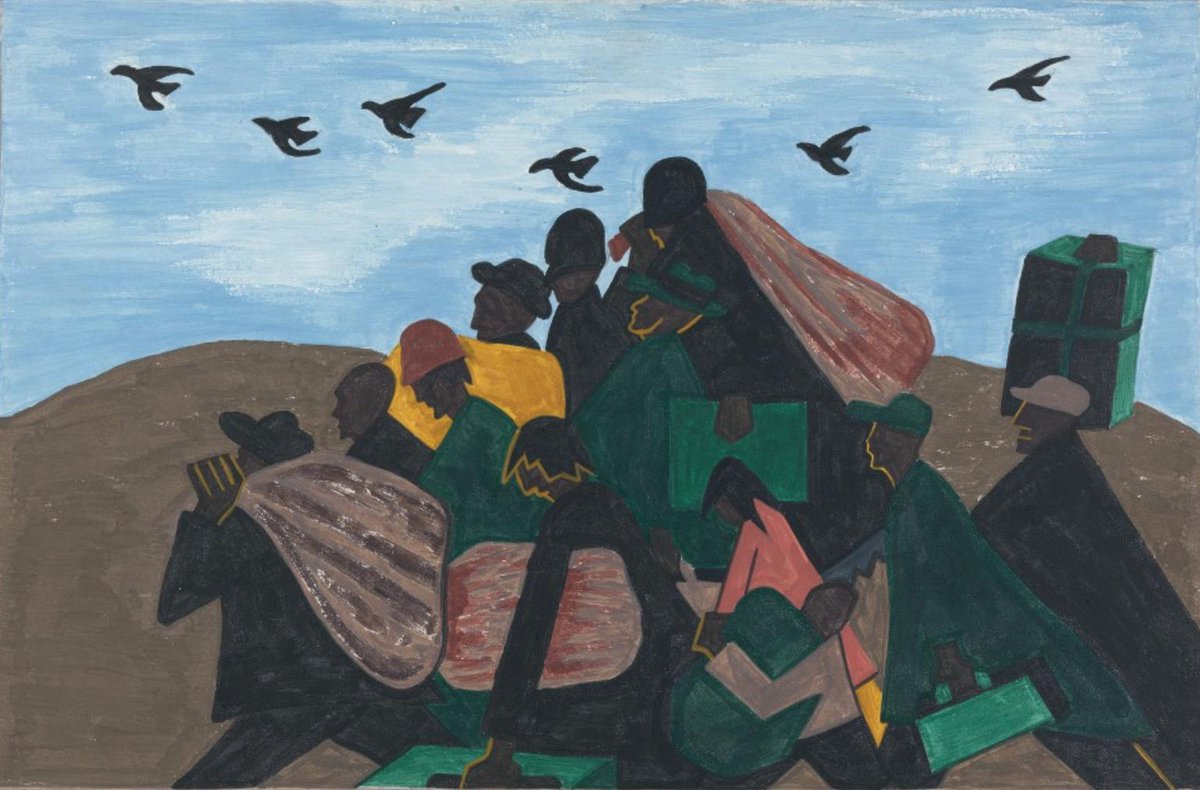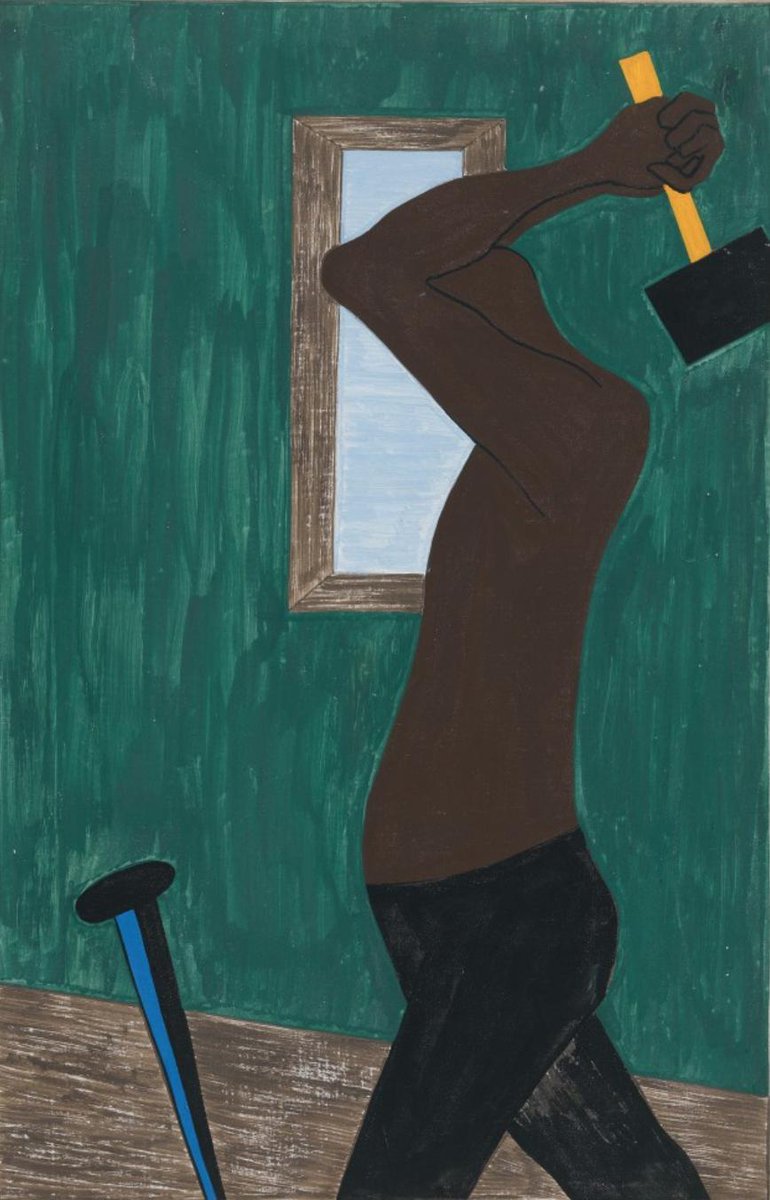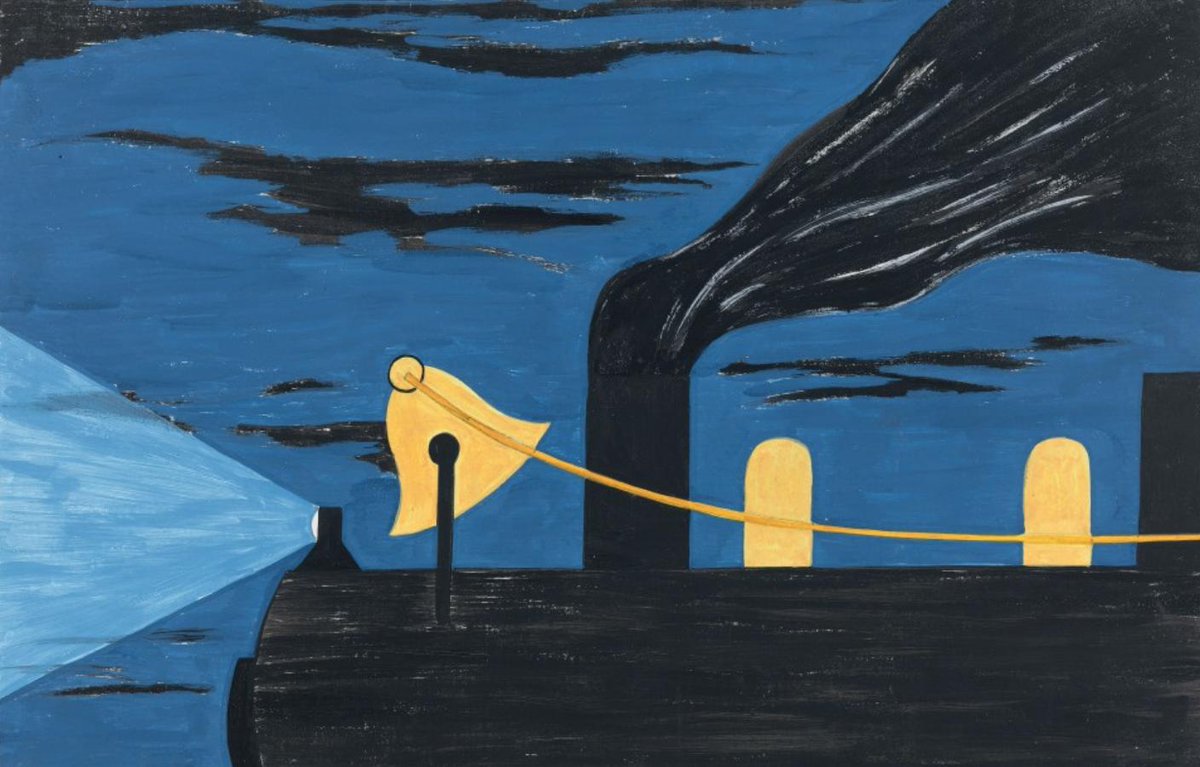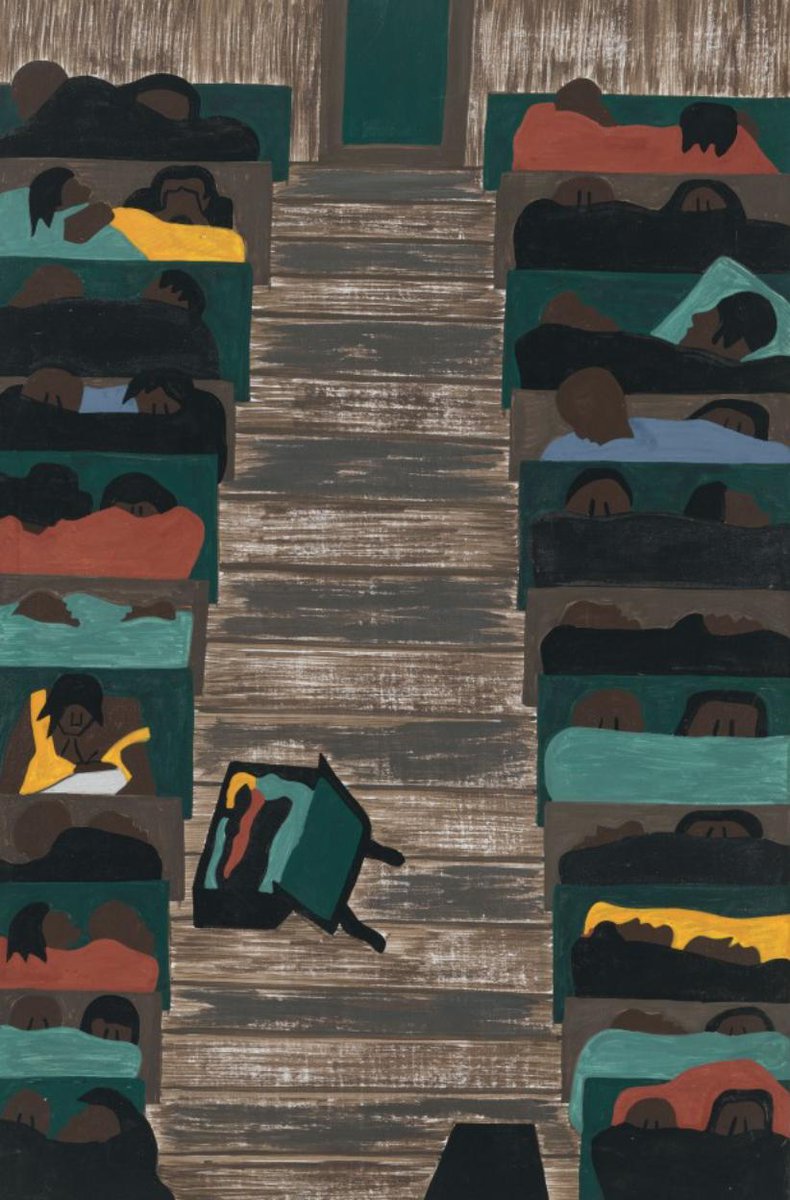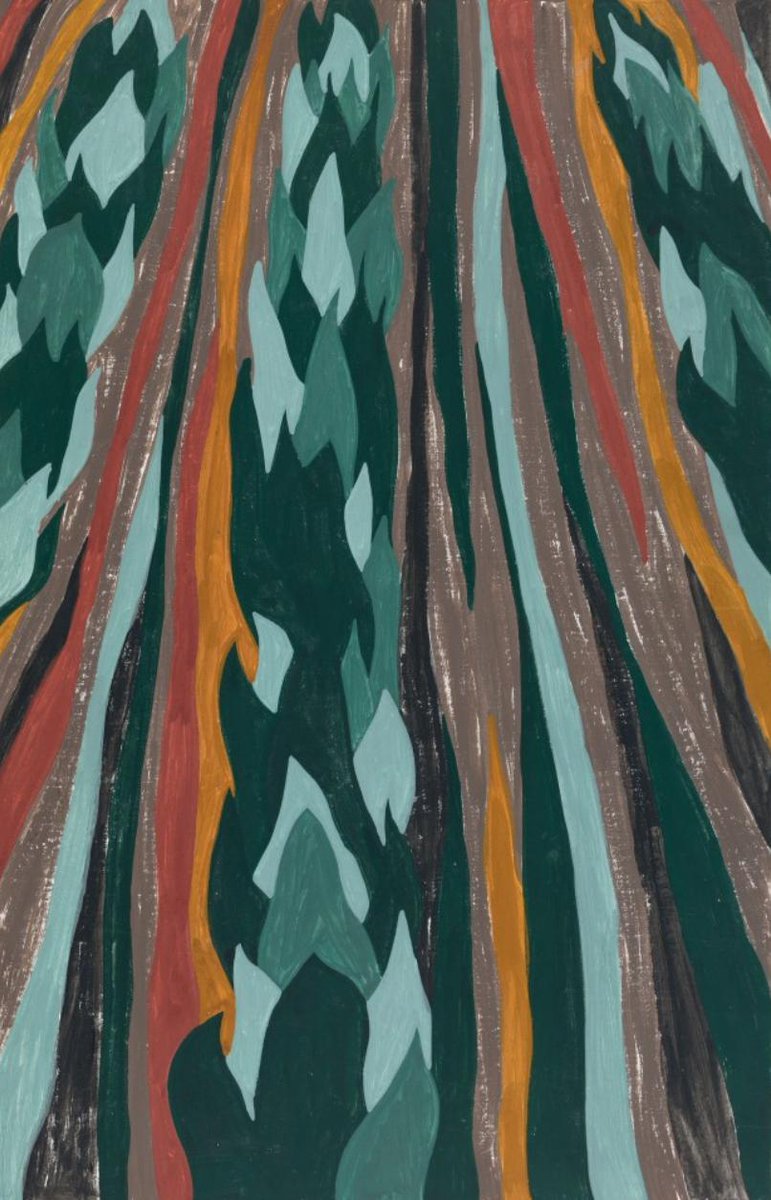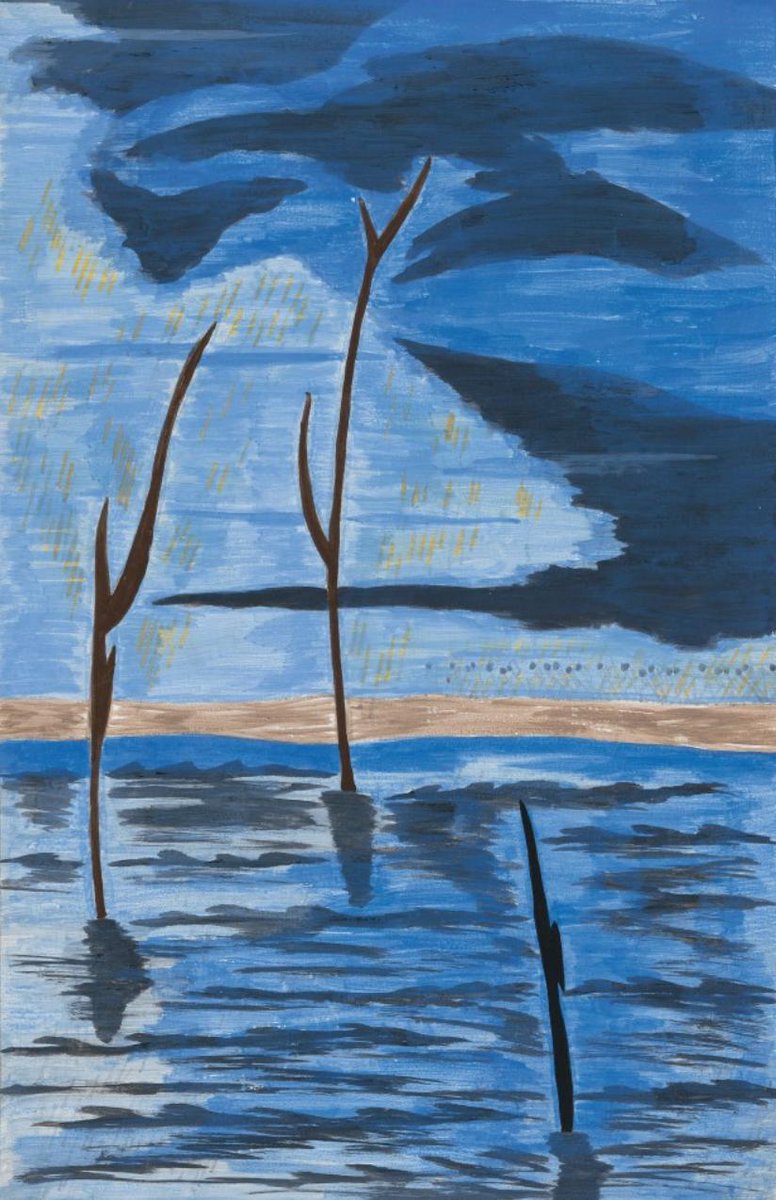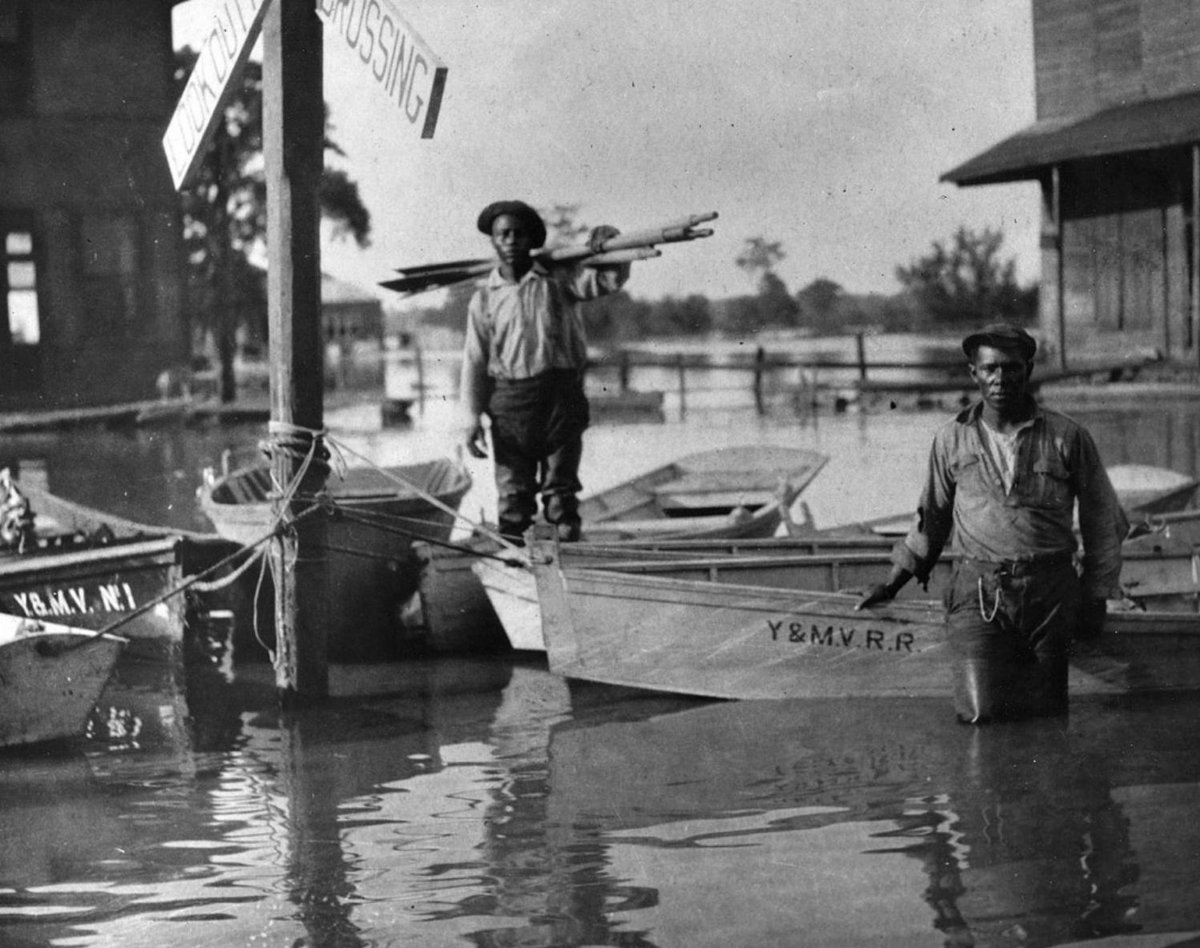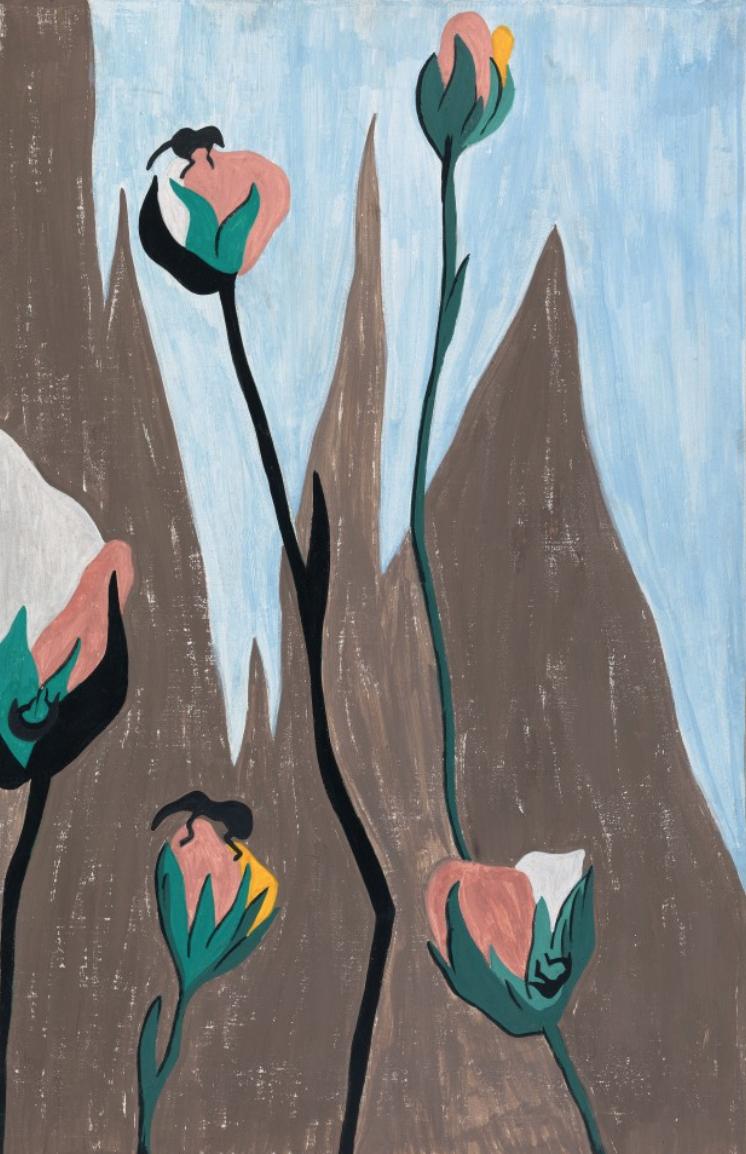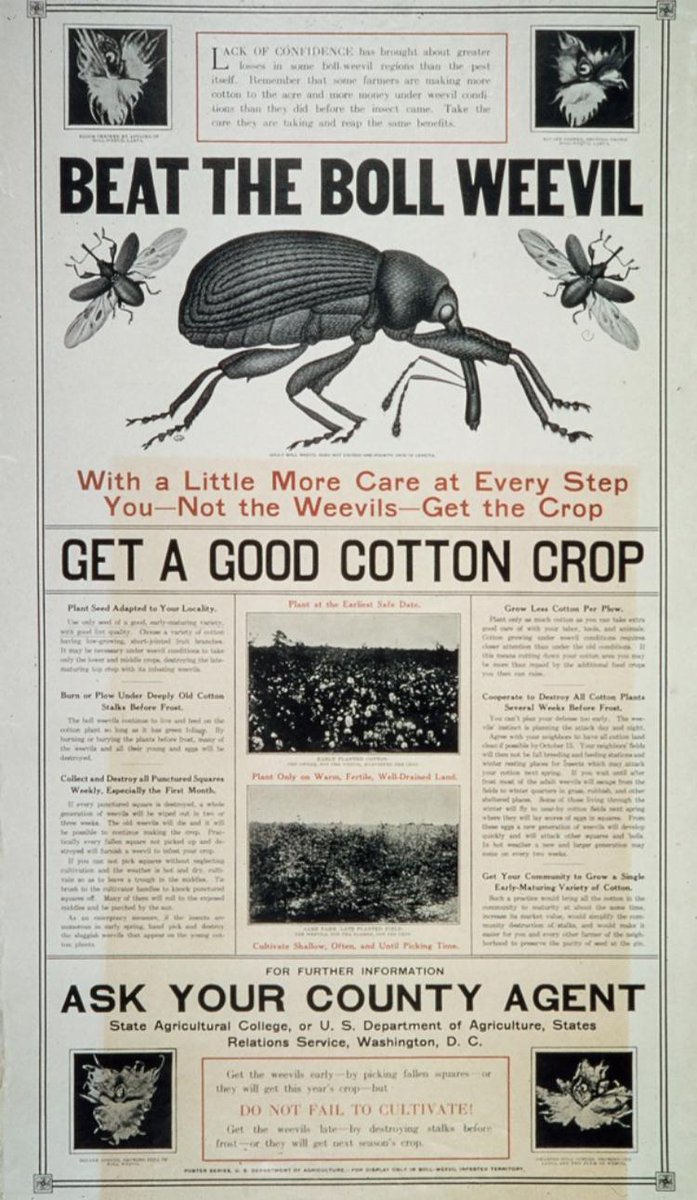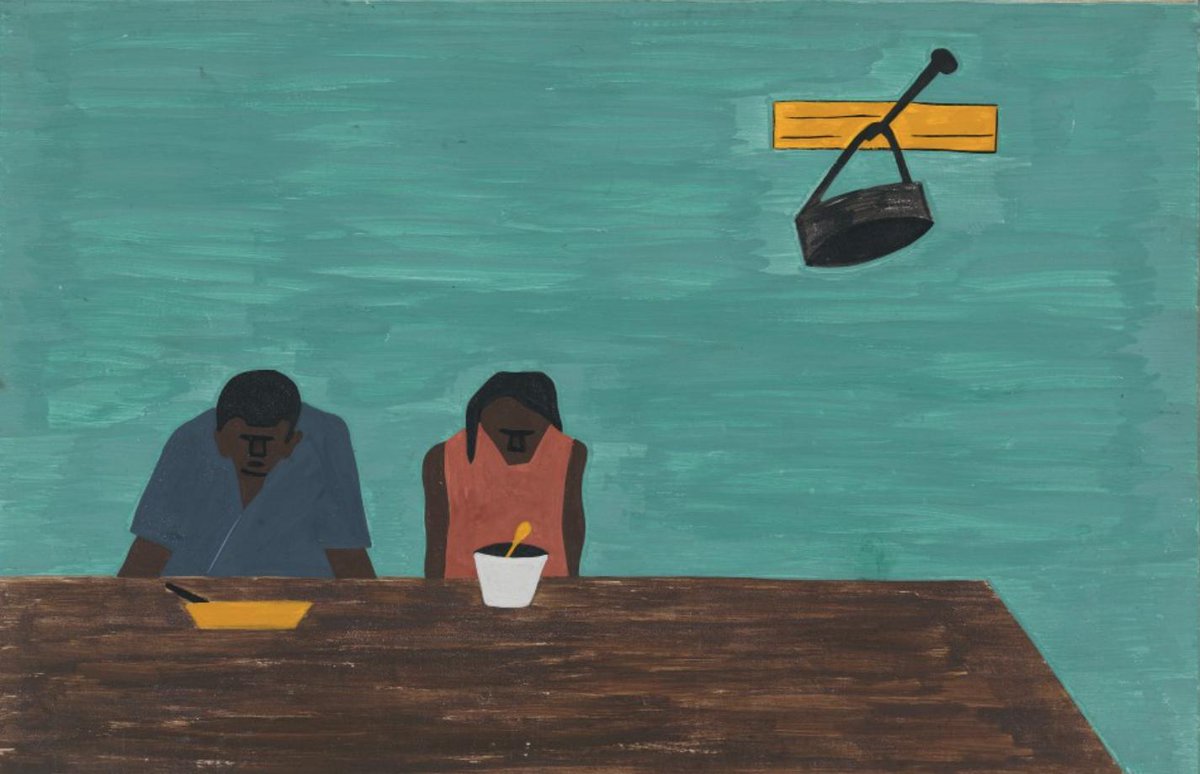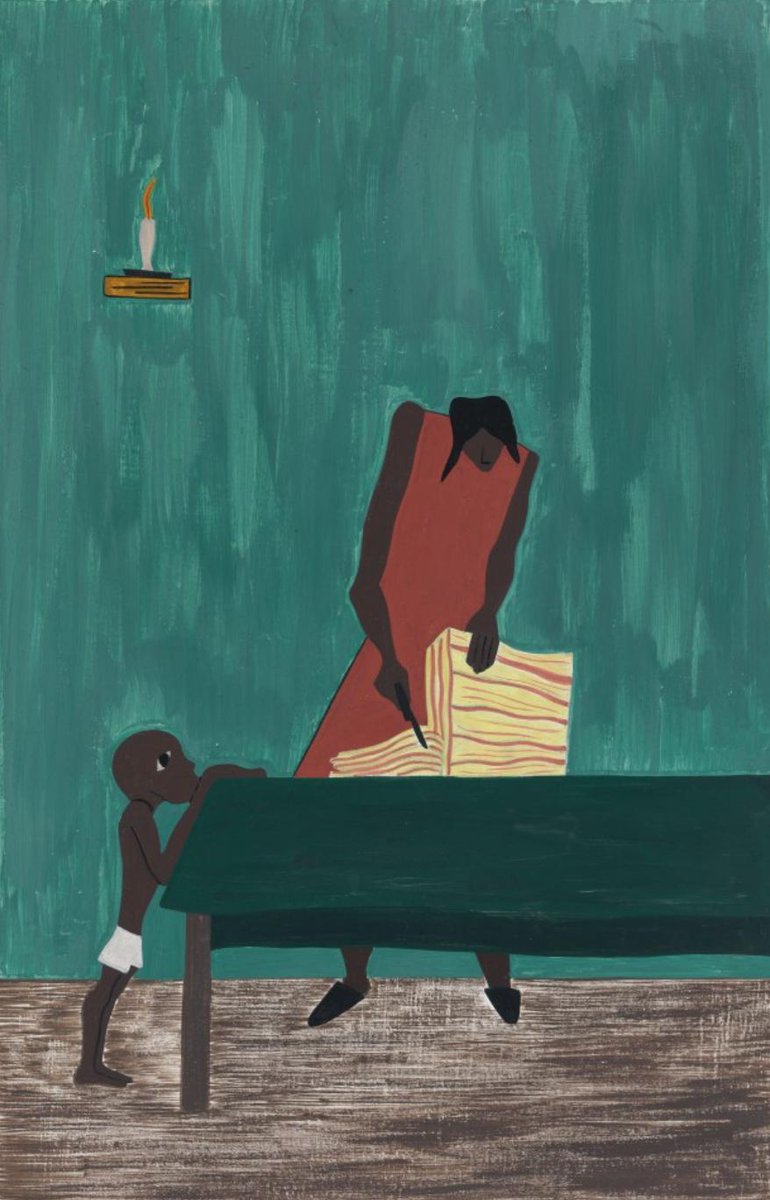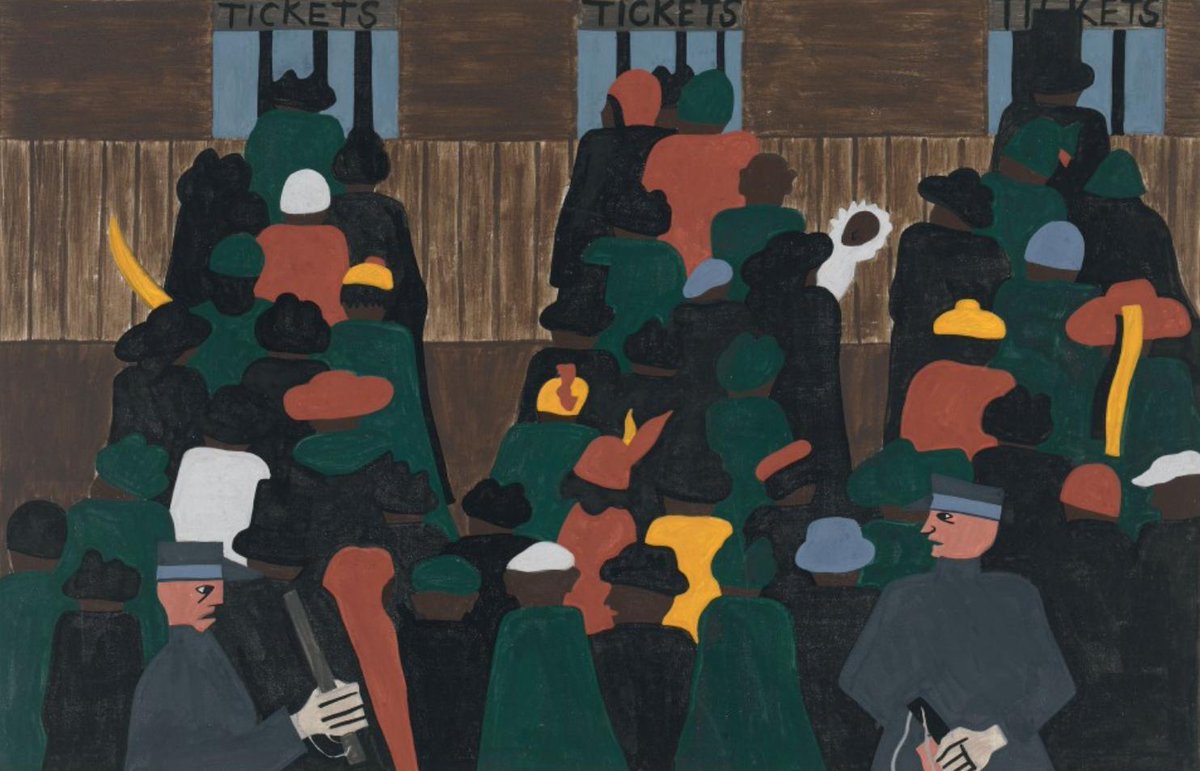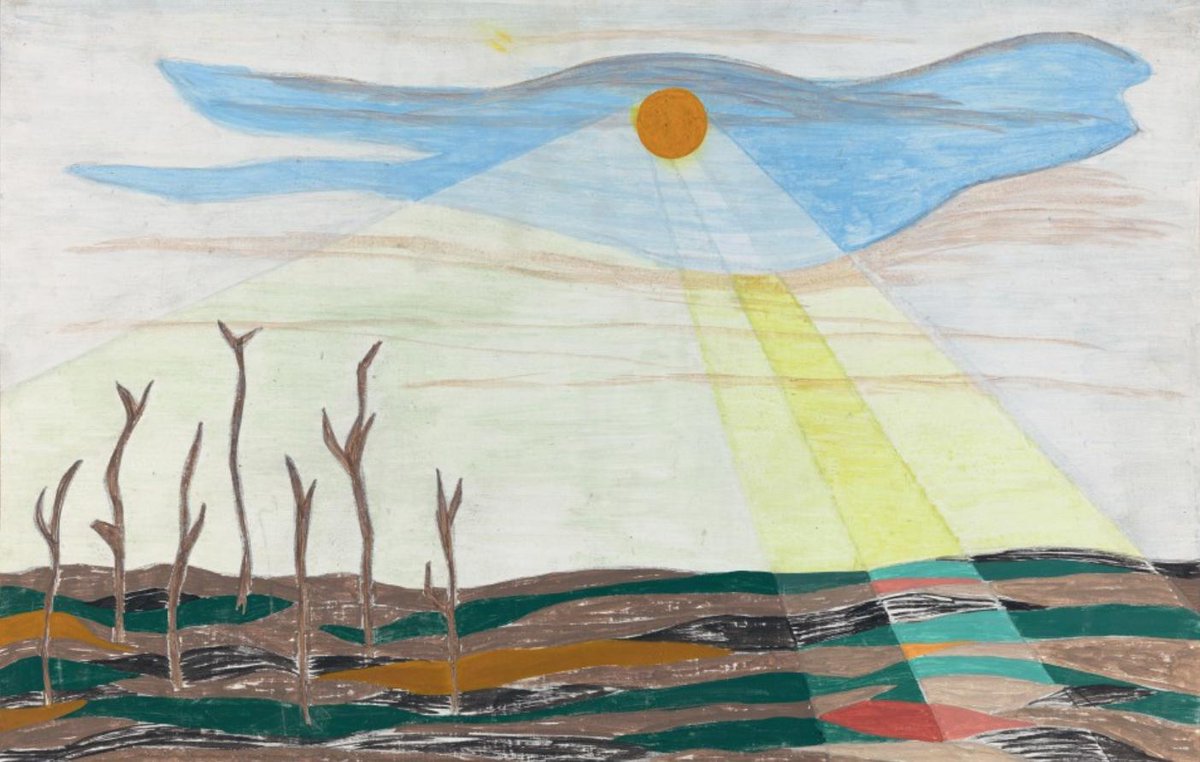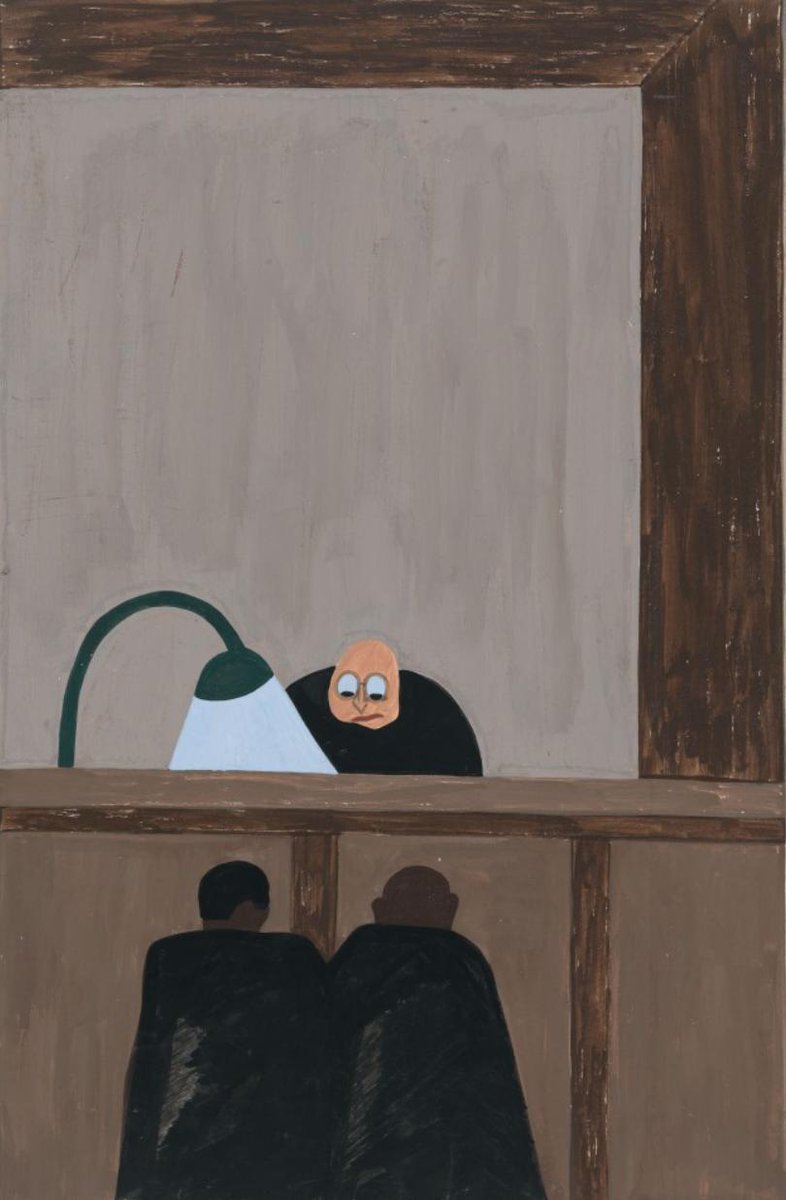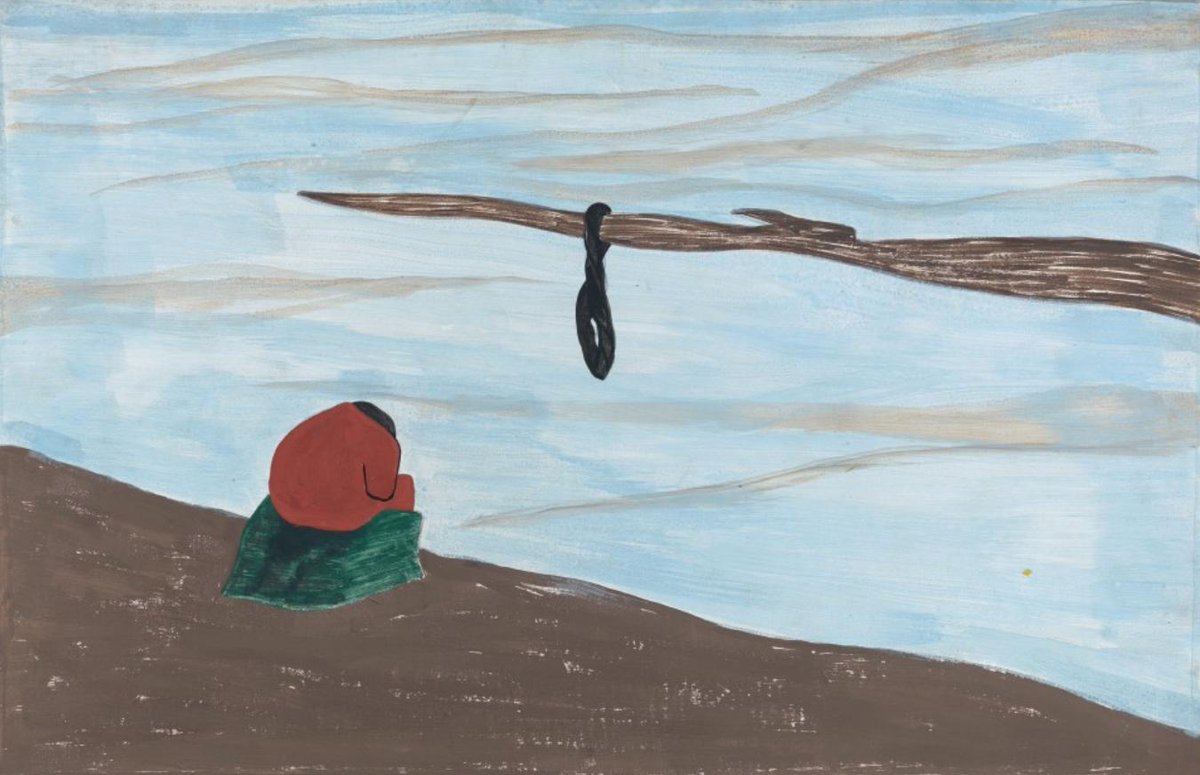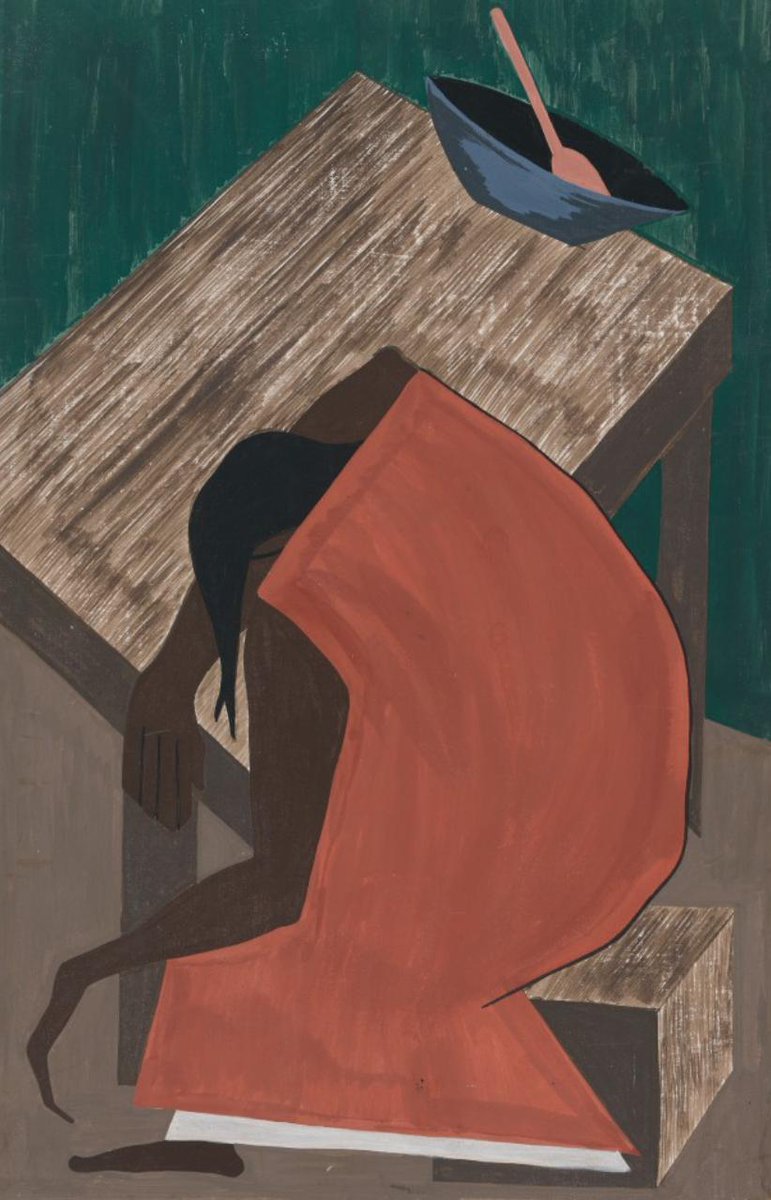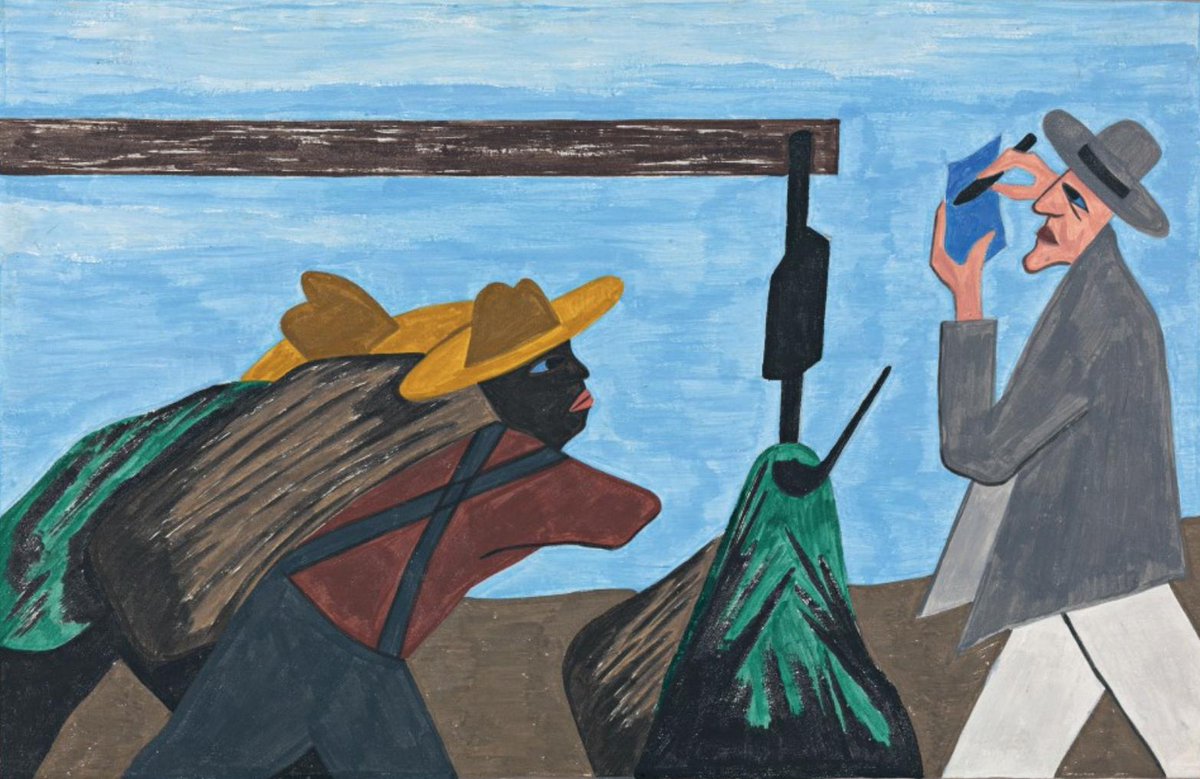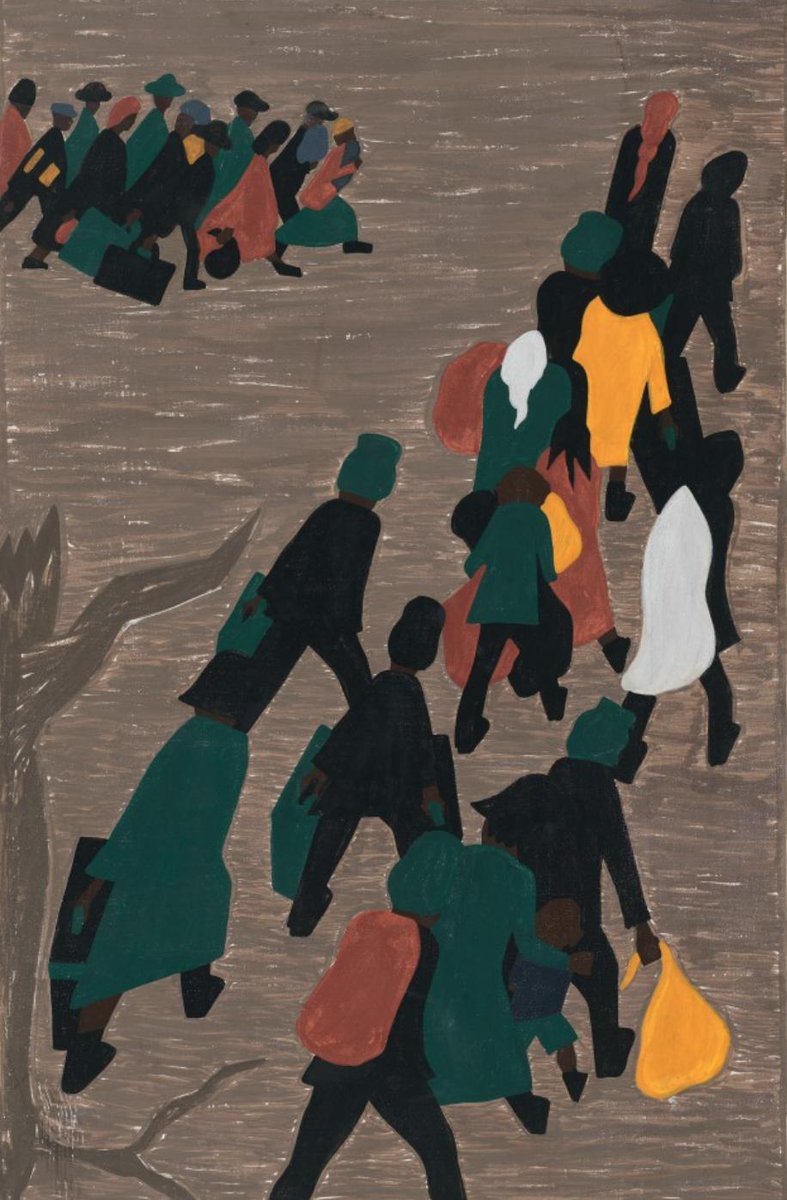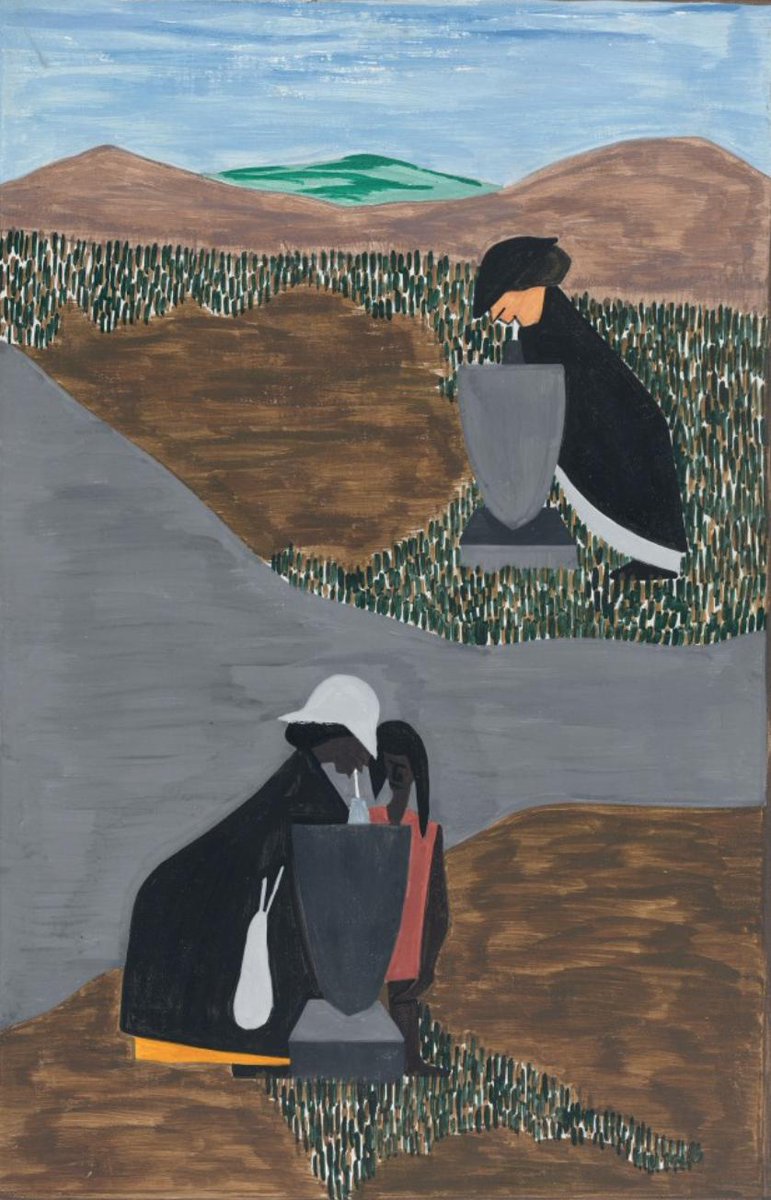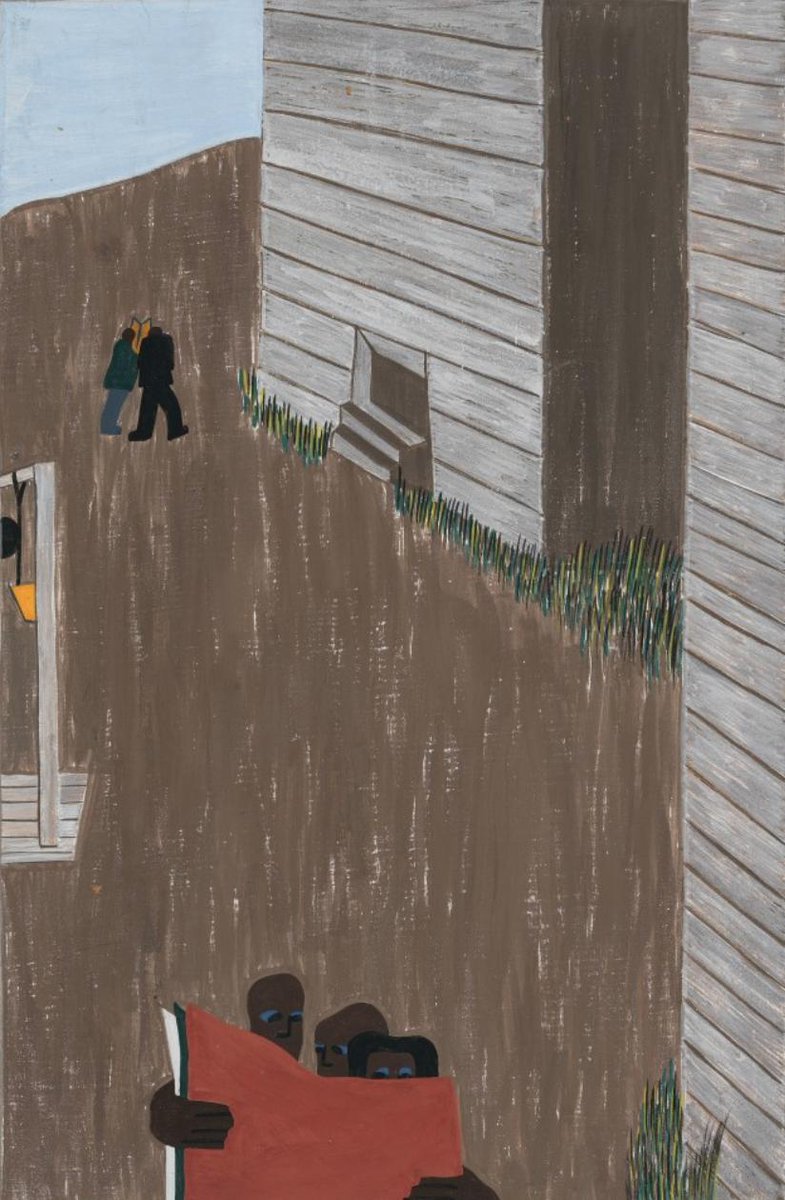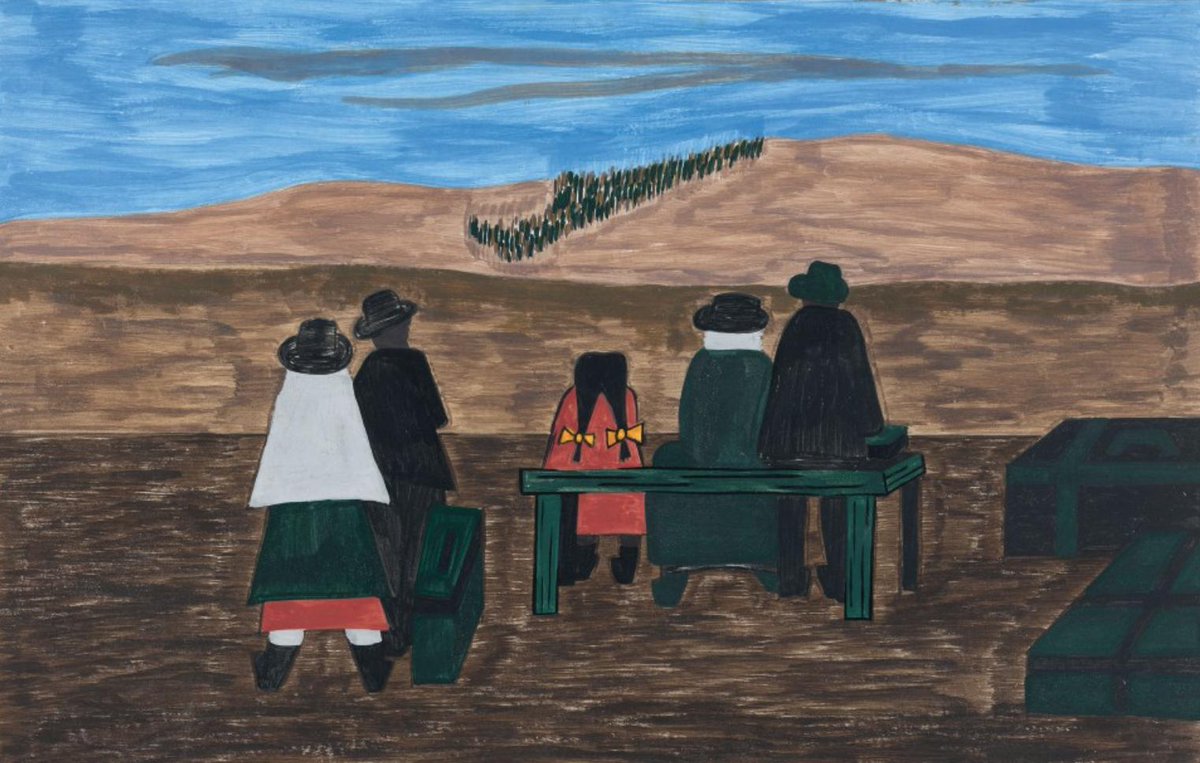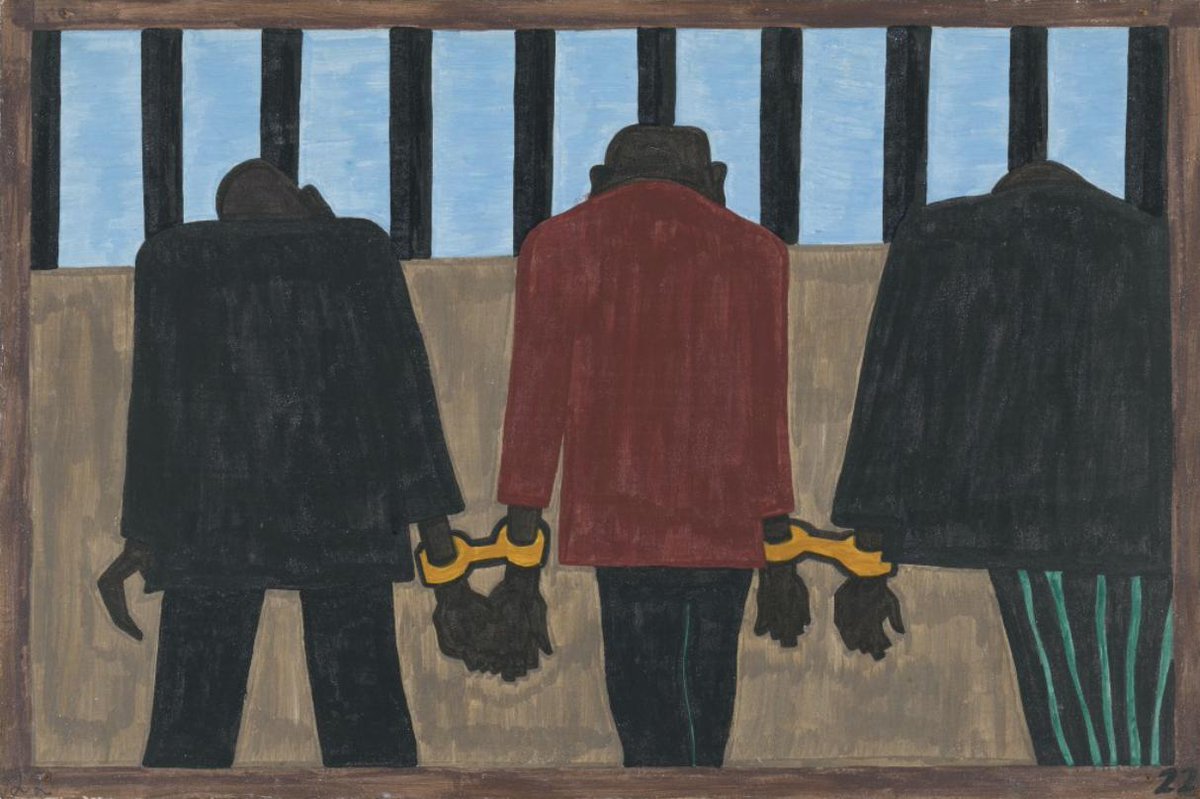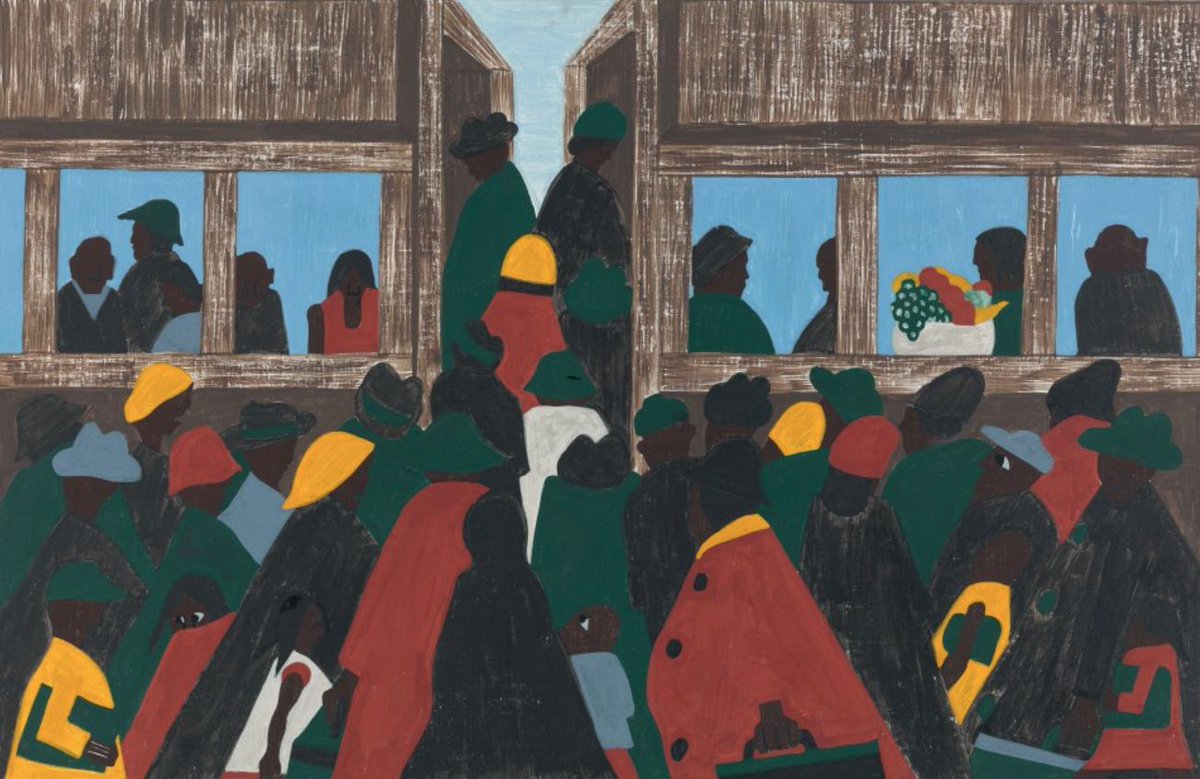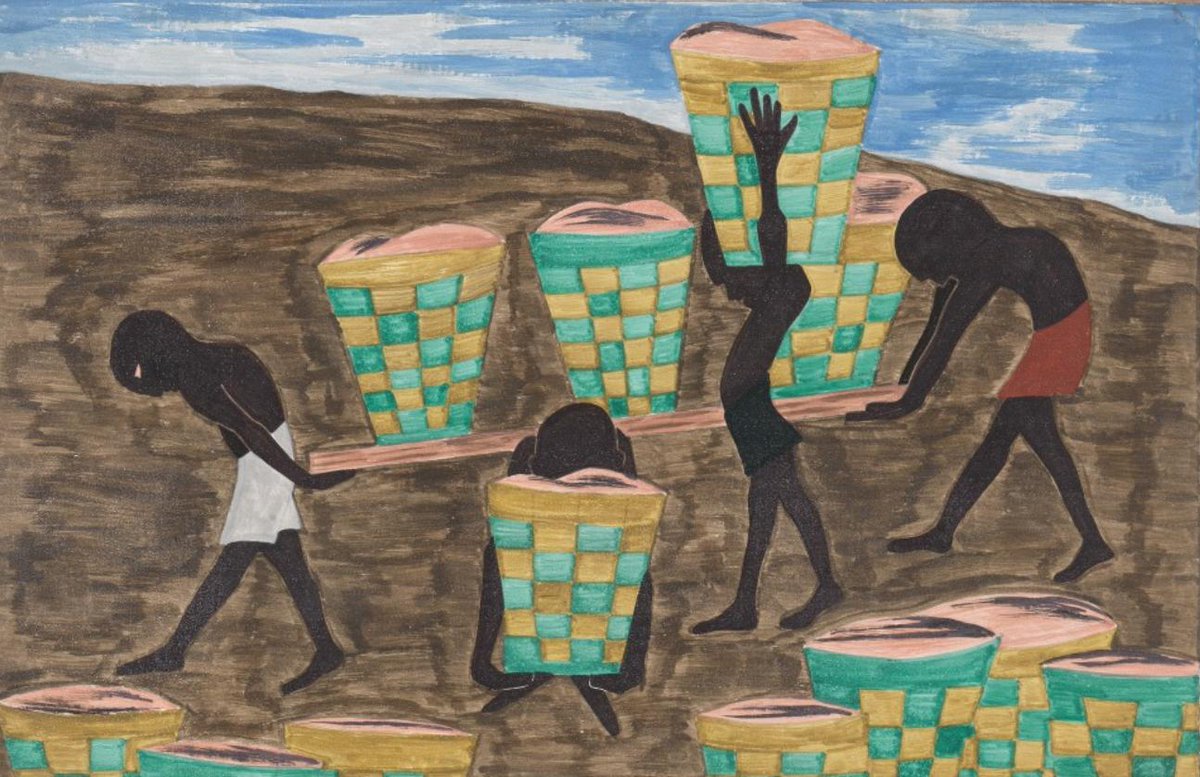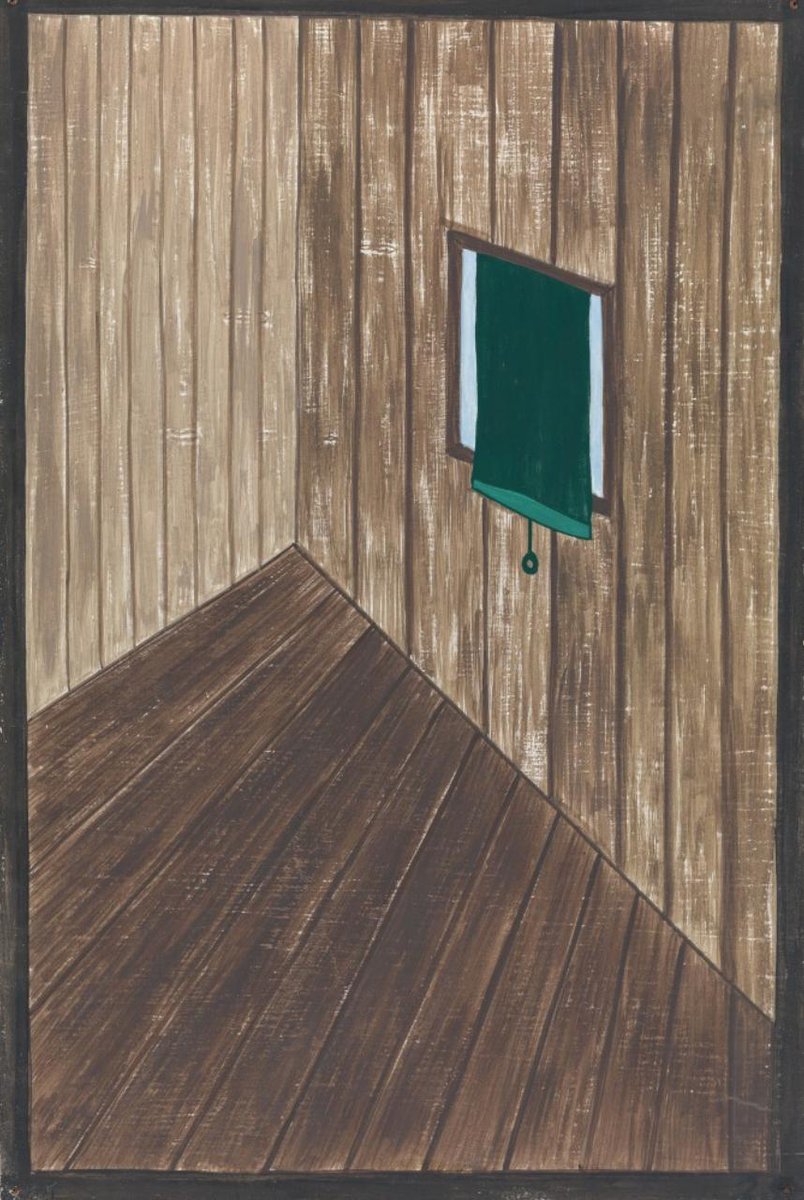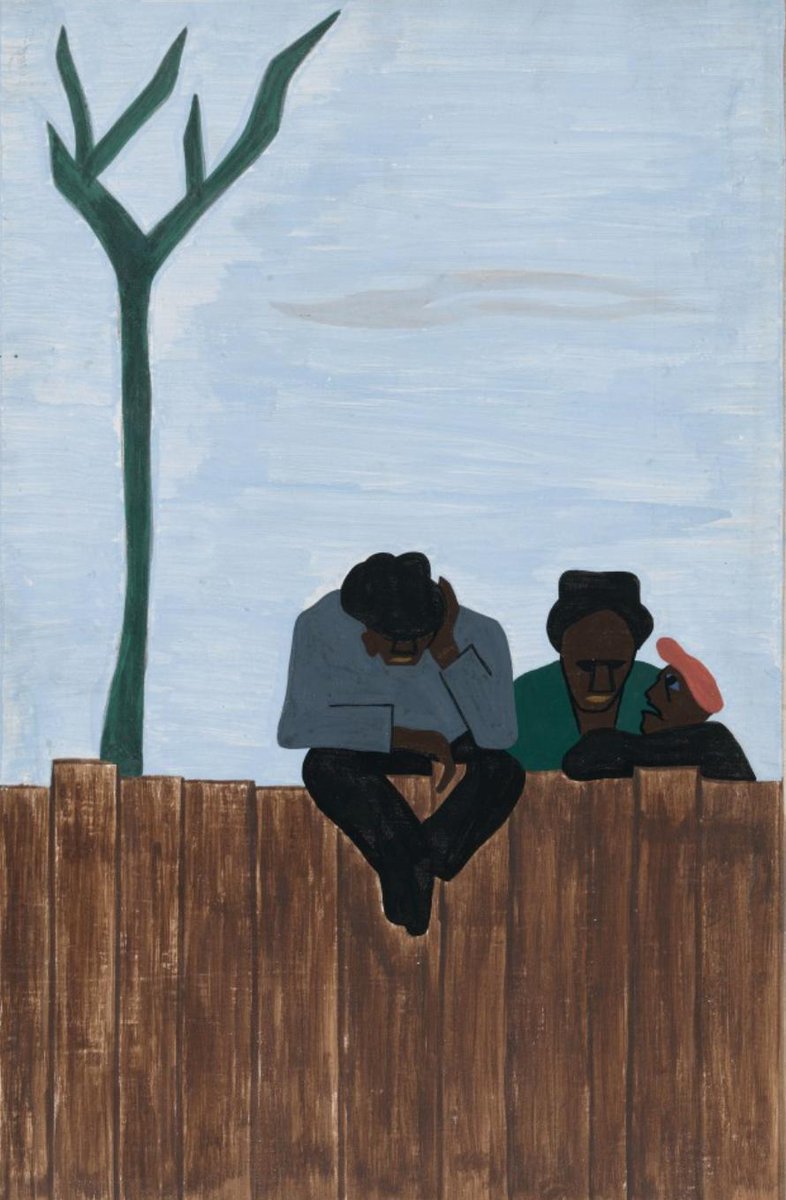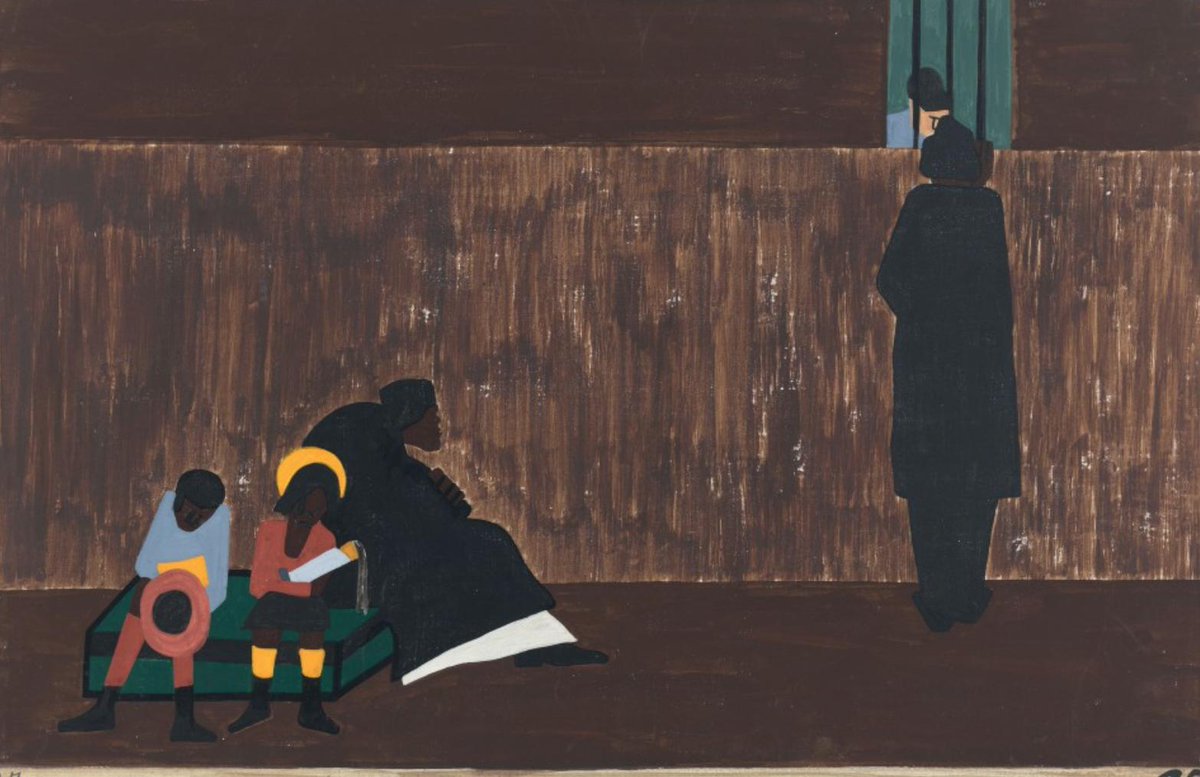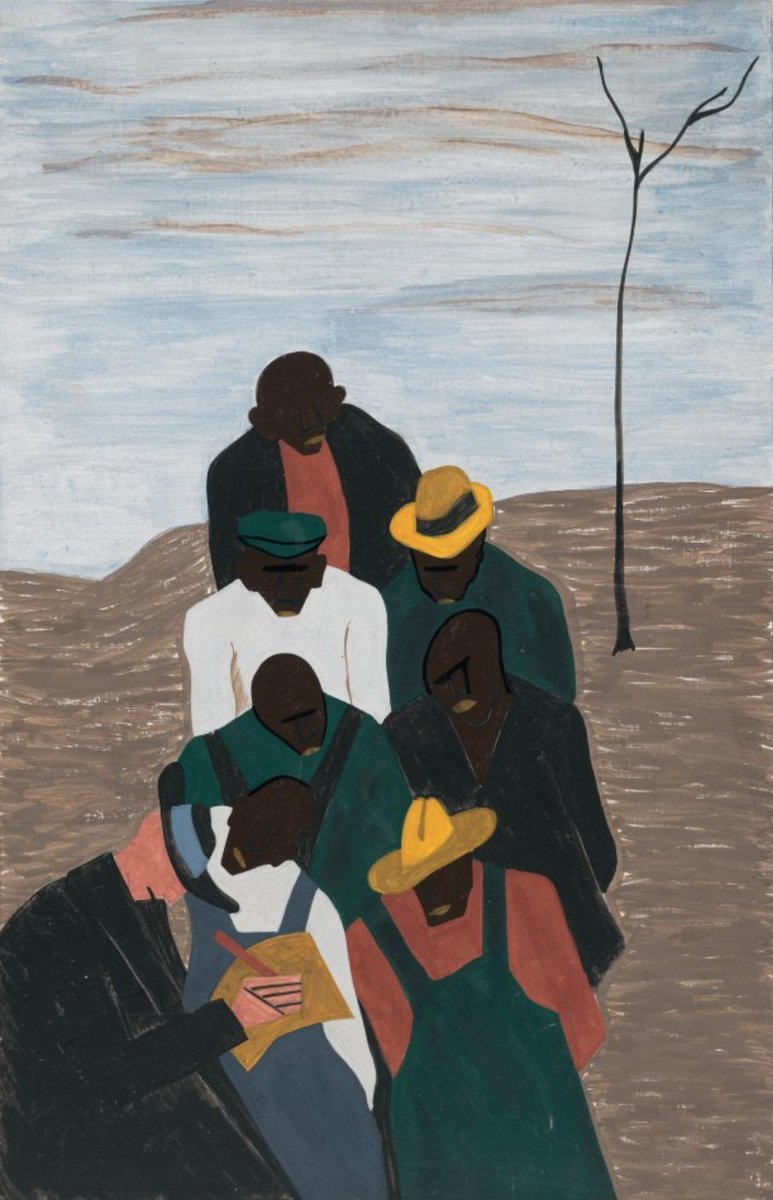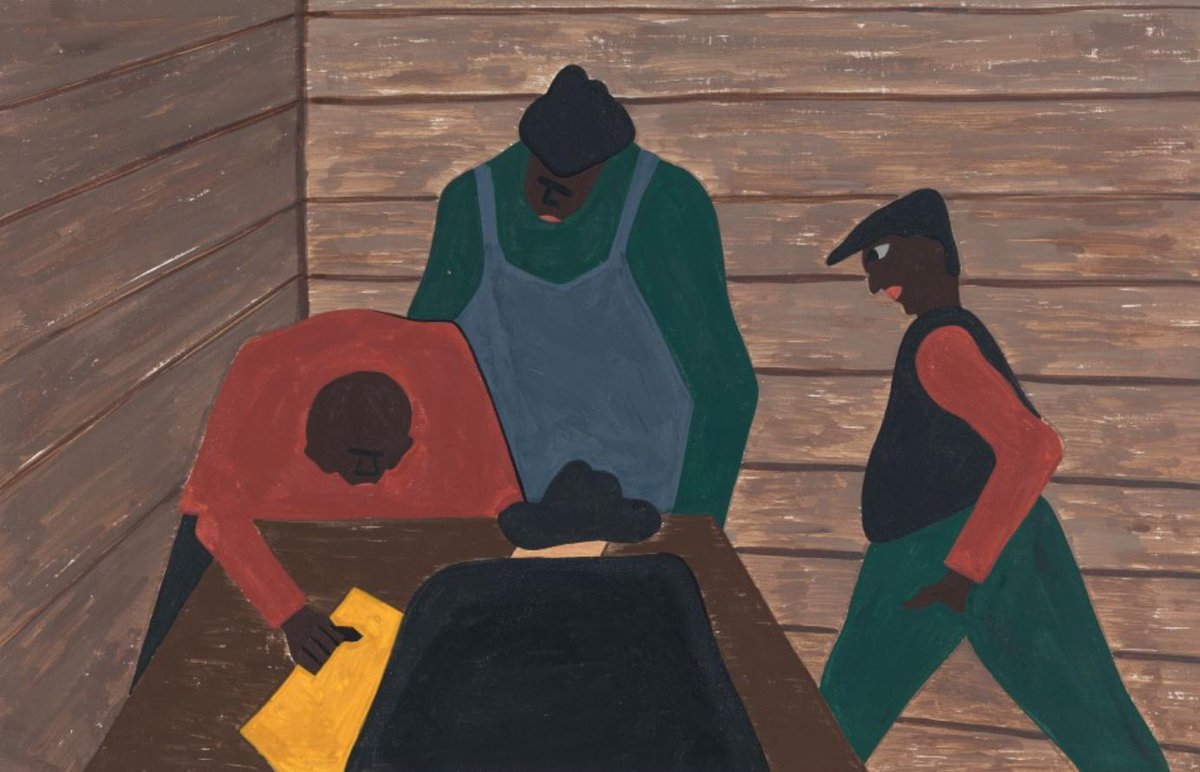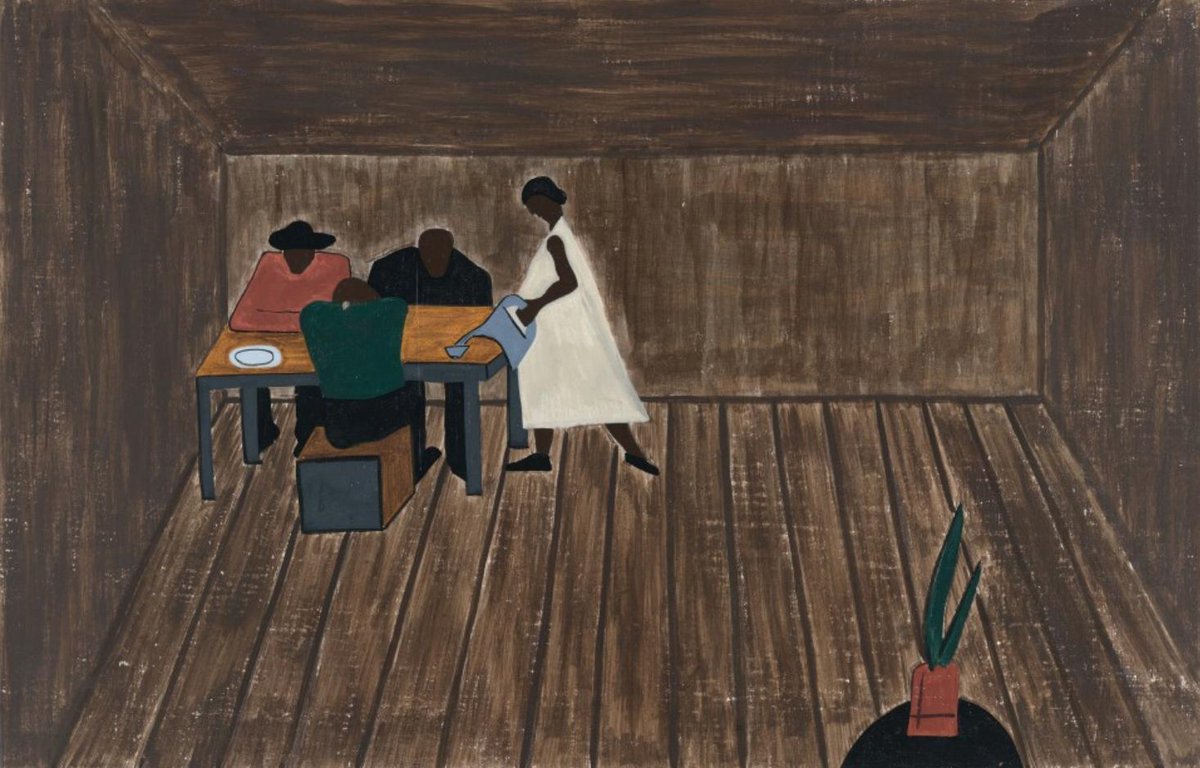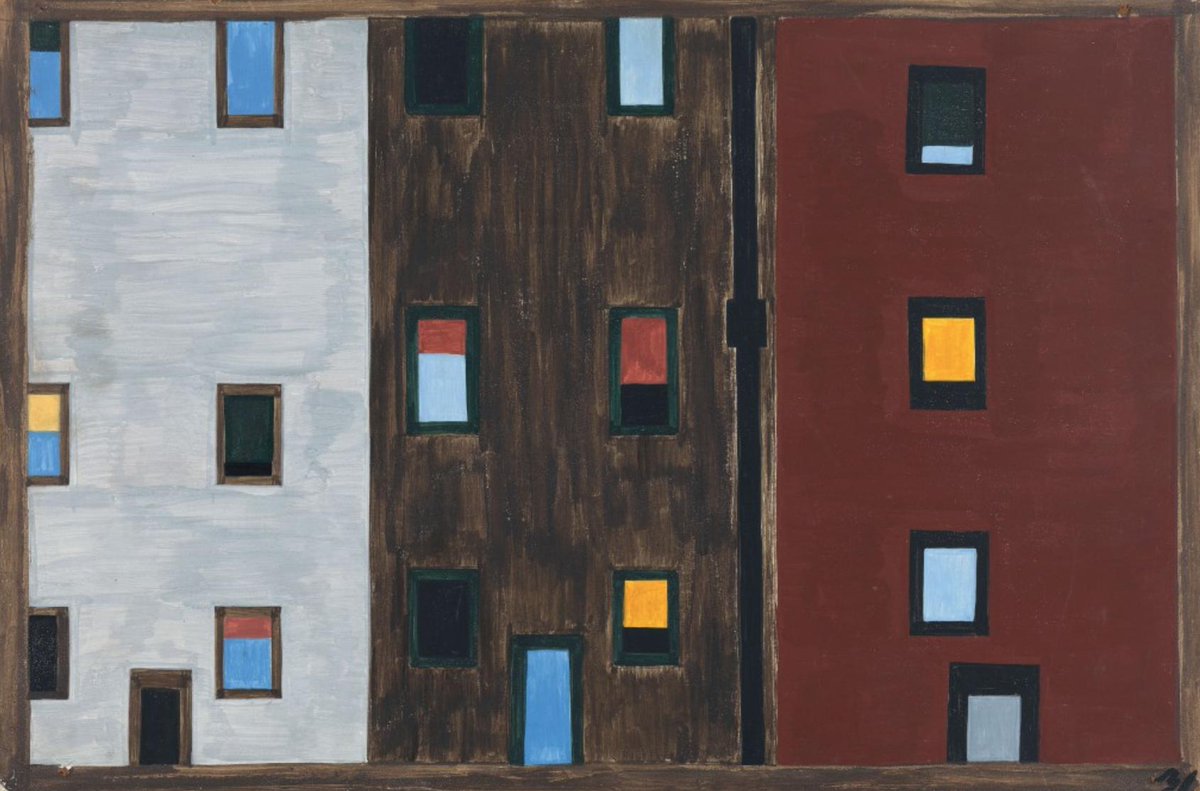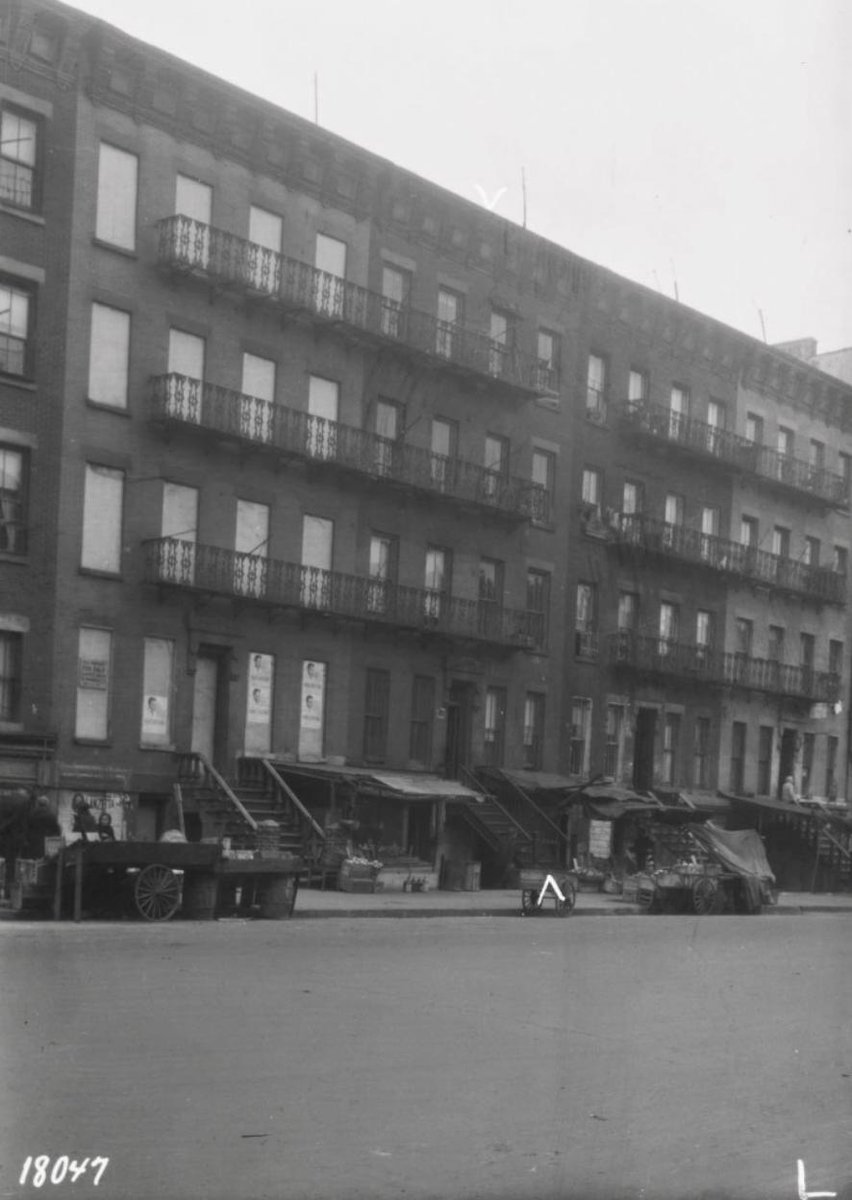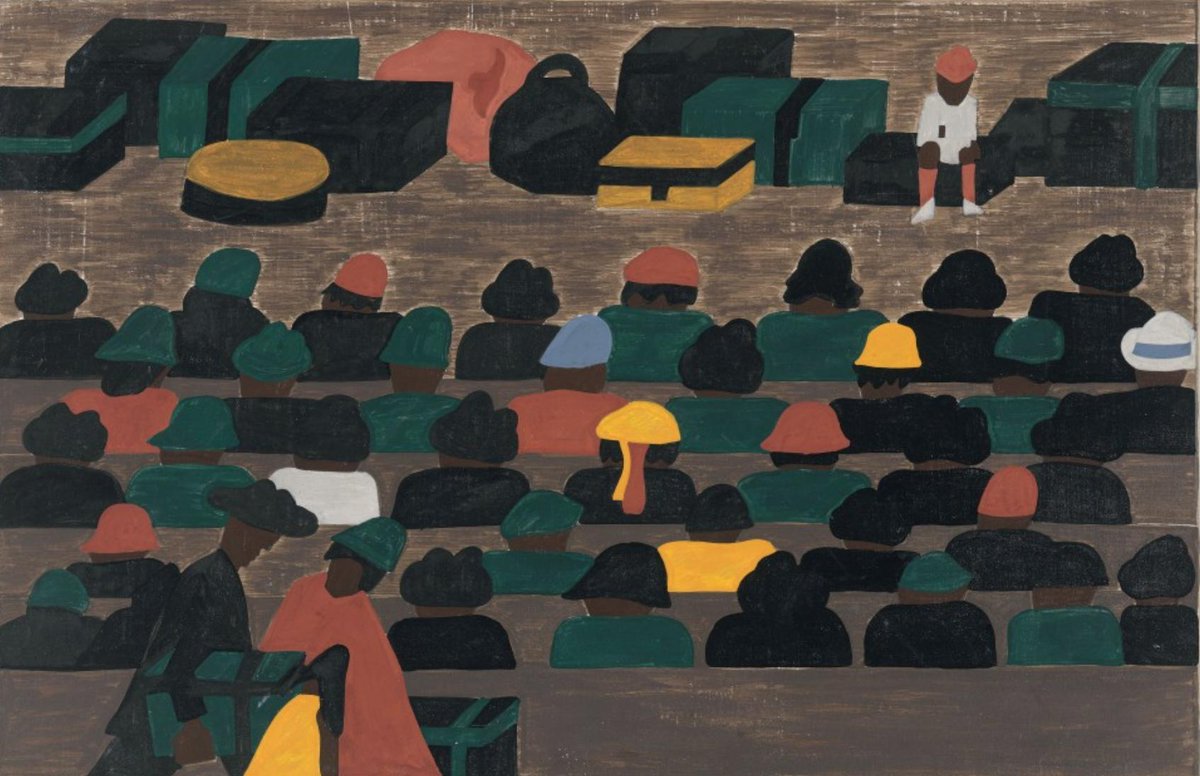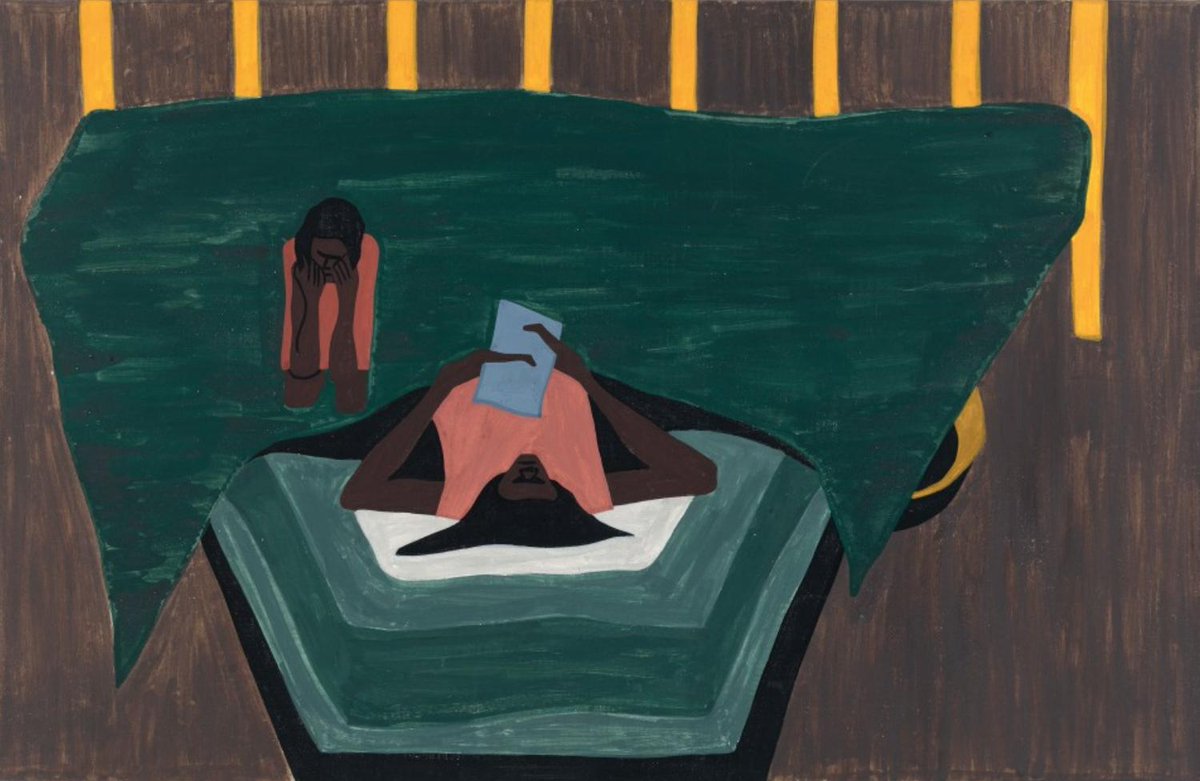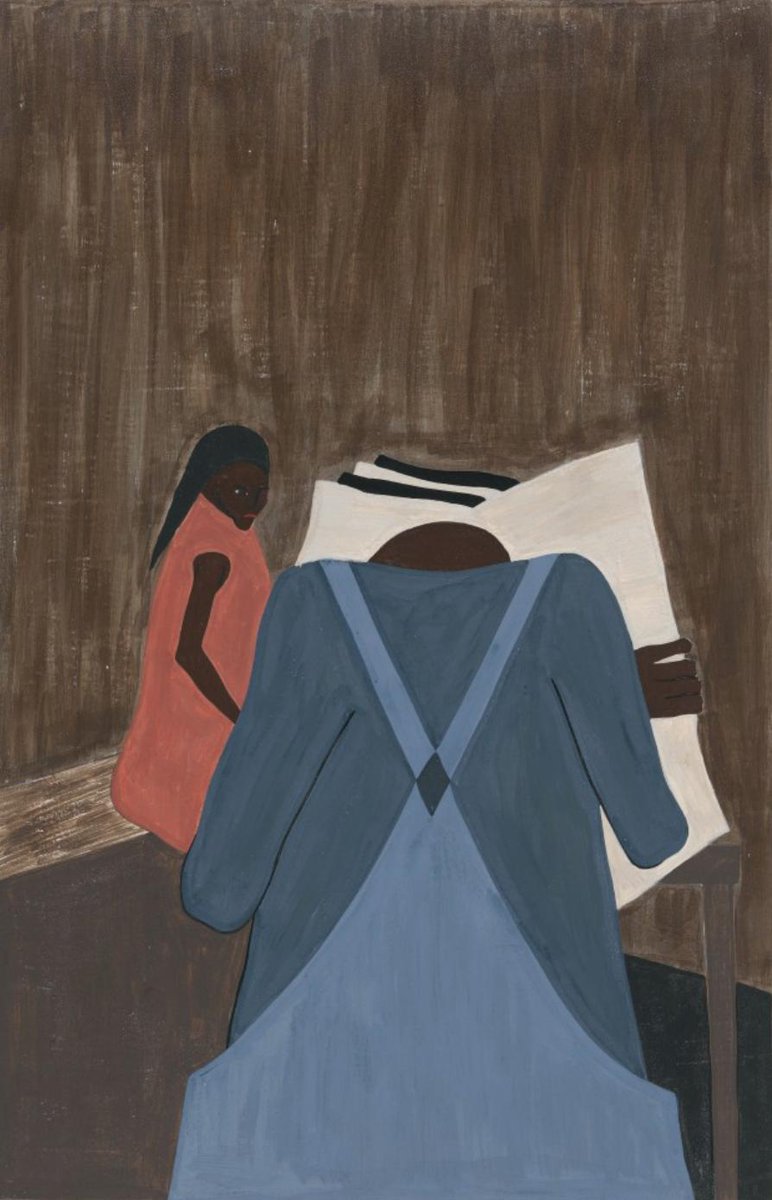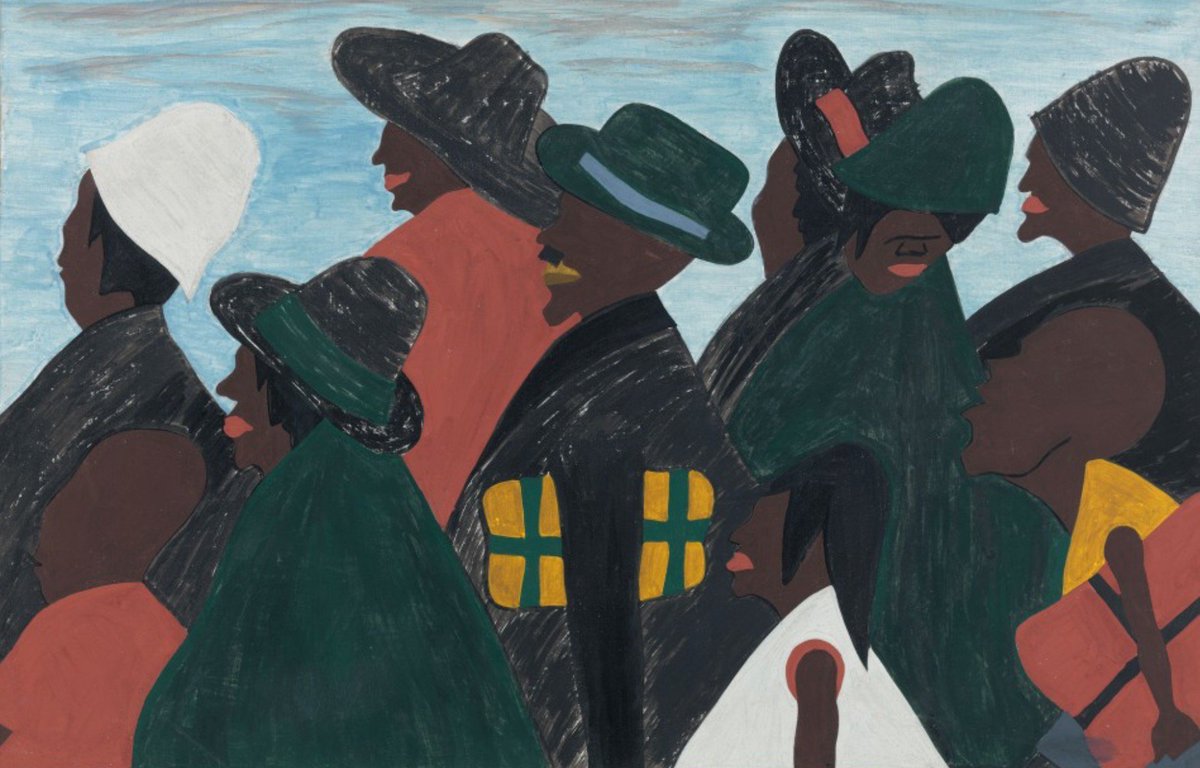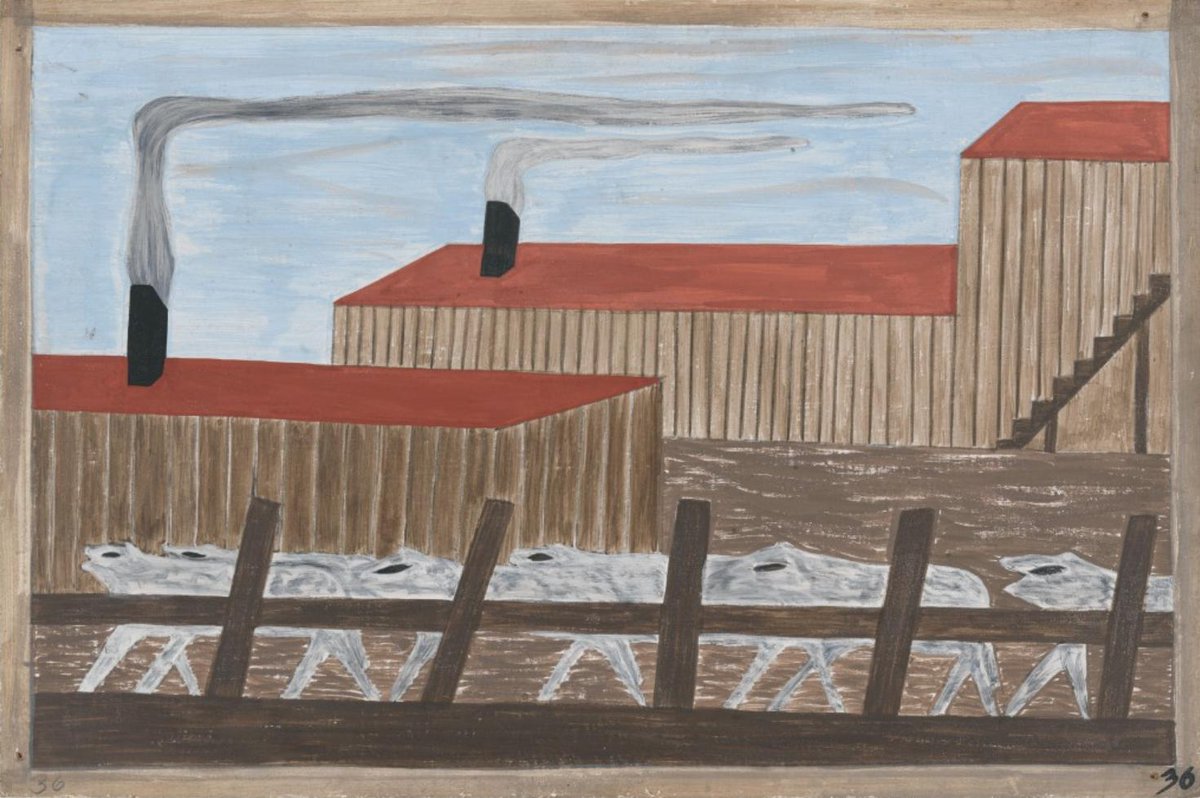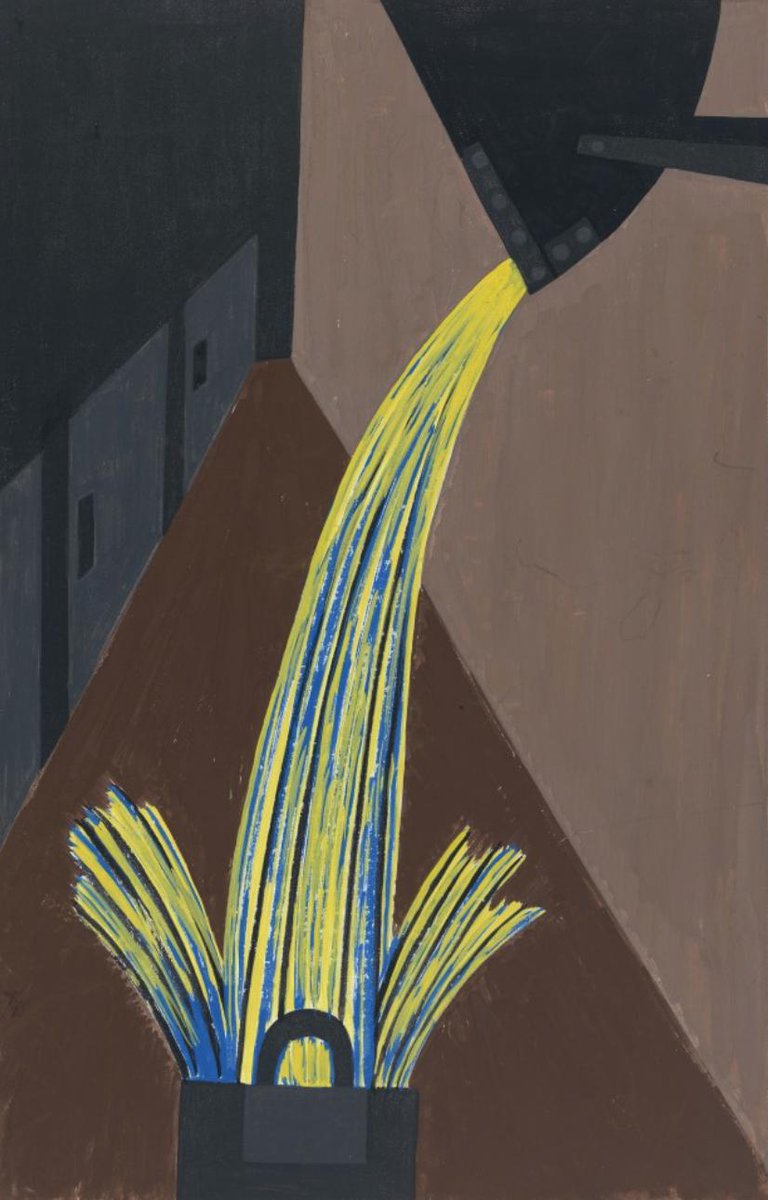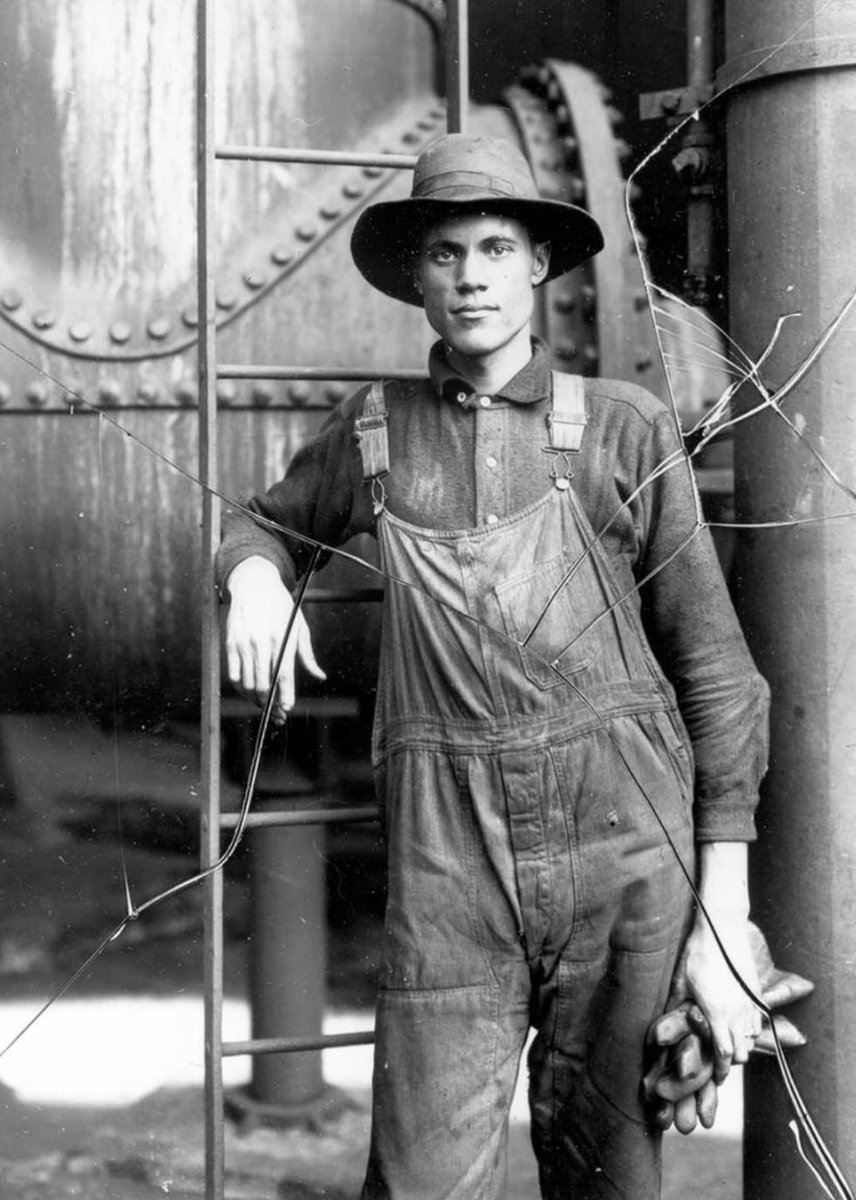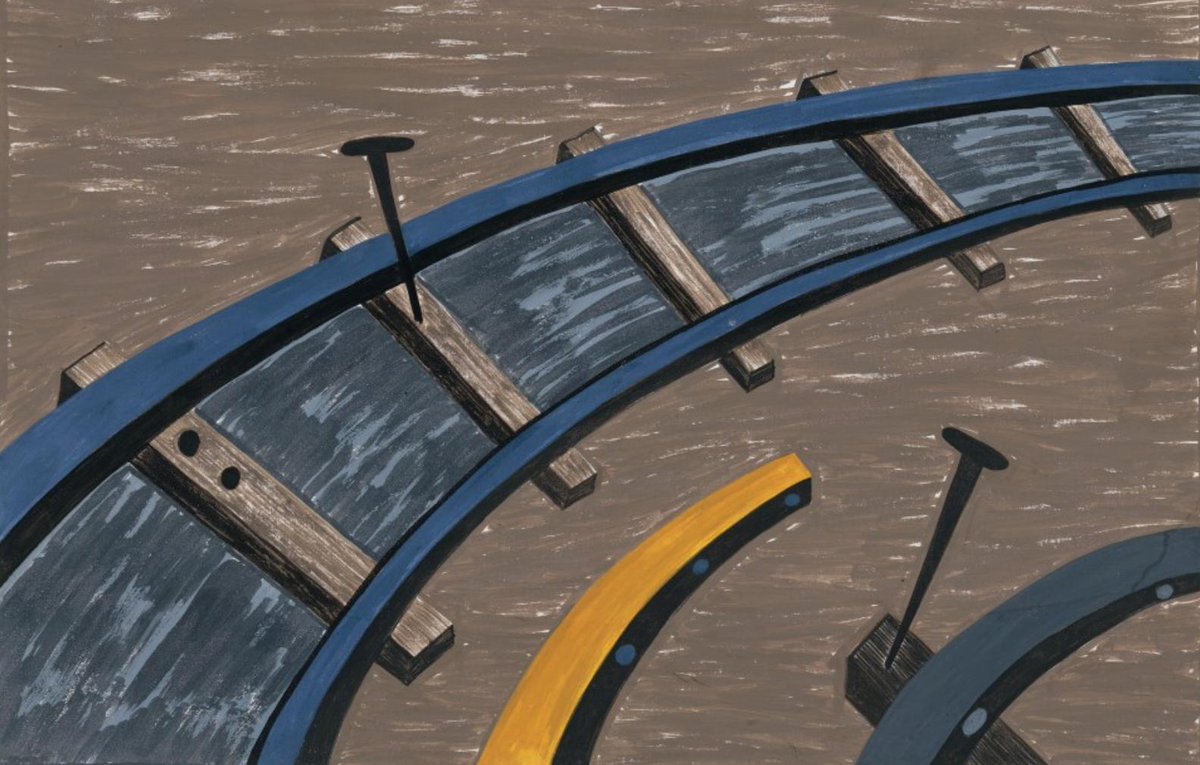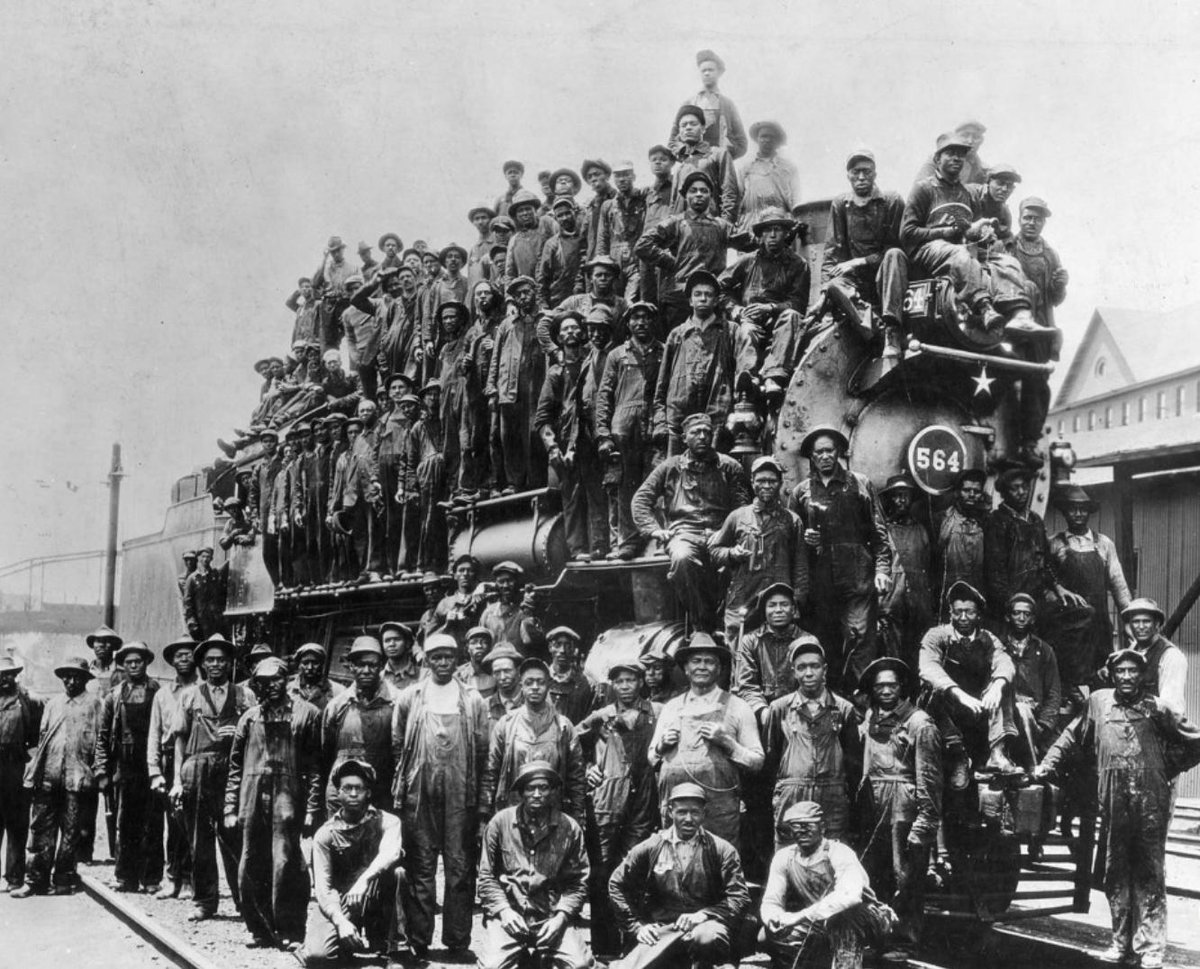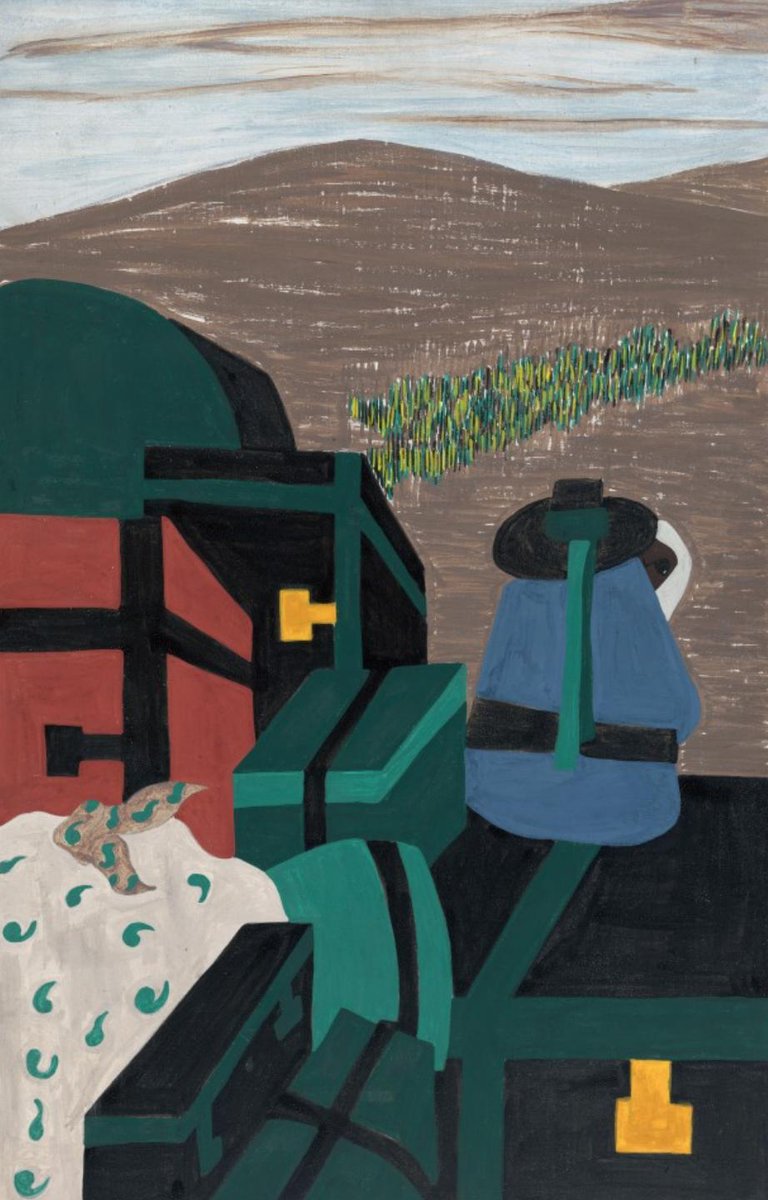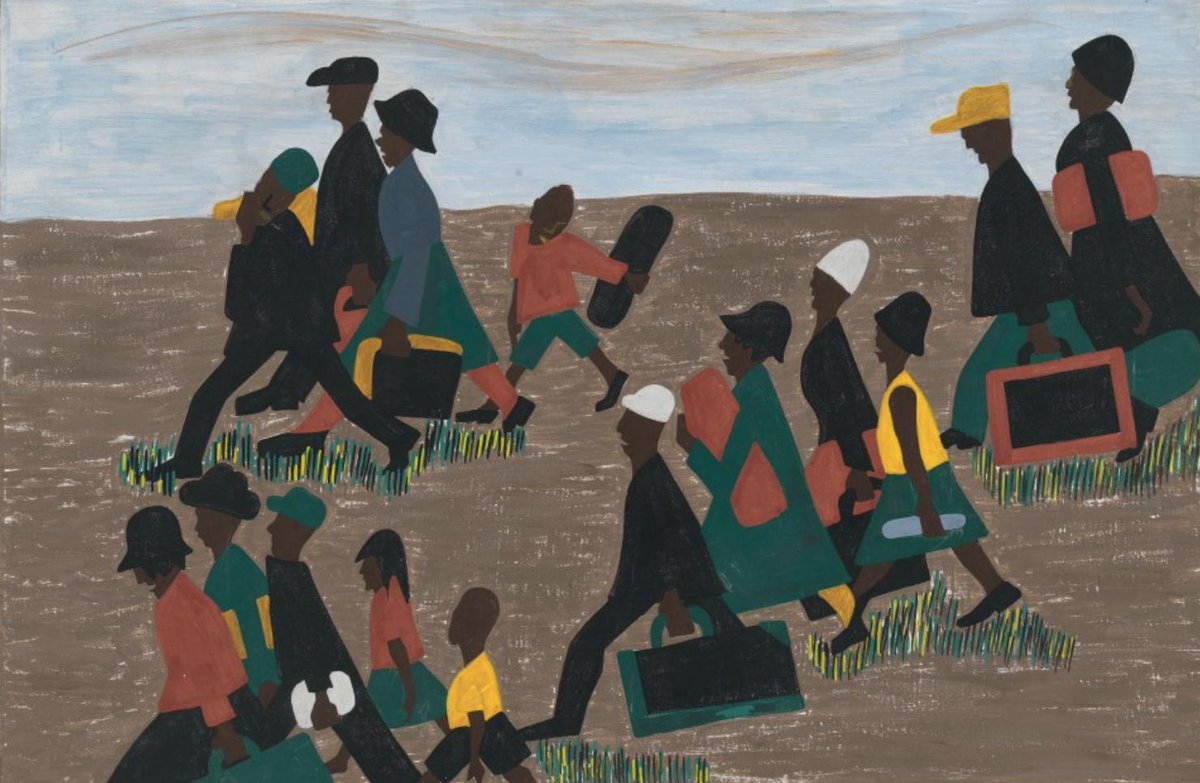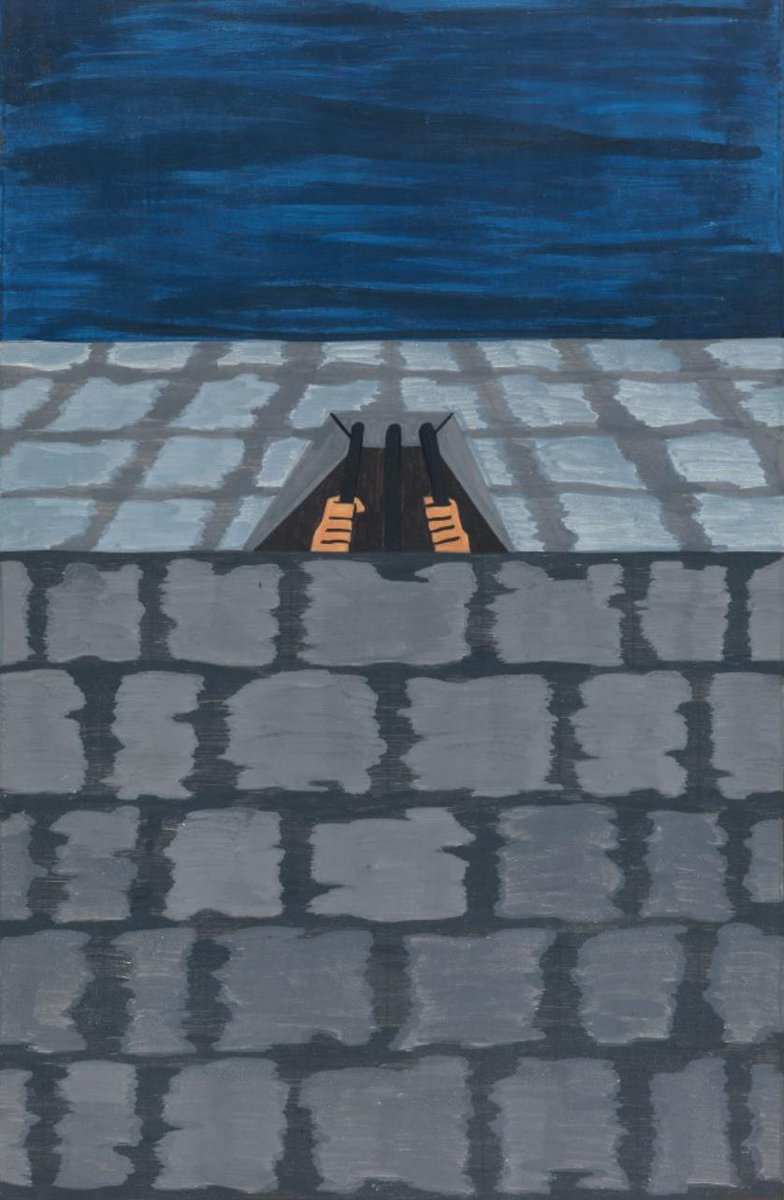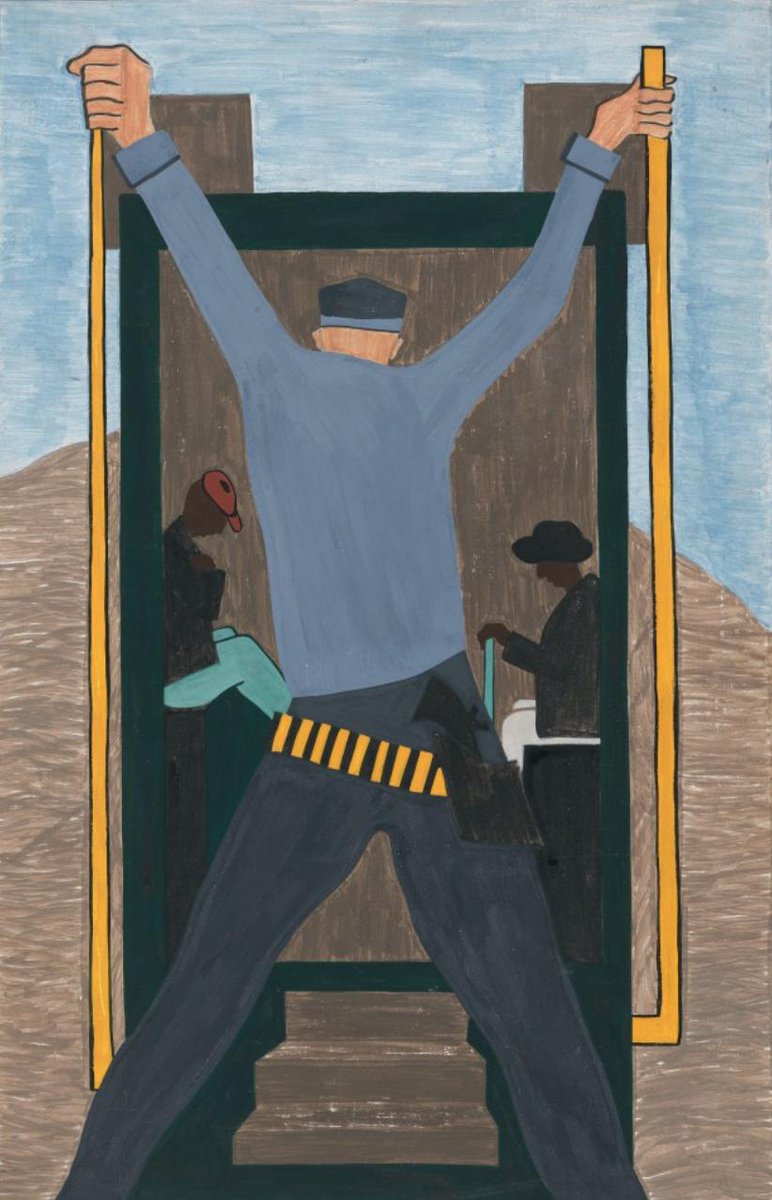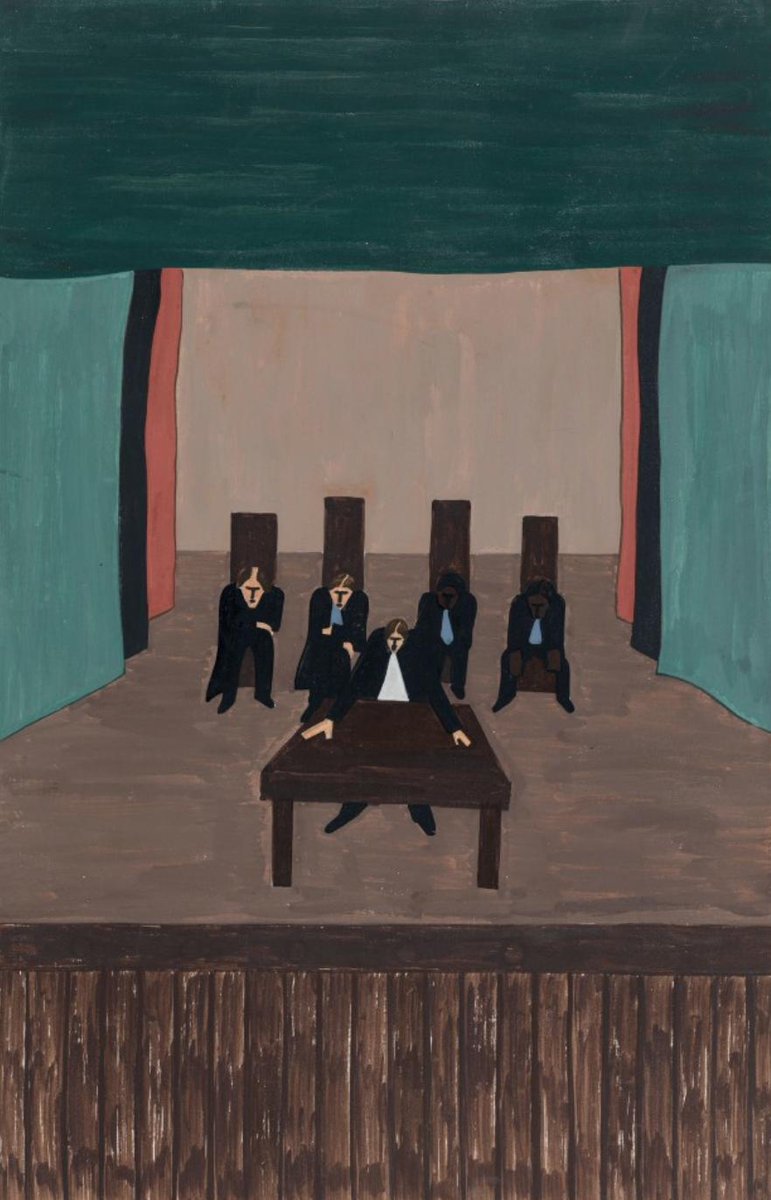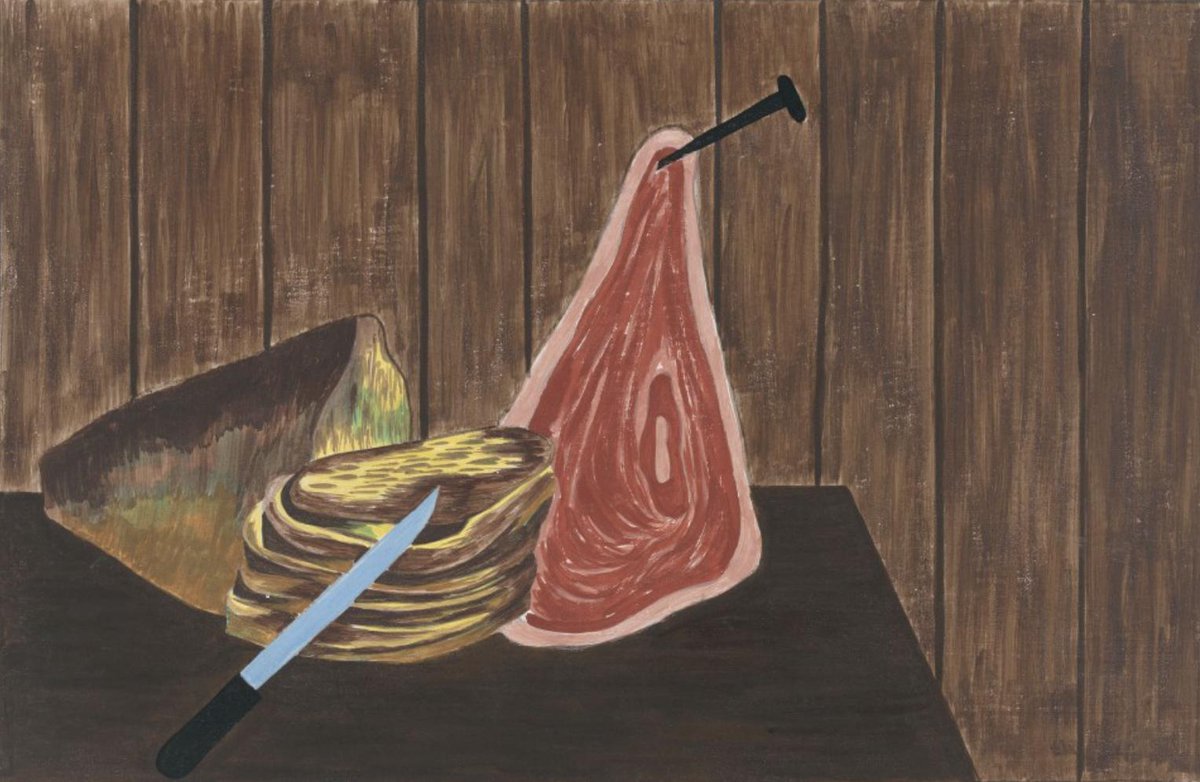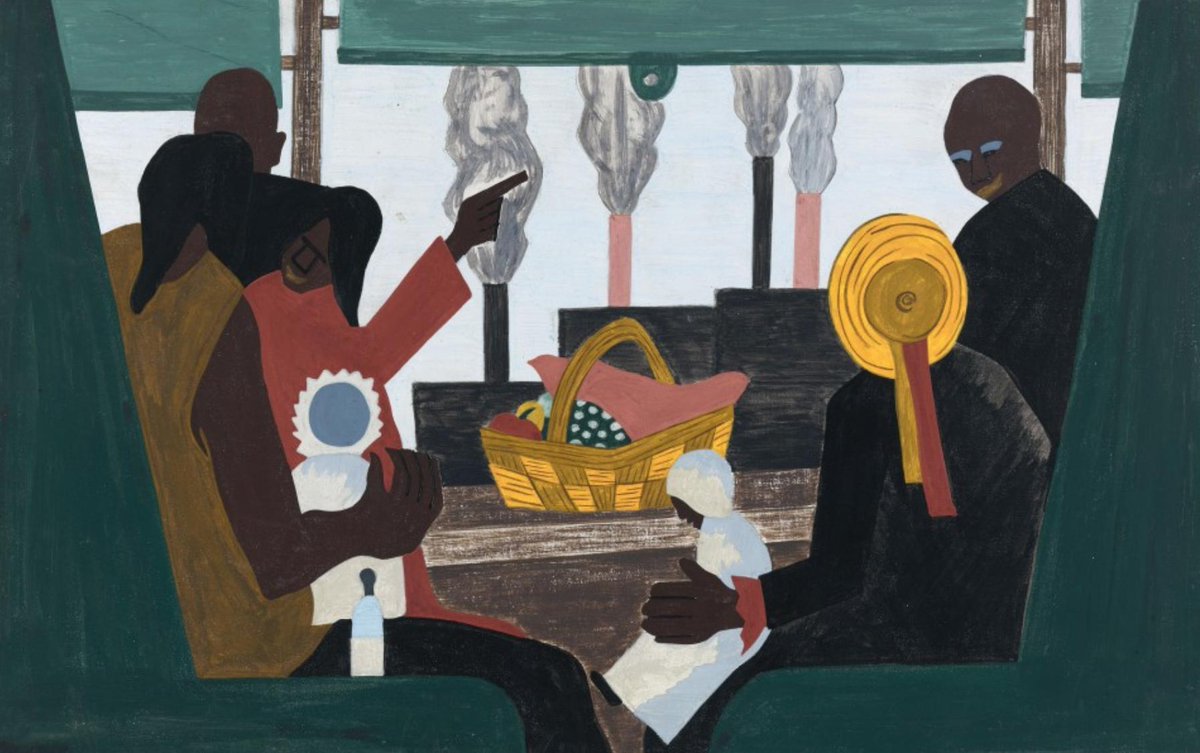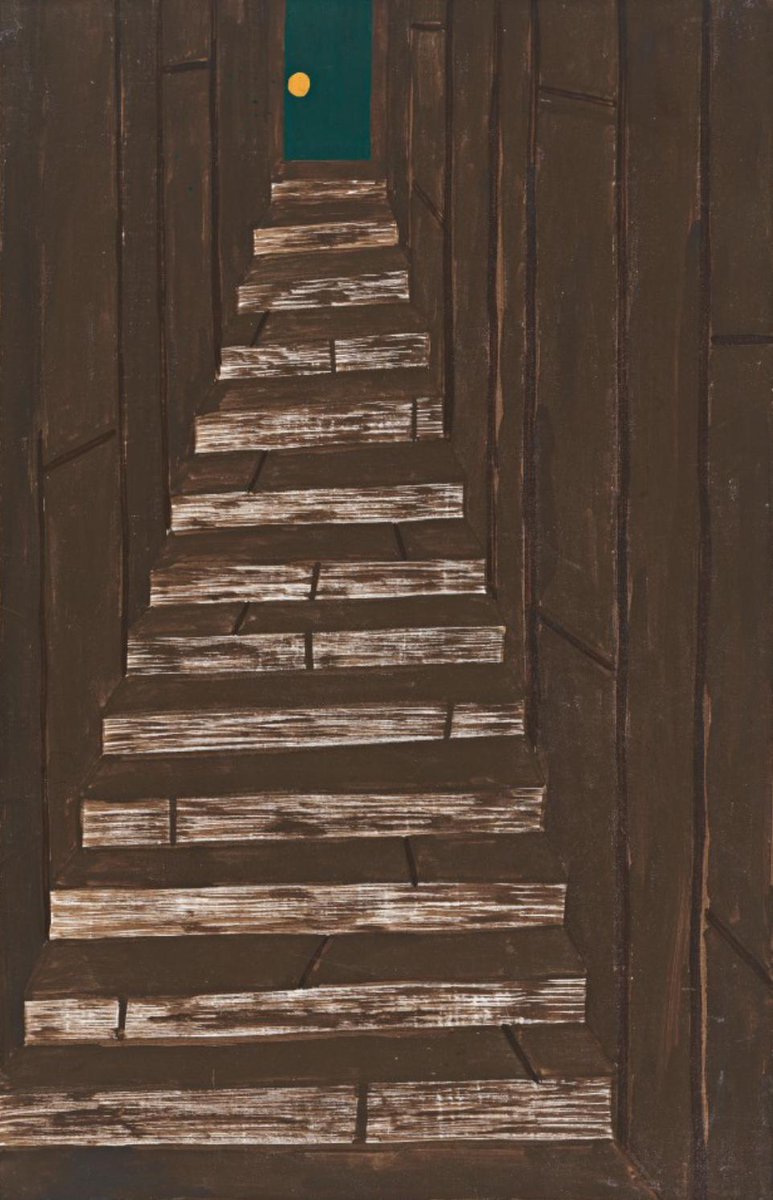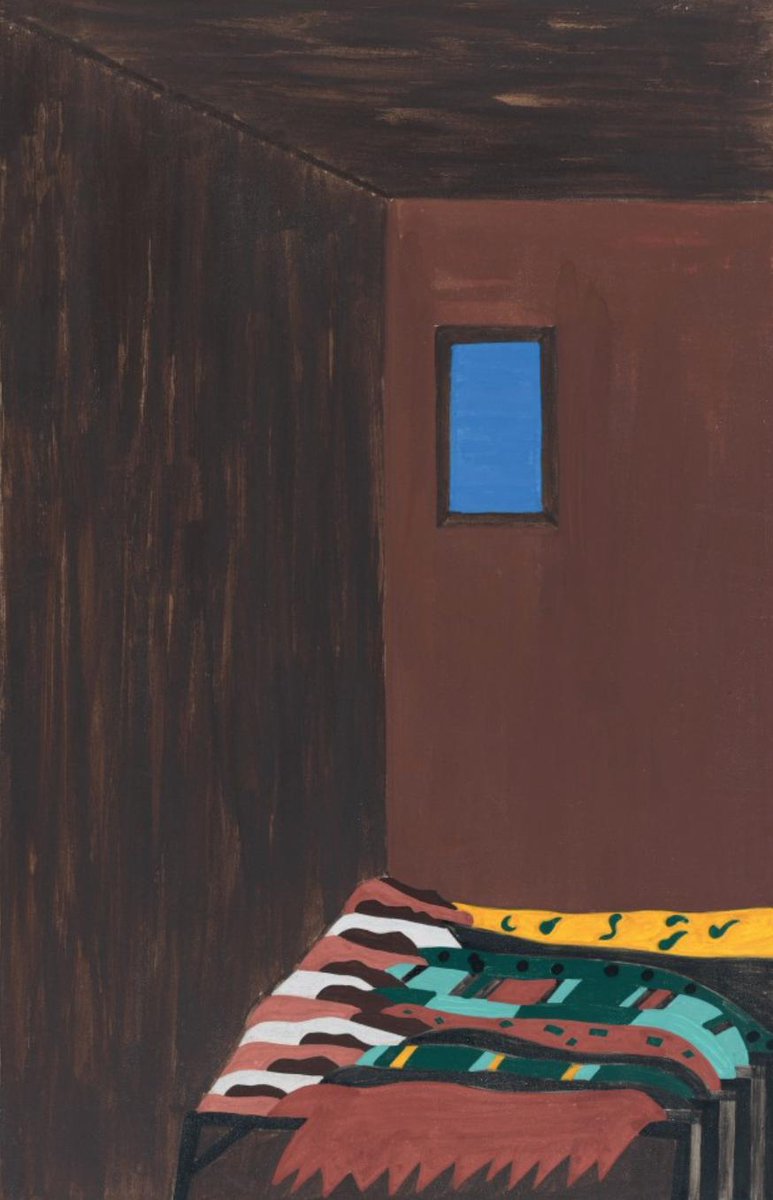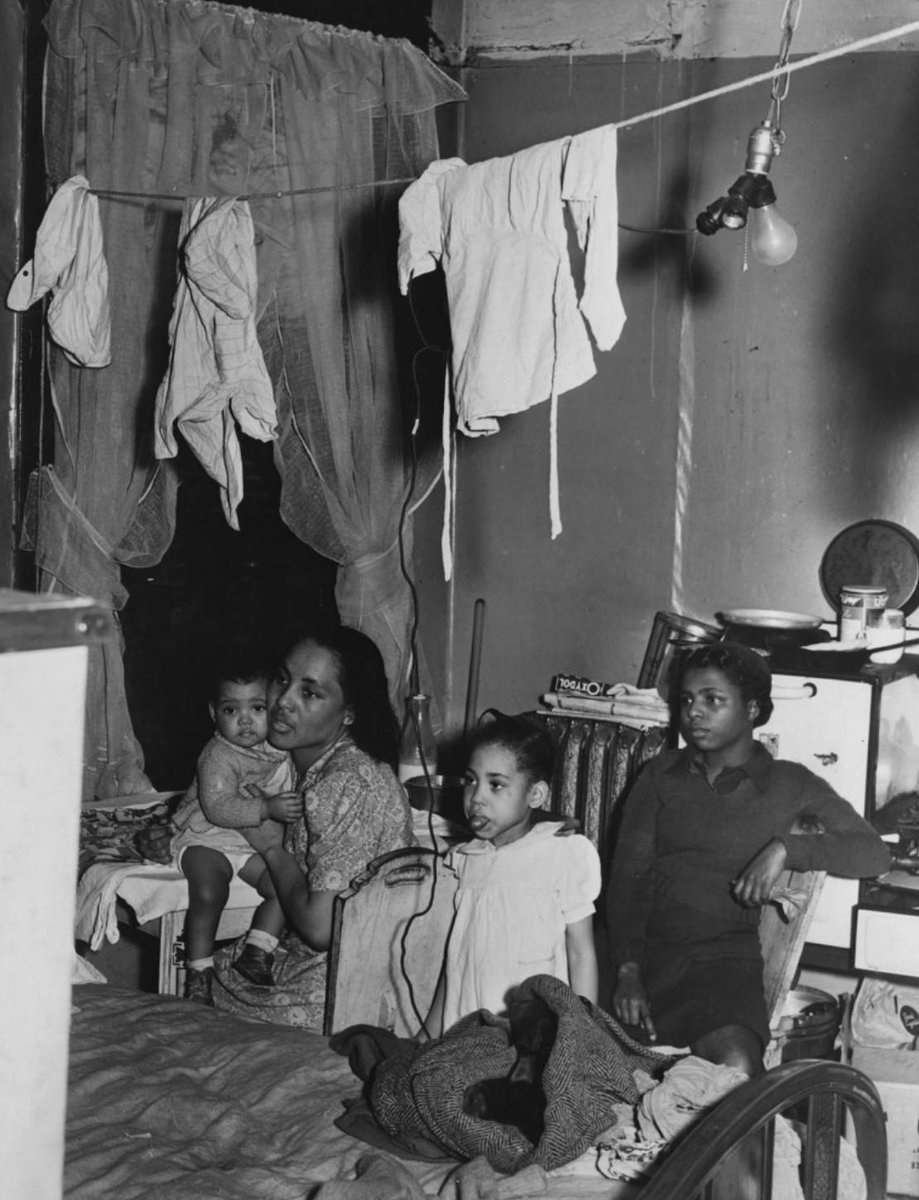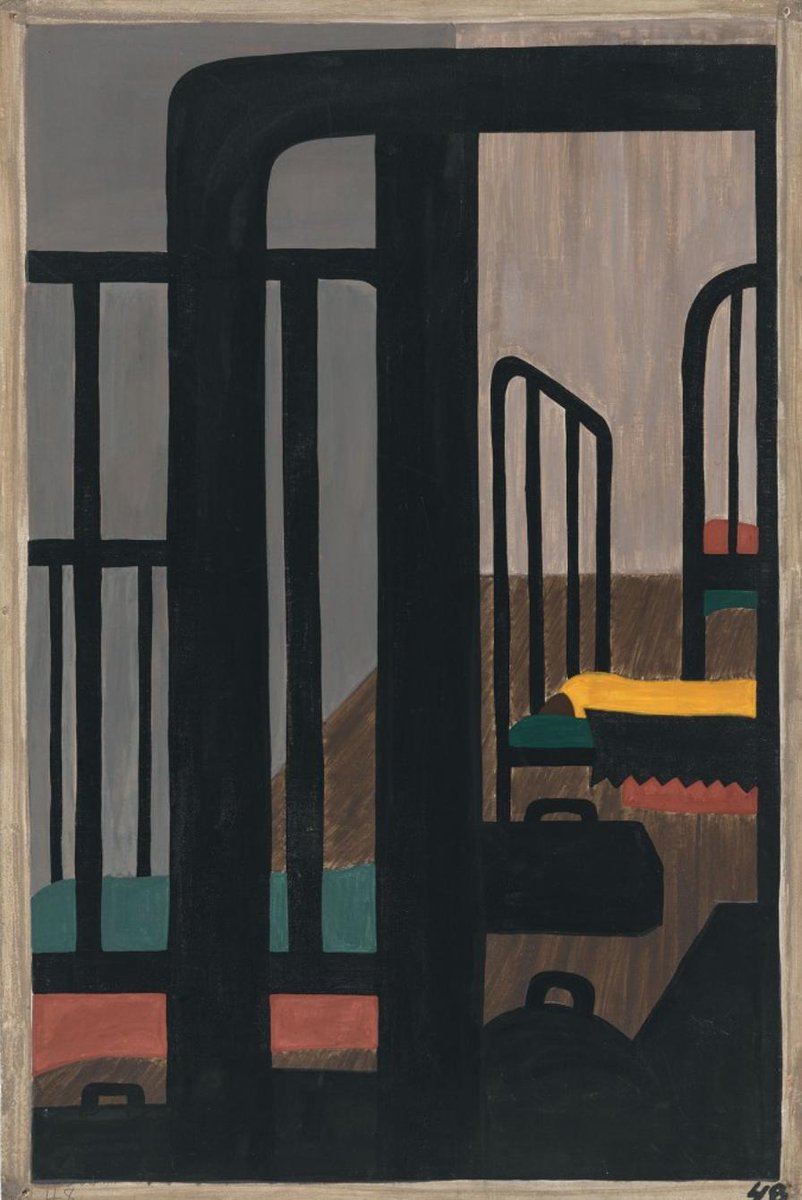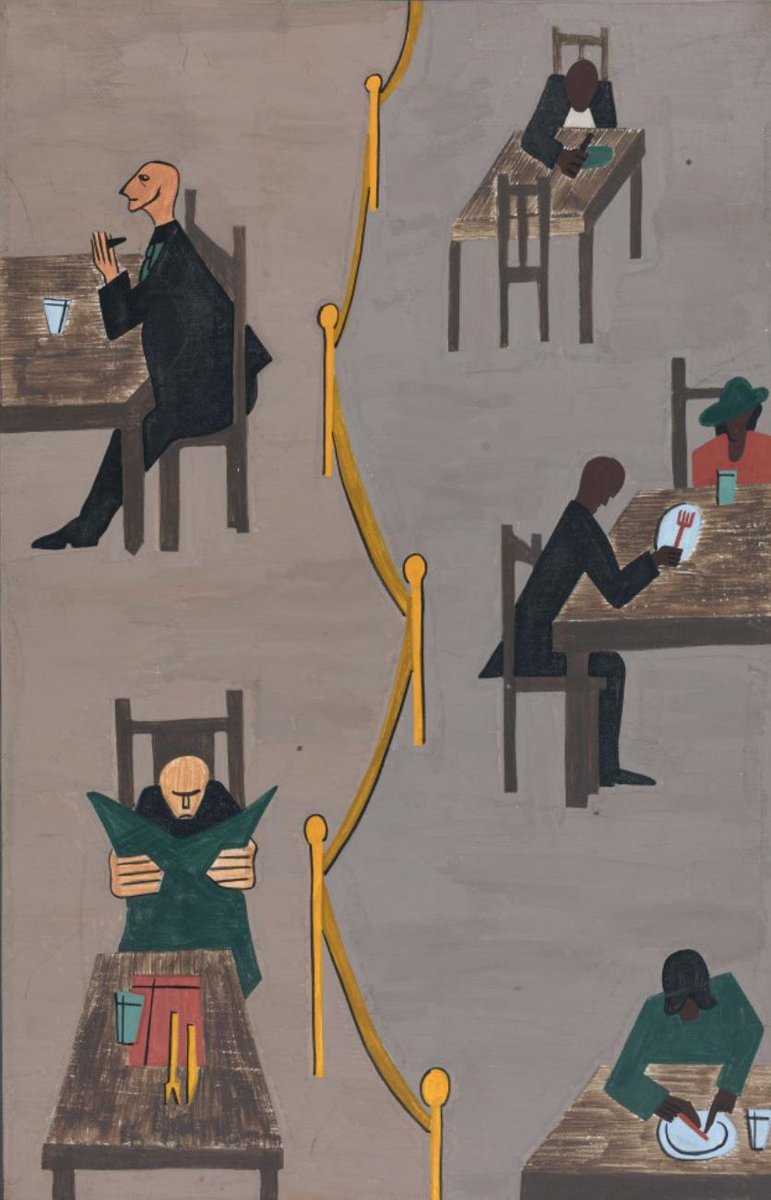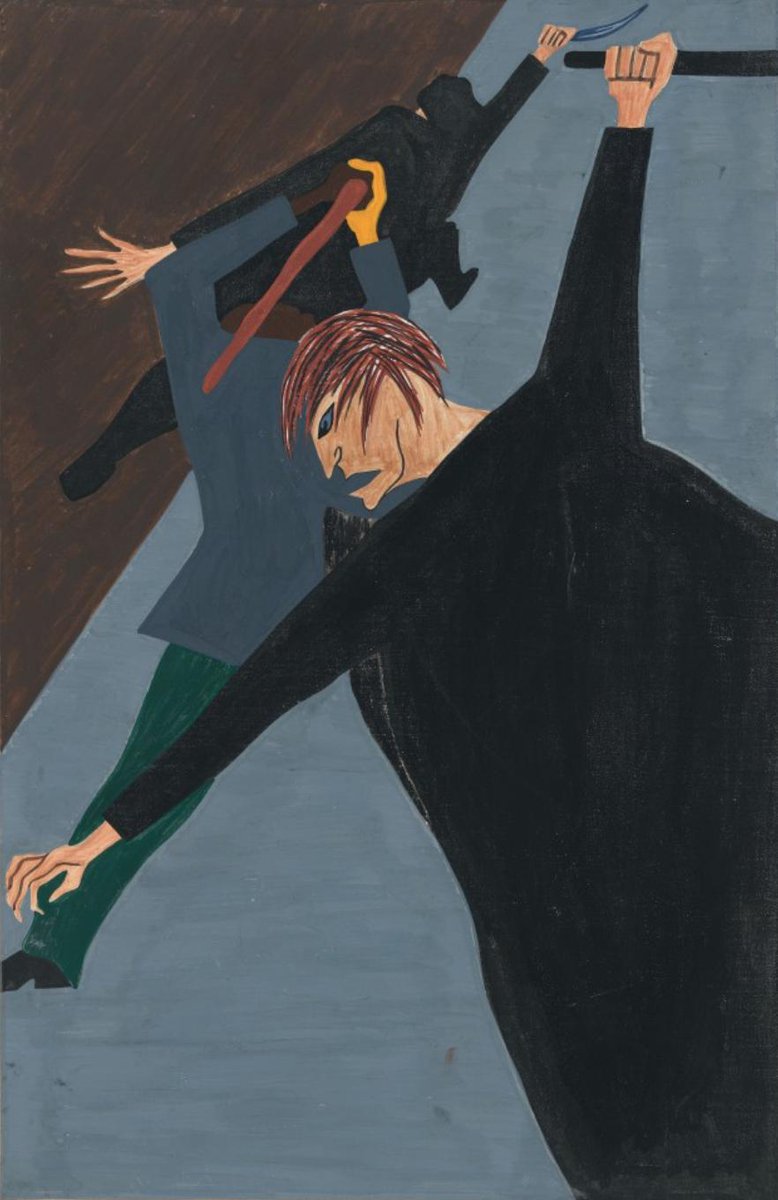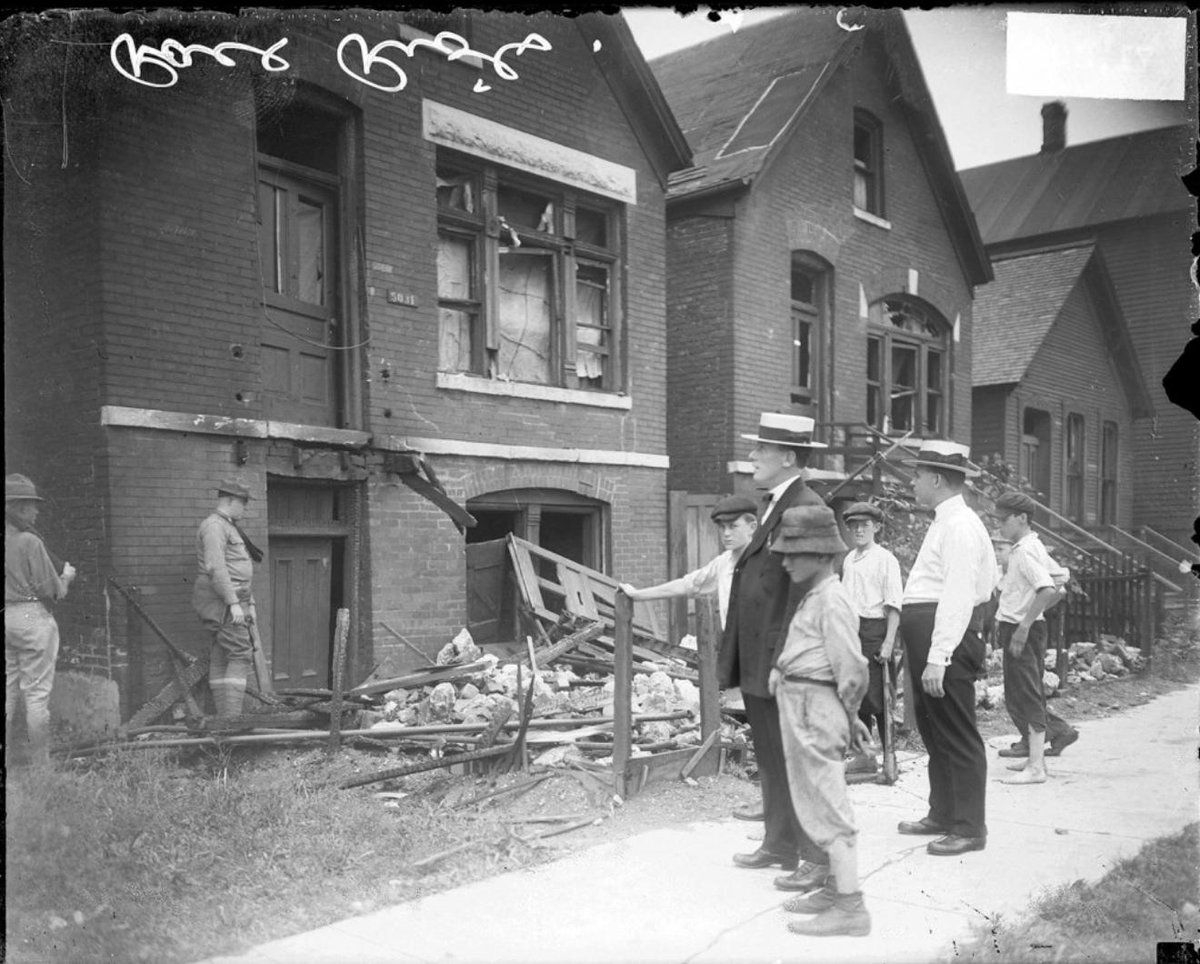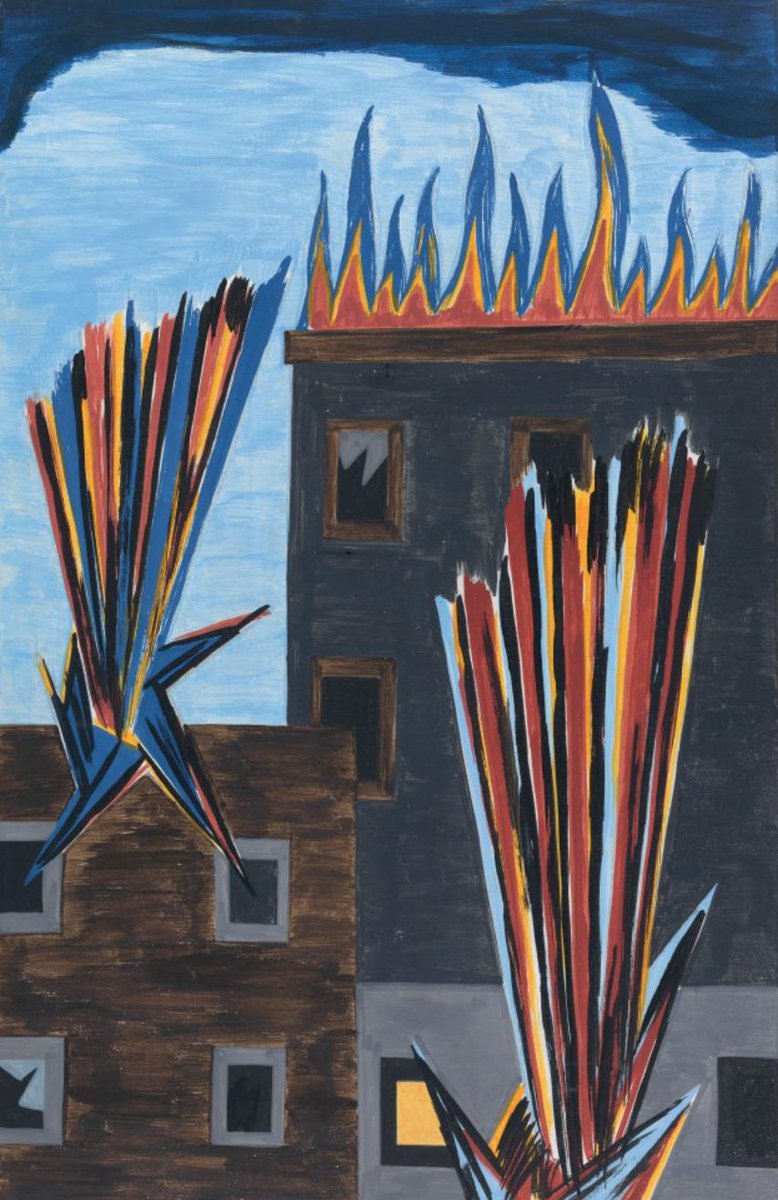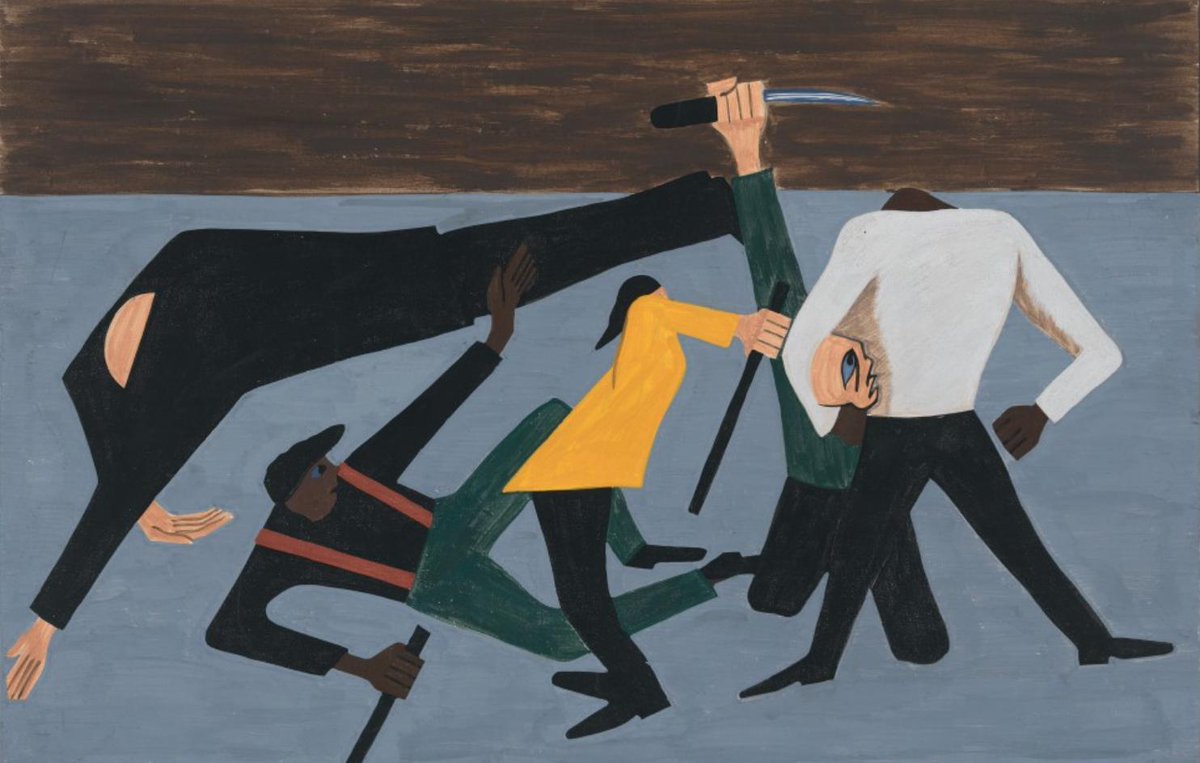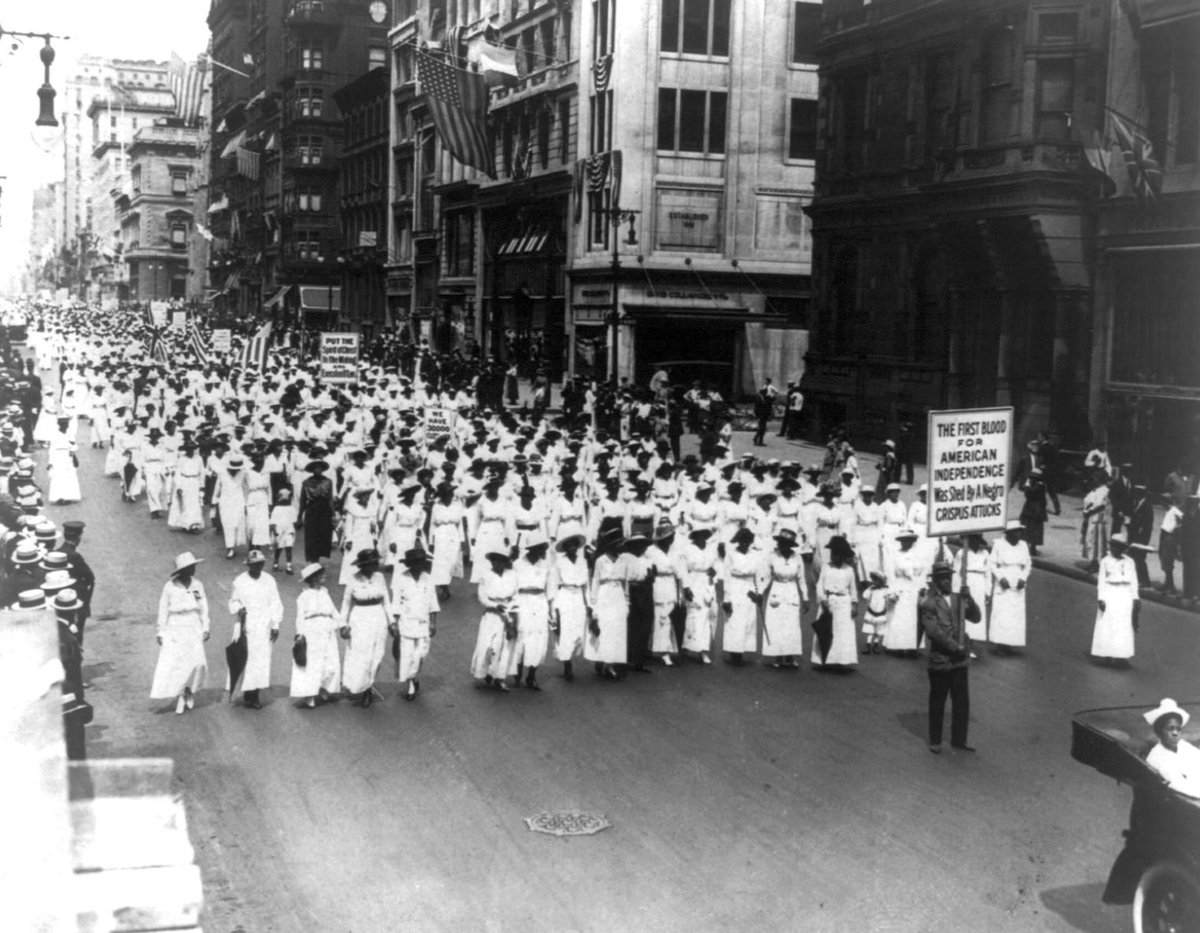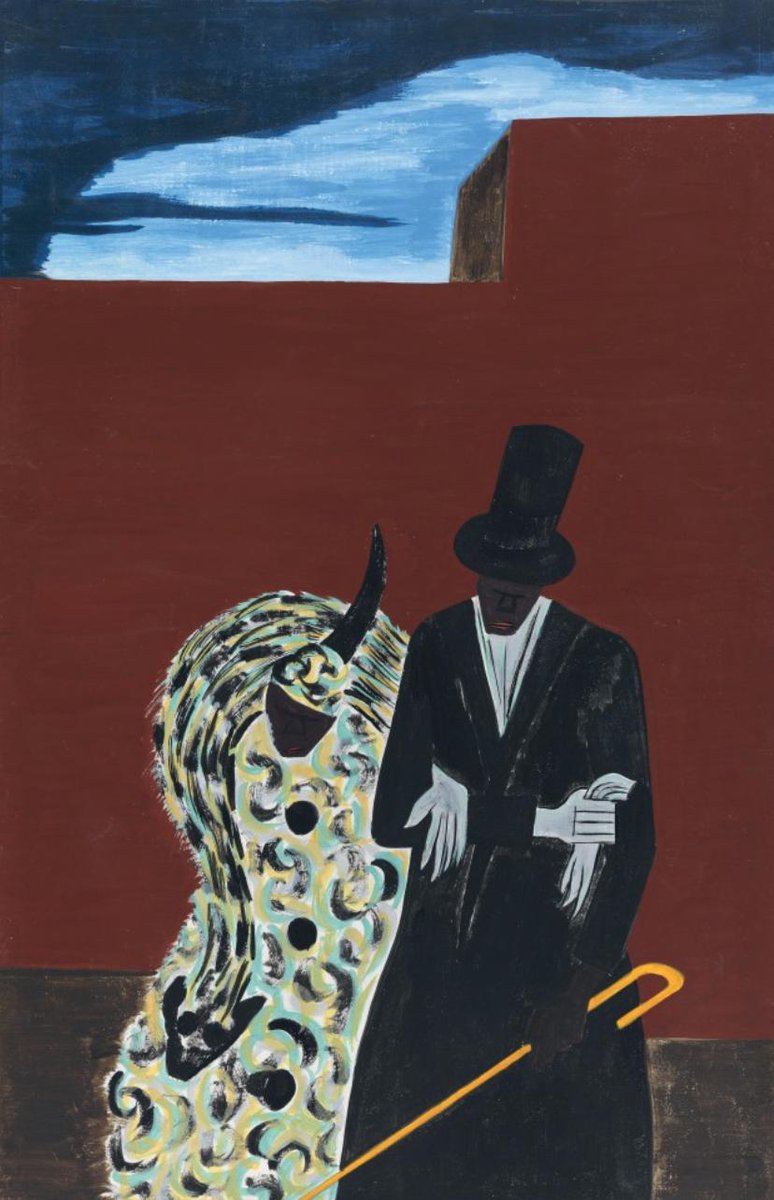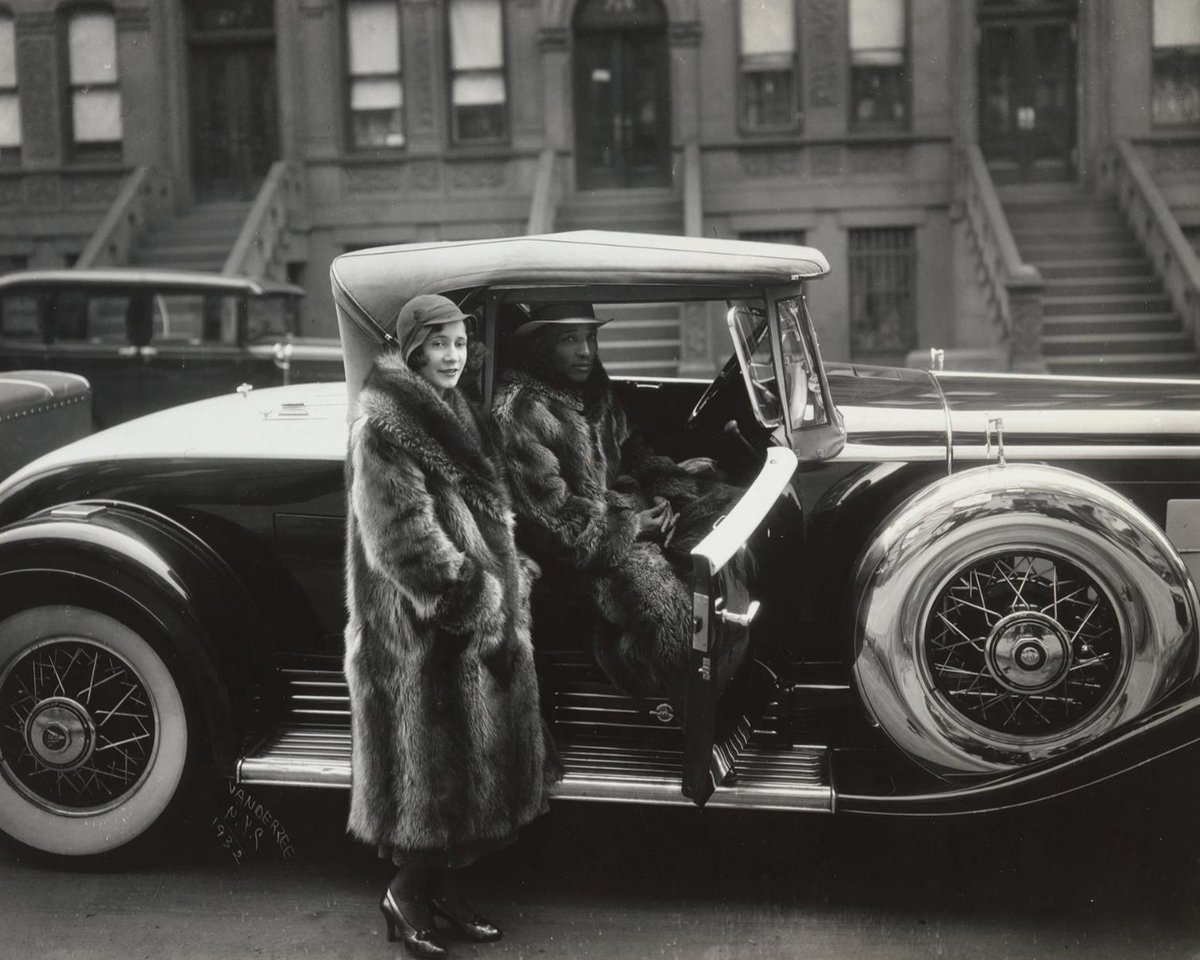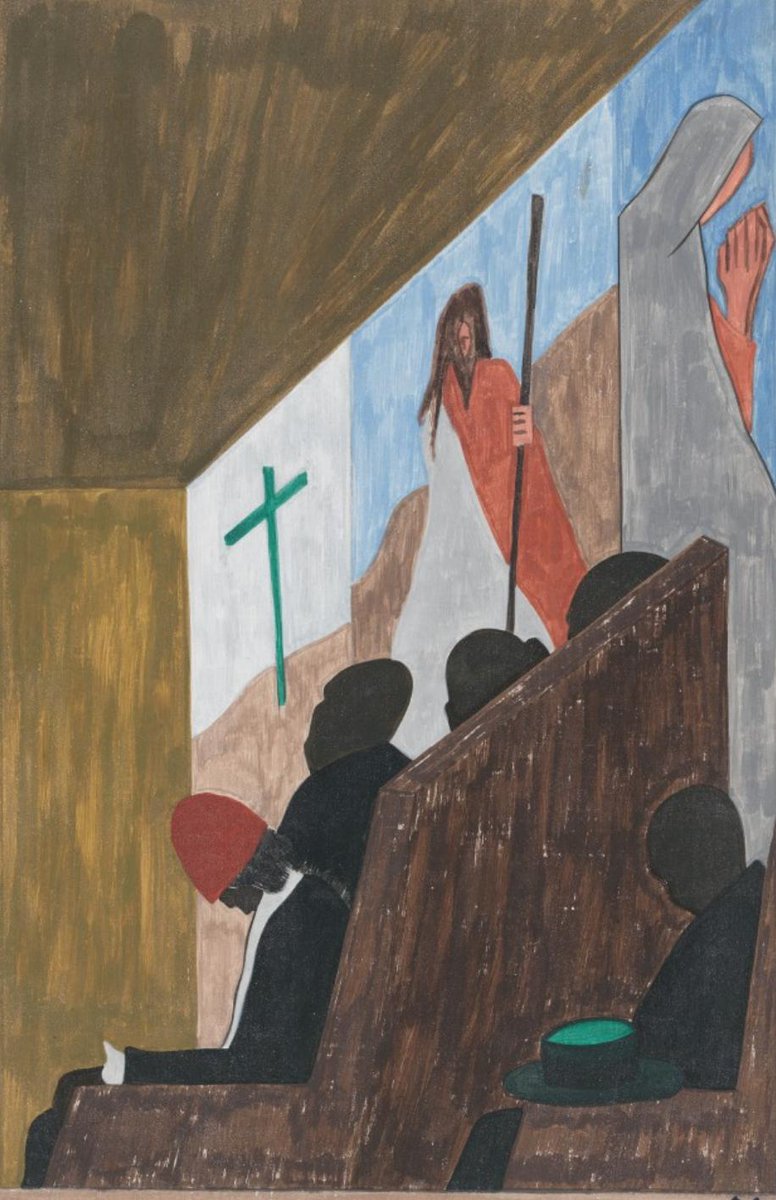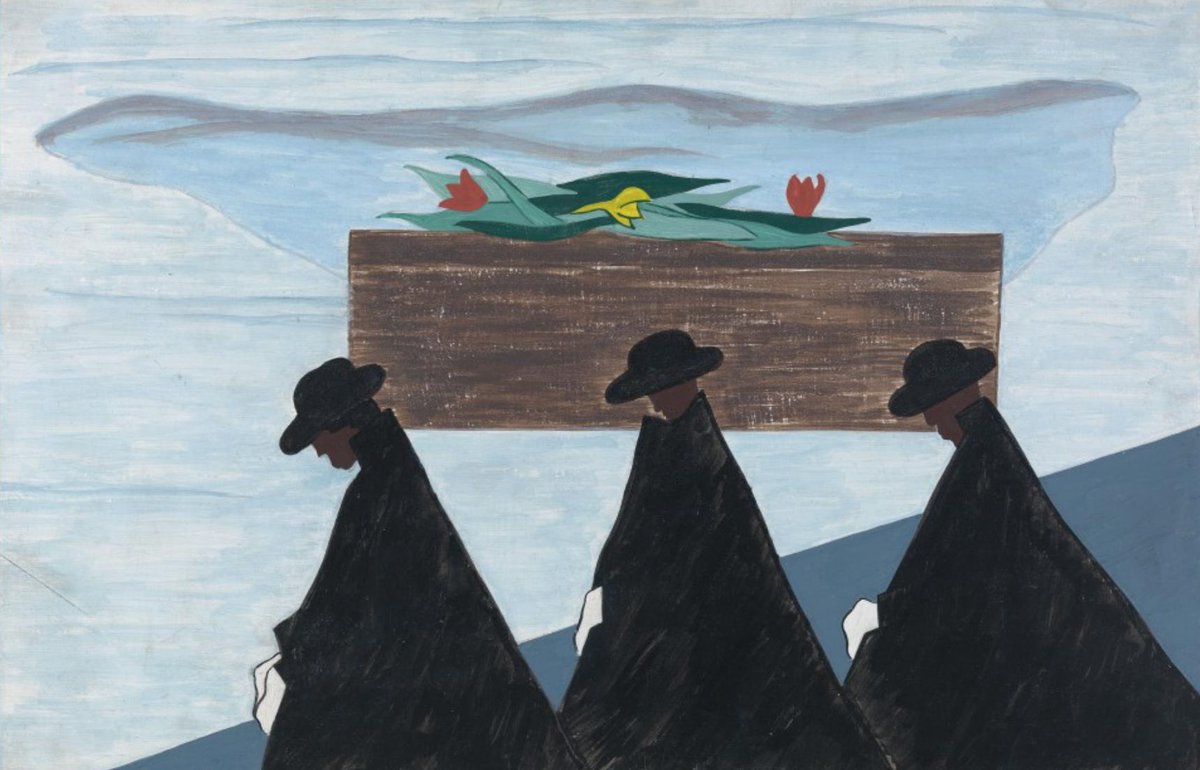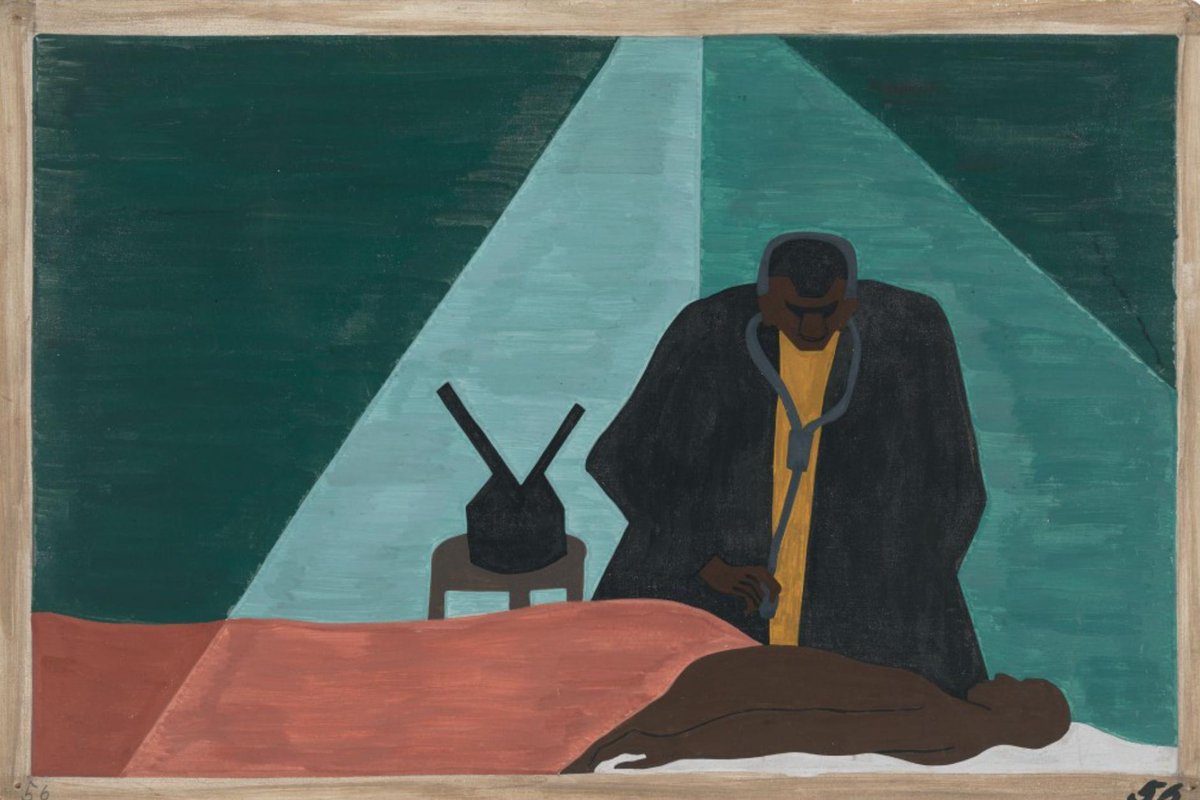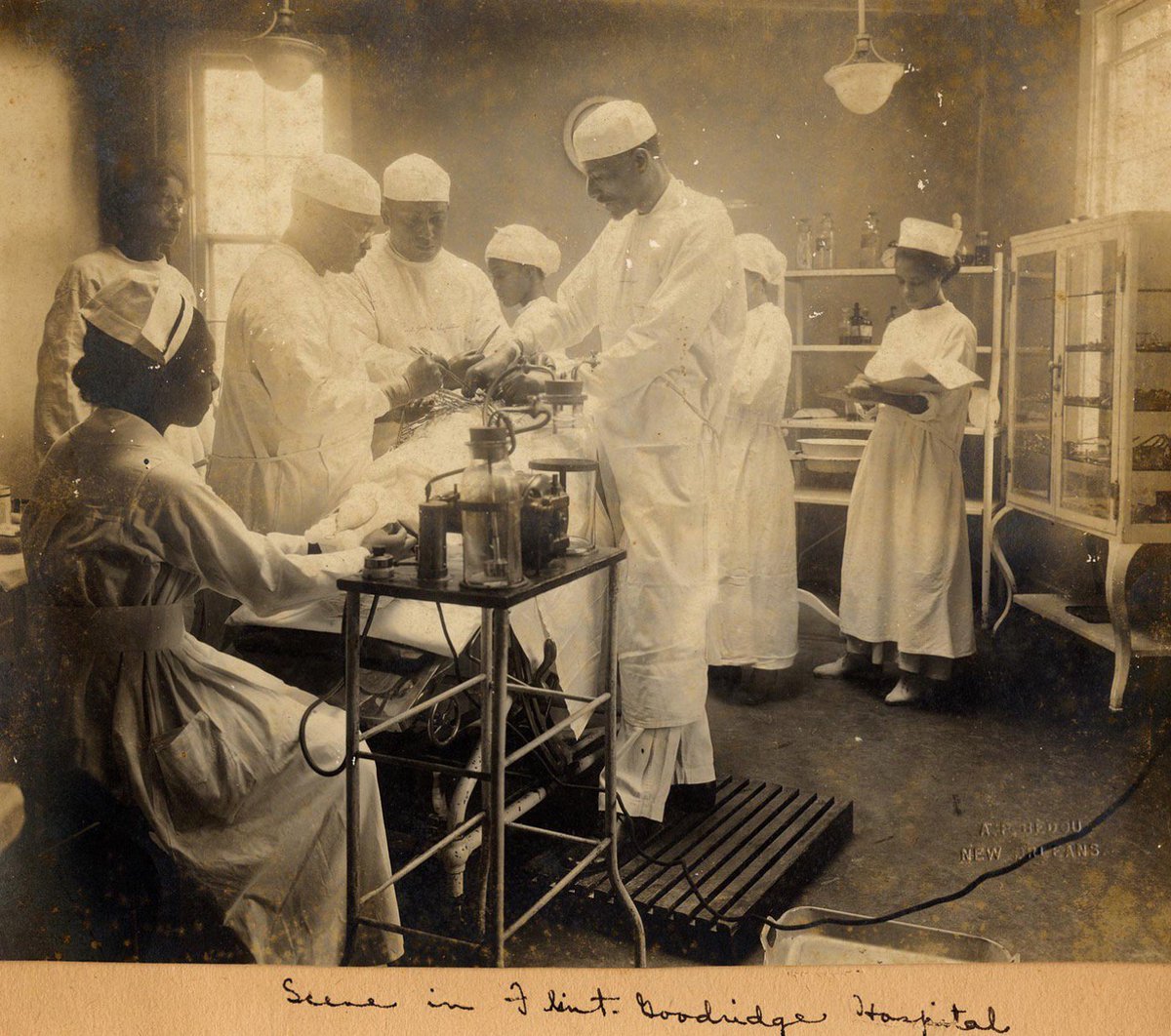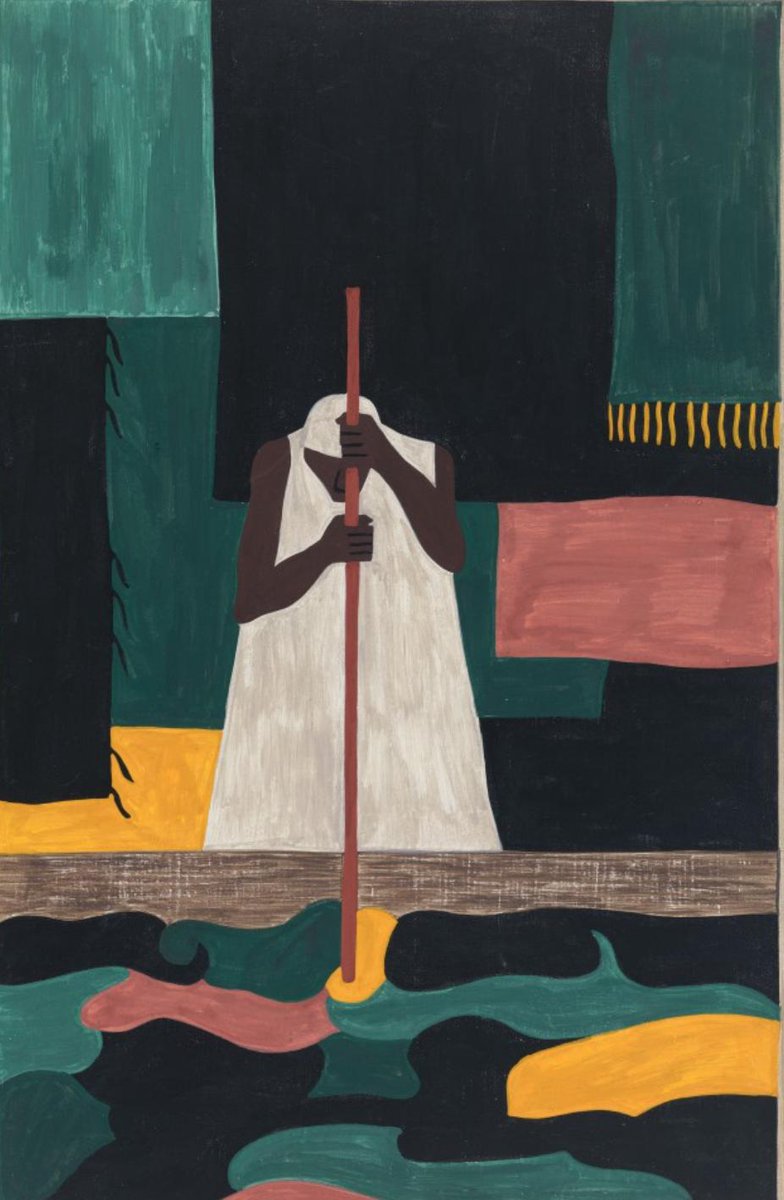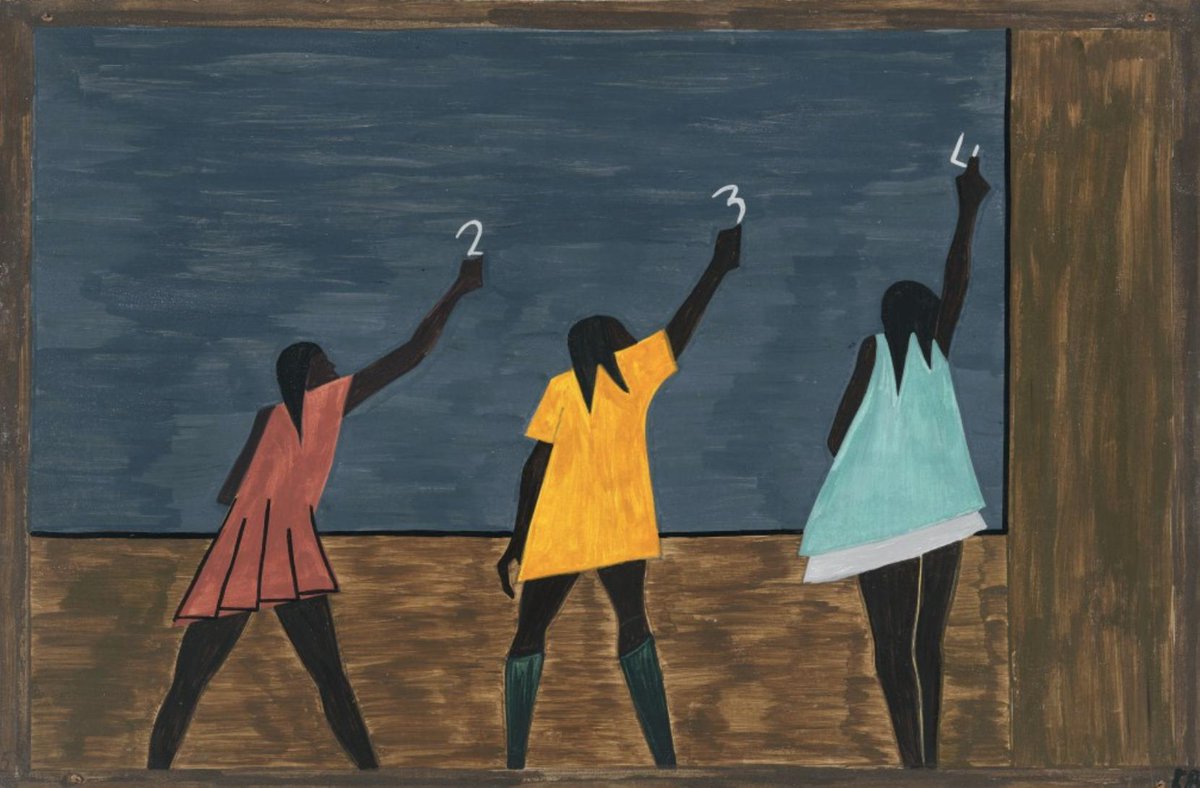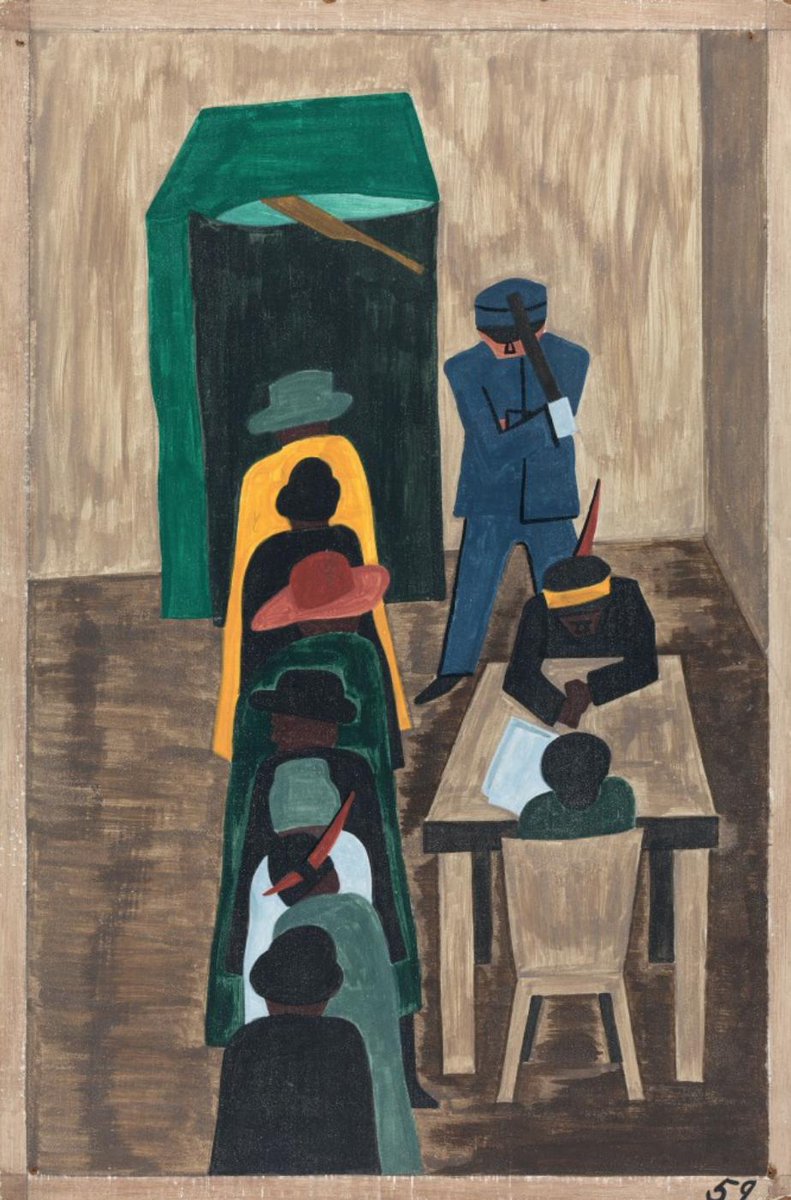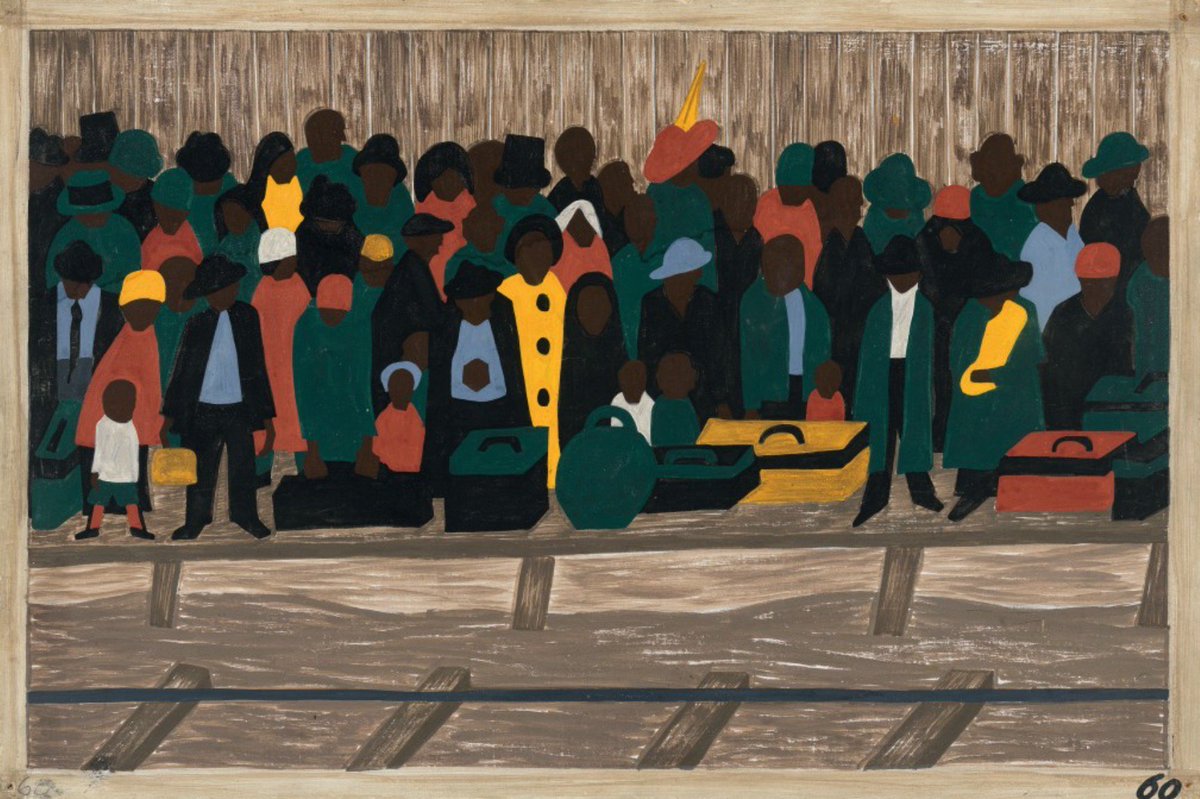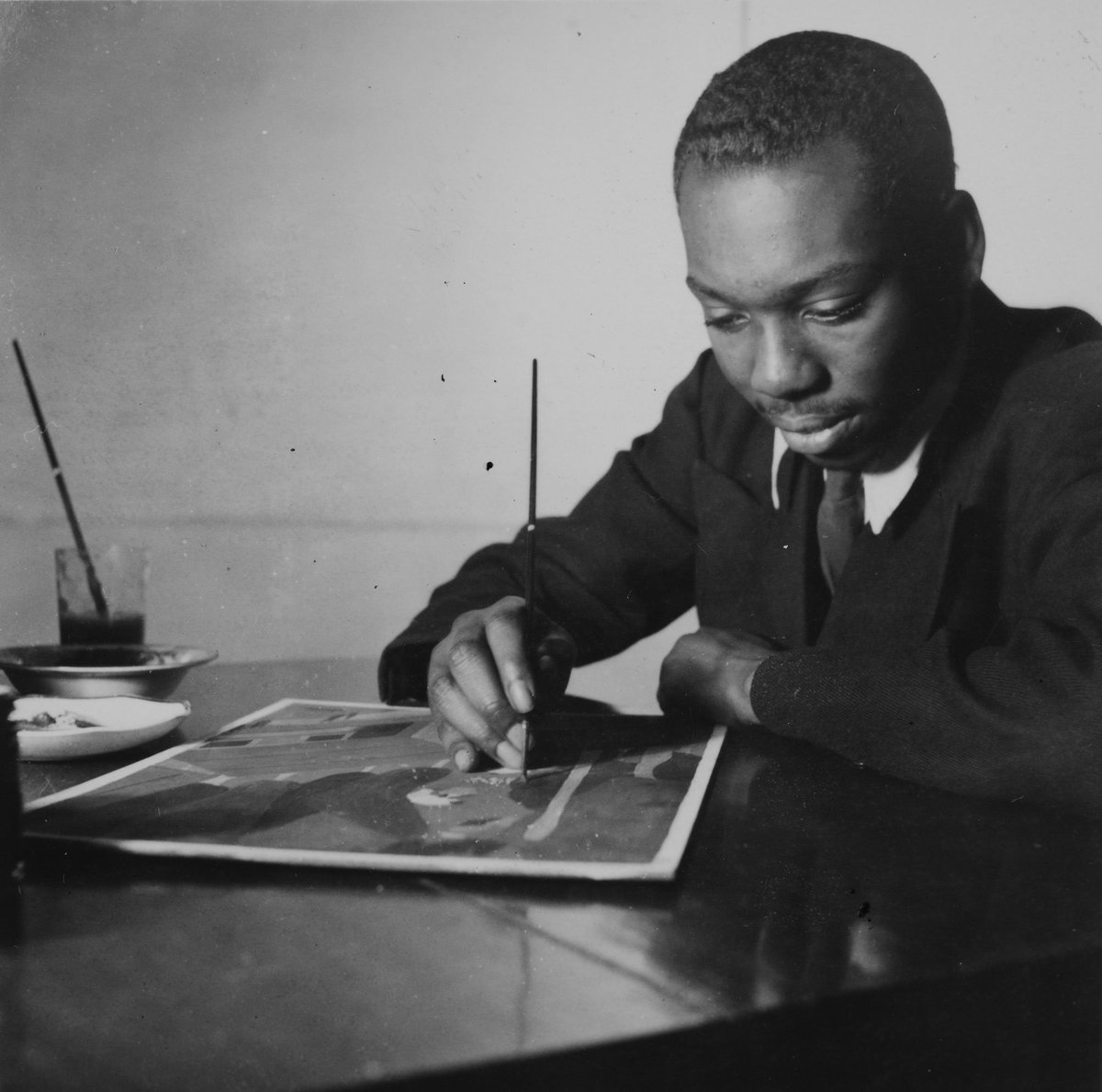"During World War I there was a great migration north by southern African Americans."
#1, Great Migration Series, 1941
Jacob Lawrence
MOMA
#1, Great Migration Series, 1941
Jacob Lawrence
MOMA
Langston Hughes
One-Way Ticket
I pick up my life
And take it with me
And I put it down in
Chicago, Detroit,
Buffalo, Scranton,
Any place that is North and East—
And not Dixie.
One-Way Ticket
I pick up my life
And take it with me
And I put it down in
Chicago, Detroit,
Buffalo, Scranton,
Any place that is North and East—
And not Dixie.
I pick up my life
And take it on the train
To Los Angeles, Bakersfield,
Seattle, Oakland, Salt Lake,
Any place that is North and West—
And not South.
I am fed up
With Jim Crow laws,
People who are cruel
And afraid,
Who lynch and run,
Who are scared of me
And me of them.
And take it on the train
To Los Angeles, Bakersfield,
Seattle, Oakland, Salt Lake,
Any place that is North and West—
And not South.
I am fed up
With Jim Crow laws,
People who are cruel
And afraid,
Who lynch and run,
Who are scared of me
And me of them.
I pick up my life
And take it away
On a one-way ticket—
Gone up North,
Gone out West,
Gone!
And take it away
On a one-way ticket—
Gone up North,
Gone out West,
Gone!
Here's a recording of Langston reading One-Way Ticket
"The war had caused a labor shortage in northern industry. Citizens of foreign countries were returning to their native lands."
#2, Great Migration Series, 1941
Jacob Lawrence
MOMA
#2, Great Migration Series, 1941
Jacob Lawrence
MOMA
"From every southern town migrants left by the hundreds to travel north."
#3, Great Migration Series, 1941
Jacob Lawrence
MOMA
#3, Great Migration Series, 1941
Jacob Lawrence
MOMA
"All other sources of labor having been exhausted, the migrants were the last resource."
#4, Great Migration Series, 1941
Jacob Lawrence
MOMA
#4, Great Migration Series, 1941
Jacob Lawrence
MOMA
"Migrants were advanced passage on the railroads, paid for by northern industry. Northern industry was to be repaid by the migrants out of their future wages."
#5, Great Migration Series, 1941
Jacob Lawrence
MOMA
#5, Great Migration Series, 1941
Jacob Lawrence
MOMA
Railroadin' Some by Henry Thomas 'Ragtime Texas' (1929), who punctuates his song with train whistles created with his signature instrument, the quills, made out of cane pipes and originally played by enslaved Africans in the South.
"It was hot in the train, and the car was too close to the engine, making it impossible to open the window. More than once, cinders found a way into the car and flew into the baby’s eyes...The car was filthy," wrote Ralph Ellison in his re-location story “Boy on a Train."
"The migrant, whose life had been rural and nurtured by the earth, was now moving to urban life dependent on industrial machinery."
#7, Great Migration Series, 1941
Jacob Lawrence
MOMA
#7, Great Migration Series, 1941
Jacob Lawrence
MOMA
"Some left because of promises of work in the North. Others left because their farms had been devastated by floods."
#8, Great Migration Series, 1941
Jacob Lawrence
MOMA
#8, Great Migration Series, 1941
Jacob Lawrence
MOMA
"They left because the boll weevil had ravaged the cotton crop."
#9, Great Migration Series, 1941
Jacob Lawrence
MOMA
#9, Great Migration Series, 1941
Jacob Lawrence
MOMA
"Beat the boll weevil - Get a Good Cotton Crop"
Food Administration Educational Division advertisement, c. 1917–19
Food Administration Educational Division advertisement, c. 1917–19
"The railroad stations were at times so crowded with people leaving that special guards had to be called to keep order."
#12, Great Migration Series, 1941
Jacob Lawrence
MOMA
#12, Great Migration Series, 1941
Jacob Lawrence
MOMA
"The crops were left to dry and rot. There was no one to tend them."
#13, Great Migration Series, 1941
Jacob Lawrence
MOMA
#13, Great Migration Series, 1941
Jacob Lawrence
MOMA
"For African Americans there was no justice in the southern courts."
#14, Great Migration Series, 1941
Jacob Lawrence
MOMA
#14, Great Migration Series, 1941
Jacob Lawrence
MOMA
"Tenant farmers received harsh treatment at the hands of the planter."
#17, Great Migration Series, 1941
Jacob Lawrence
MOMA
#17, Great Migration Series, 1941
Jacob Lawrence
MOMA
"In many of the communities the Black press was read with great interest. It encouraged the movement."
#20, Great Migration Series, 1941
Jacob Lawrence
MOMA
#20, Great Migration Series, 1941
Jacob Lawrence
MOMA
"Families arrived at the station very early. They did not wish to miss their trains north."
#21, Great Migration Series, 1941
Jacob Lawrence
MOMA
#21, Great Migration Series, 1941
Jacob Lawrence
MOMA
"Migrants left. They did not feel safe. It was not wise to be found on the streets late at night. They were arrested on the slightest provocation."
#22, Great Migration Series, 1941
Jacob Lawrence
MOMA
#22, Great Migration Series, 1941
Jacob Lawrence
MOMA
"Their children were forced to work in the fields. They could not go to school."
#24, Great Migration Series, 1941
Jacob Lawrence
MOMA
#24, Great Migration Series, 1941
Jacob Lawrence
MOMA
"They left their homes. Soon some communities were left almost empty."
#25, Great Migration Series, 1941
Jacob Lawrence
MOMA
#25, Great Migration Series, 1941
Jacob Lawrence
MOMA
"And people all over the South continued to discuss this great movement."
#26, Great Migration Series, 1941
Jacob Lawrence
MOMA
#26, Great Migration Series, 1941
Jacob Lawrence
MOMA
"Many men stayed behind until they could take their families north with them."
#27, Great Migration Series, 1941
Jacob Lawrence
MOMA
#27, Great Migration Series, 1941
Jacob Lawrence
MOMA
"The labor agent sent south by northern industry was a familiar presence in the Black communities."
#28, Great Migration Series, 1941
Jacob Lawrence
MOMA
#28, Great Migration Series, 1941
Jacob Lawrence
MOMA
"The labor agent recruited unsuspecting laborers as strike breakers for northern industries."
#29, Great Migration Series, 1941
Jacob Lawrence
MOMA
#29, Great Migration Series, 1941
Jacob Lawrence
MOMA
"In every southern home people met to decide whether or not to go north."
#30, Great Migration Series, 1941
Jacob Lawrence
MOMA
#30, Great Migration Series, 1941
Jacob Lawrence
MOMA
"The migrants found improved housing when they arrived north."
#31, Great Migration Series, 1941
Jacob Lawrence
MOMA
#31, Great Migration Series, 1941
Jacob Lawrence
MOMA
"The railroad stations in the South were crowded with northbound travellers."
#32, Great Migration Series, 1941
Jacob Lawrence
MOMA
#32, Great Migration Series, 1941
Jacob Lawrence
MOMA
"Letters from relatives in the North told of the better life there."
#33, Great Migration Series, 1941
Jacob Lawrence
MOMA
#33, Great Migration Series, 1941
Jacob Lawrence
MOMA
"The Black press urged the people to leave the South."
#34, Great Migration Series, 1941
Jacob Lawrence
MOMA
#34, Great Migration Series, 1941
Jacob Lawrence
MOMA
"They left the South in great numbers. They arrived in the North in great numbers."
#35, Great Migration Series, 1941
Jacob Lawrence
MOMA
#35, Great Migration Series, 1941
Jacob Lawrence
MOMA
"Migrants arrived in Chicago, the gateway to the West."
#36, Great Migration Series, 1941
Jacob Lawrence
MOMA
#36, Great Migration Series, 1941
Jacob Lawrence
MOMA
"Many migrants found work in the steel industry."
#37, Great Migration Series, 1941
Jacob Lawrence
MOMA
#37, Great Migration Series, 1941
Jacob Lawrence
MOMA
Walter Black, one of the first African Americans to be promoted to foreman in the prominent Youngstown, Ohio steel industry. This photograph was taken in 1920, shortly after he resuscitated a coworker rendered unconscious by the poisonous gas emanating from the blast furnace.
Employees from the Bluefield, West Virginia workshop of the Norfolk & Western Railway, the town’s largest employer, June 1929
MOMA
MOMA
"Railroad platforms were piled high with luggage."
#39, Great Migration Series, 1941
Jacob Lawrence
MOMA
#39, Great Migration Series, 1941
Jacob Lawrence
MOMA
"The South was desperate to keep its cheap labor. Northern labor agents were jailed or forced to operate in secrecy."
#41, Great Migration Series, 1941
Jacob Lawrence
MOMA
#41, Great Migration Series, 1941
Jacob Lawrence
MOMA
"To make it difficult for the migrants to leave, they were arrested en masse. They often missed their trains."
#42, Great Migration Series, 1941
Jacob Lawrence
MOMA
#42, Great Migration Series, 1941
Jacob Lawrence
MOMA
"In a few sections of the South leaders of both Black and White communities met to discuss ways of making the South a good place to live."
#43, Great Migration Series, 1941
Jacob Lawrence
MOMA
#43, Great Migration Series, 1941
Jacob Lawrence
MOMA
"But living conditions were better in the North."
#44, Great Migration Series, 1941
Jacob Lawrence
MOMA
#44, Great Migration Series, 1941
Jacob Lawrence
MOMA
"The migrants arrived in Pittsburgh, one of the great industrial centers of the North."
#45, Great Migration Series, 1941
Jacob Lawrence
MOMA
#45, Great Migration Series, 1941
Jacob Lawrence
MOMA
"Industries boarded their workers in unhealthy quarters. Labor camps were numerous."
#46, Great Migration Series, 1941
Jacob Lawrence
MOMA
#46, Great Migration Series, 1941
Jacob Lawrence
MOMA
"As the migrant population grew, good housing became scarce. Workers were forced to live in overcrowded and dilapidated tenement houses."
#47, Great Migration Series, 1941
Jacob Lawrence
MOMA
#47, Great Migration Series, 1941
Jacob Lawrence
MOMA
In 1941, blues singer Josh White recorded “Bad Housing Blues,” describing the atrocious conditions & the need for change:
I’m goin’ to the Capitol, goin’ to the White House lawn
Better wipe out these slums
Been this way since I was born
I’m goin’ to the Capitol, goin’ to the White House lawn
Better wipe out these slums
Been this way since I was born
In his 1940 autobiography, Langston Hughes writes about the extortion of black tenants in Cleveland: “An 8-room house with one bath would be cut up into apartments & 5 or 6 families crowded into it, each...apartment renting for what the whole house had rented before.”
"They found discrimination in the North. It was a different kind."
#49, Great Migration Series, 1941
Jacob Lawrence
MOMA
#49, Great Migration Series, 1941
Jacob Lawrence
MOMA
"Race riots were numerous. White workers were hostile toward the migrant who had been hired to break strikes."
#50, Great Migration Series, 1941
Jacob Lawrence
MOMA
#50, Great Migration Series, 1941
Jacob Lawrence
MOMA
A heartbreaking record of some of the ransacked, devastated homes of African American Chicago residents after the city’s terrible 1919 riot, which killed thirty-eight, injured more than five hundred, and left more than one thousand homeless.
MOMA
MOMA
"African Americans seeking to find better housing attempted to move into new areas. This resulted in the bombing of their new homes."
#51, Great Migration Series, 1941
Jacob Lawrence
MOMA
#51, Great Migration Series, 1941
Jacob Lawrence
MOMA
"One of the most violent race riots occurred in East St. Louis."
#52, Great Migration Series, 1941
Jacob Lawrence
MOMA
#52, Great Migration Series, 1941
Jacob Lawrence
MOMA
"African Americans, long-time residents of northern cities, met the migrants with aloofness and disdain."
#53, Great Migration Series, 1941
Jacob Lawrence
MOMA
#53, Great Migration Series, 1941
Jacob Lawrence
MOMA
"For the migrants, the church was the center of life."
#54, Great Migration Series, 1941
Jacob Lawrence
MOMA
#54, Great Migration Series, 1941
Jacob Lawrence
MOMA
"The migrants, having moved suddenly into a crowded and unhealthy environment, soon contracted tuberculosis. The death rate rose."
#55, Great Migration Series, 1941
Jacob Lawrence
MOMA
#55, Great Migration Series, 1941
Jacob Lawrence
MOMA
"The African American professionals were forced to follow their clients in order to make a living."
#56, Great Migration Series, 1941
Jacob Lawrence
MOMA
#56, Great Migration Series, 1941
Jacob Lawrence
MOMA
Chief surgeon Dr. Rivers Frederick performing surgery at the Flint-Goodridge Hospital, New Orleans, Louisiana, then part of the historically black Dillard University, c. 1932
MOMA
MOMA
"The female workers were the last to arrive north."
#57, Great Migration Series, 1941
Jacob Lawrence
MOMA
#57, Great Migration Series, 1941
Jacob Lawrence
MOMA
"In the North the African American had more educational opportunities."
#58, Great Migration Series, 1941
Jacob Lawrence
MOMA
#58, Great Migration Series, 1941
Jacob Lawrence
MOMA
Jacob Lawrence was only twenty-three years old when he completed this series of sixty paintings about the Great Migration, the mass movement of African Americans from the rural South to the urban North.“They left as if they were fleeing some curse,” wrote Emmett J. Scott in 1920.
A work of heart-tearing beauty & extraordinary innovation, "Great Migration" transformed the narrative visualisation of history & represents a landmark in modern art. For more background on Lawrence's life and art, visit the excellent MOMA website: https://www.moma.org
I had the great, great good fortune to meet Jacob Lawrence a couple of years before he died, & talk about his work & life with him. He also really encouraged me to write about history & art & social injustice. His blessing was a kind of talisman for me and still is.

 Read on Twitter
Read on Twitter